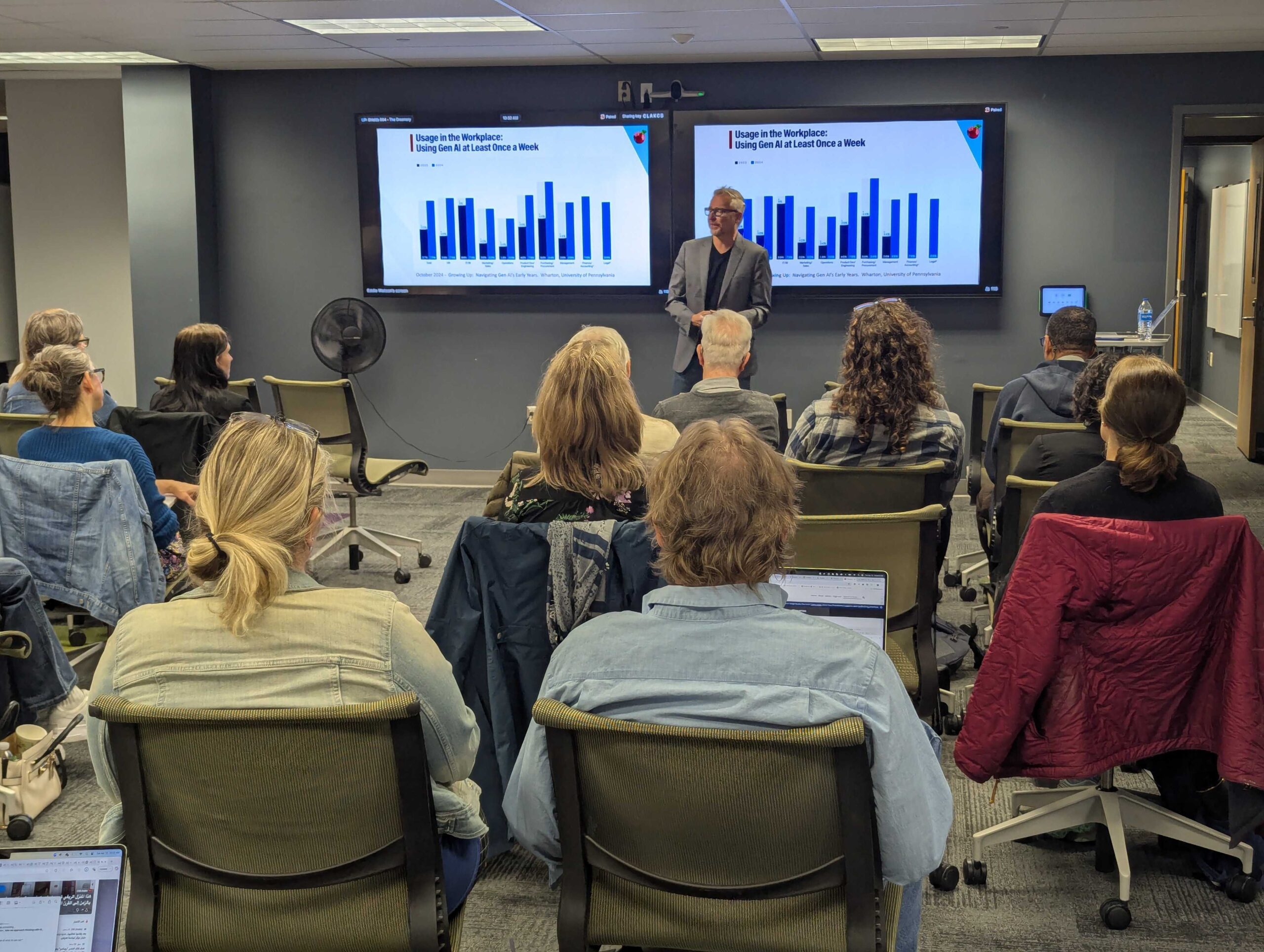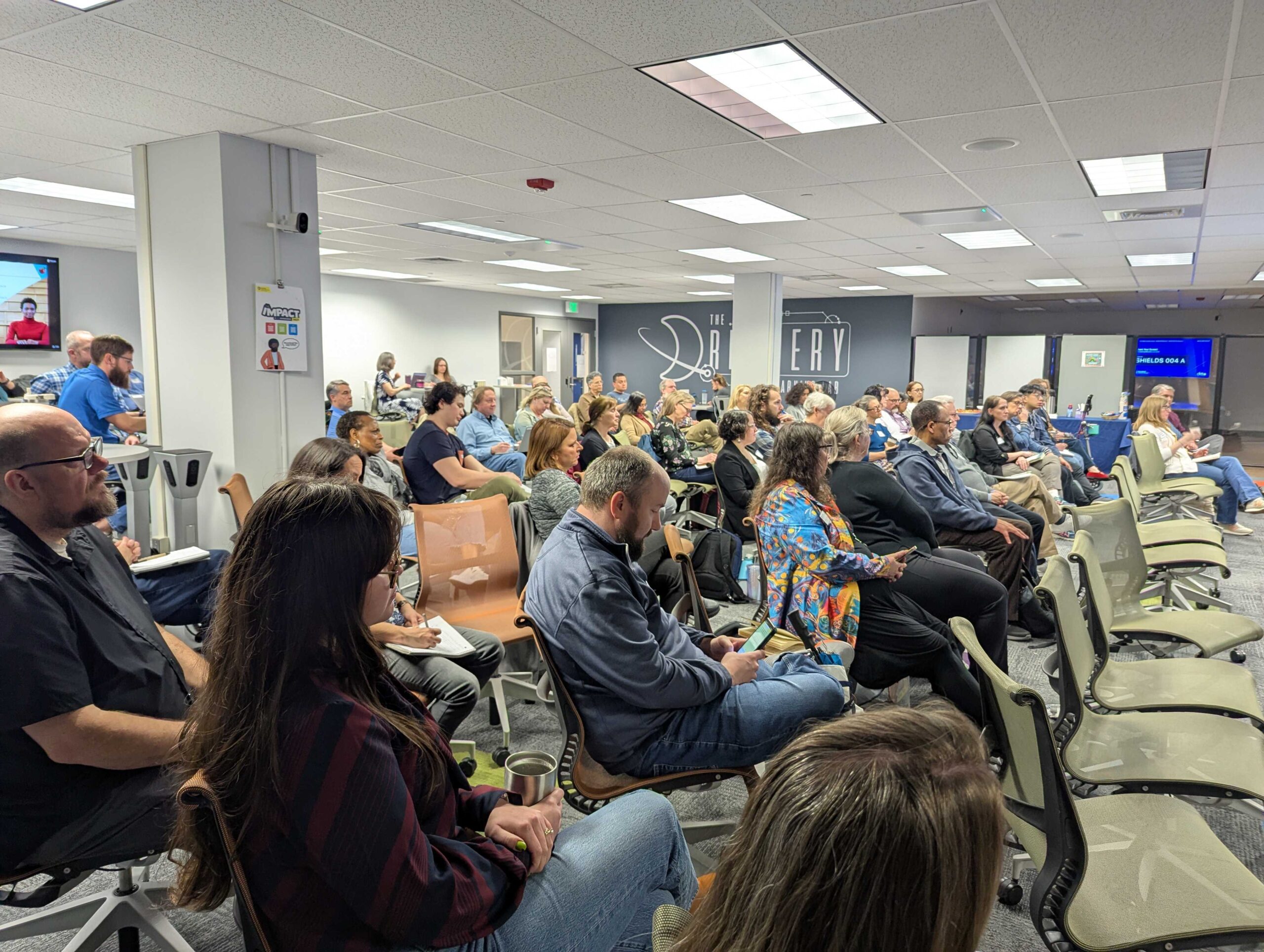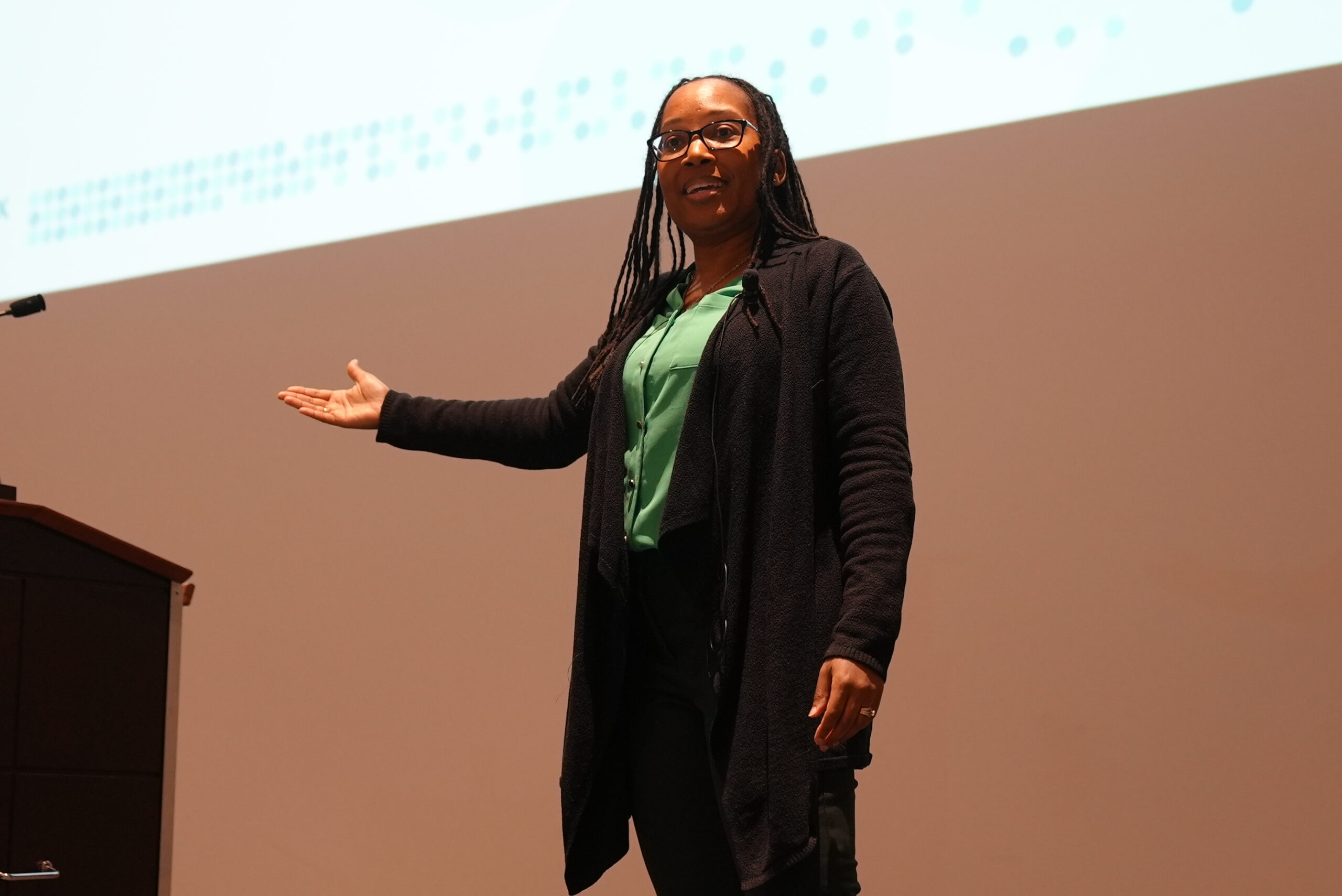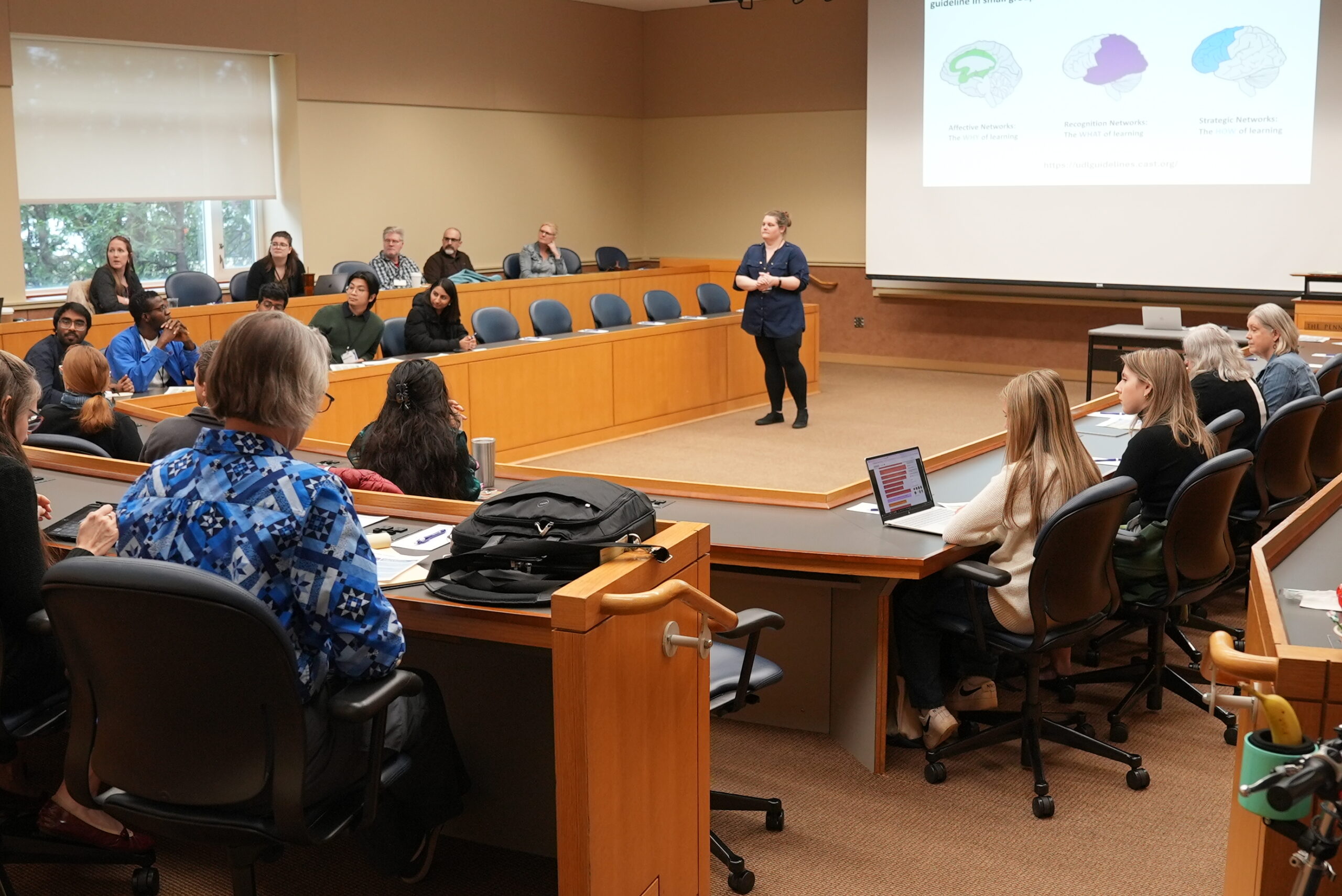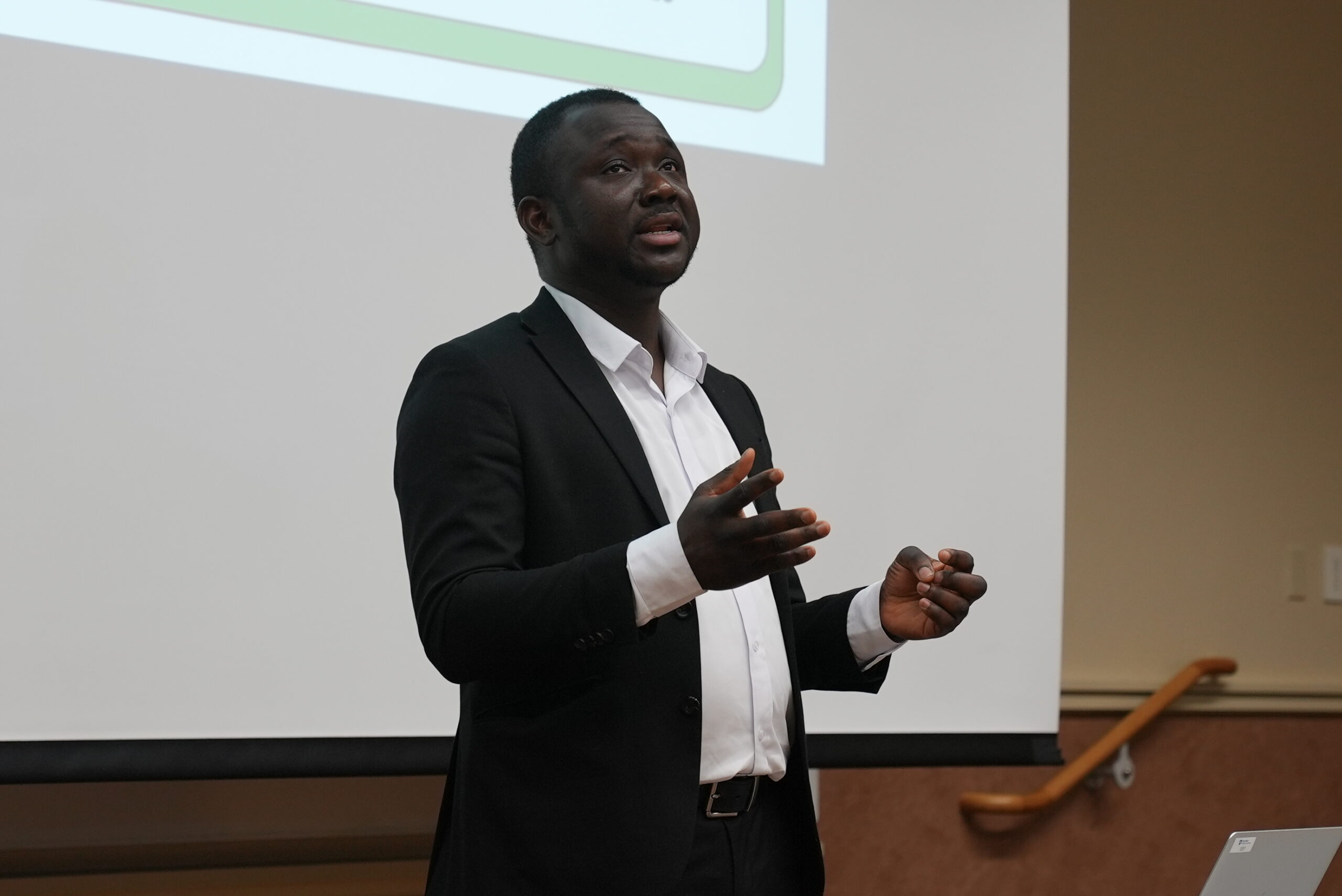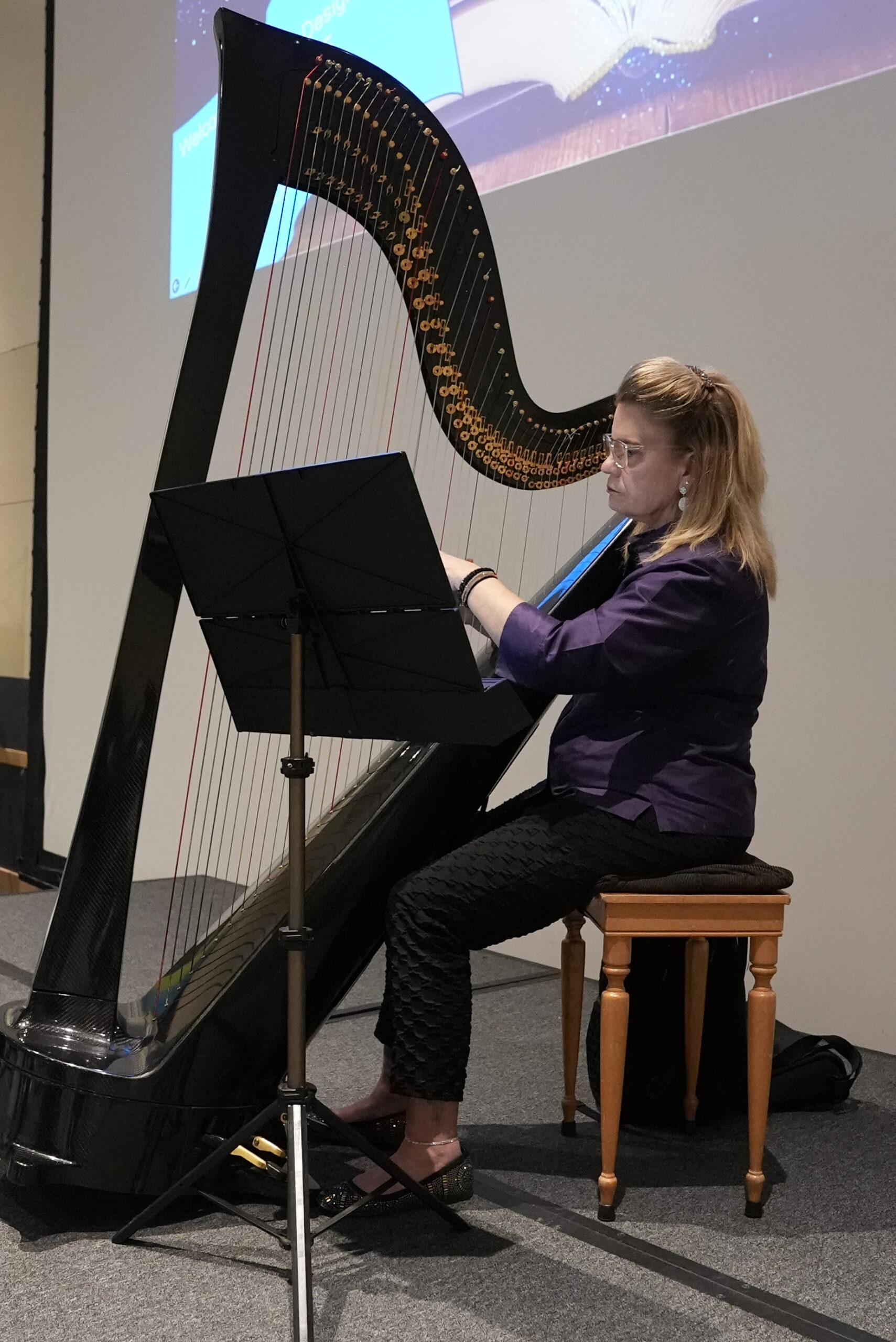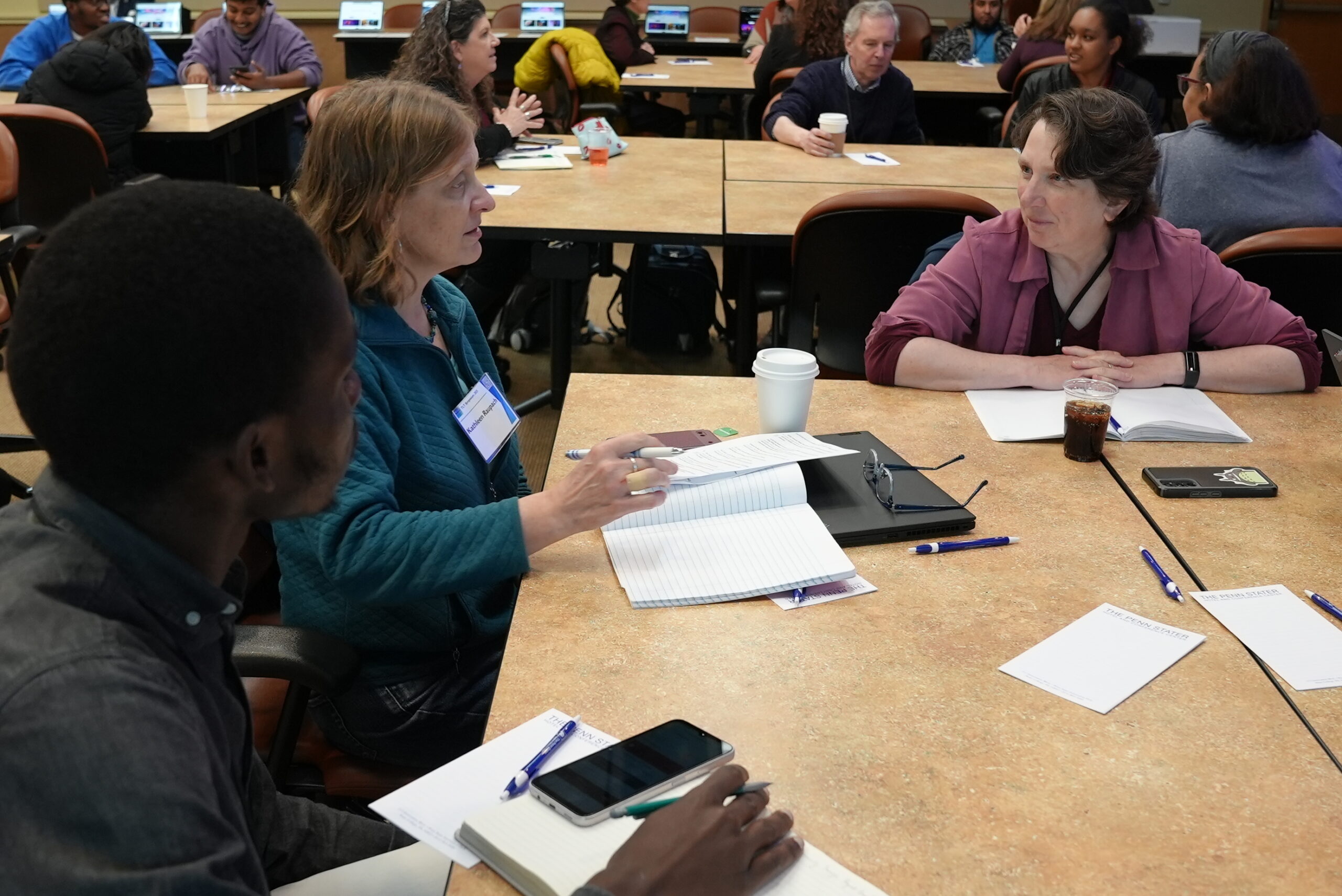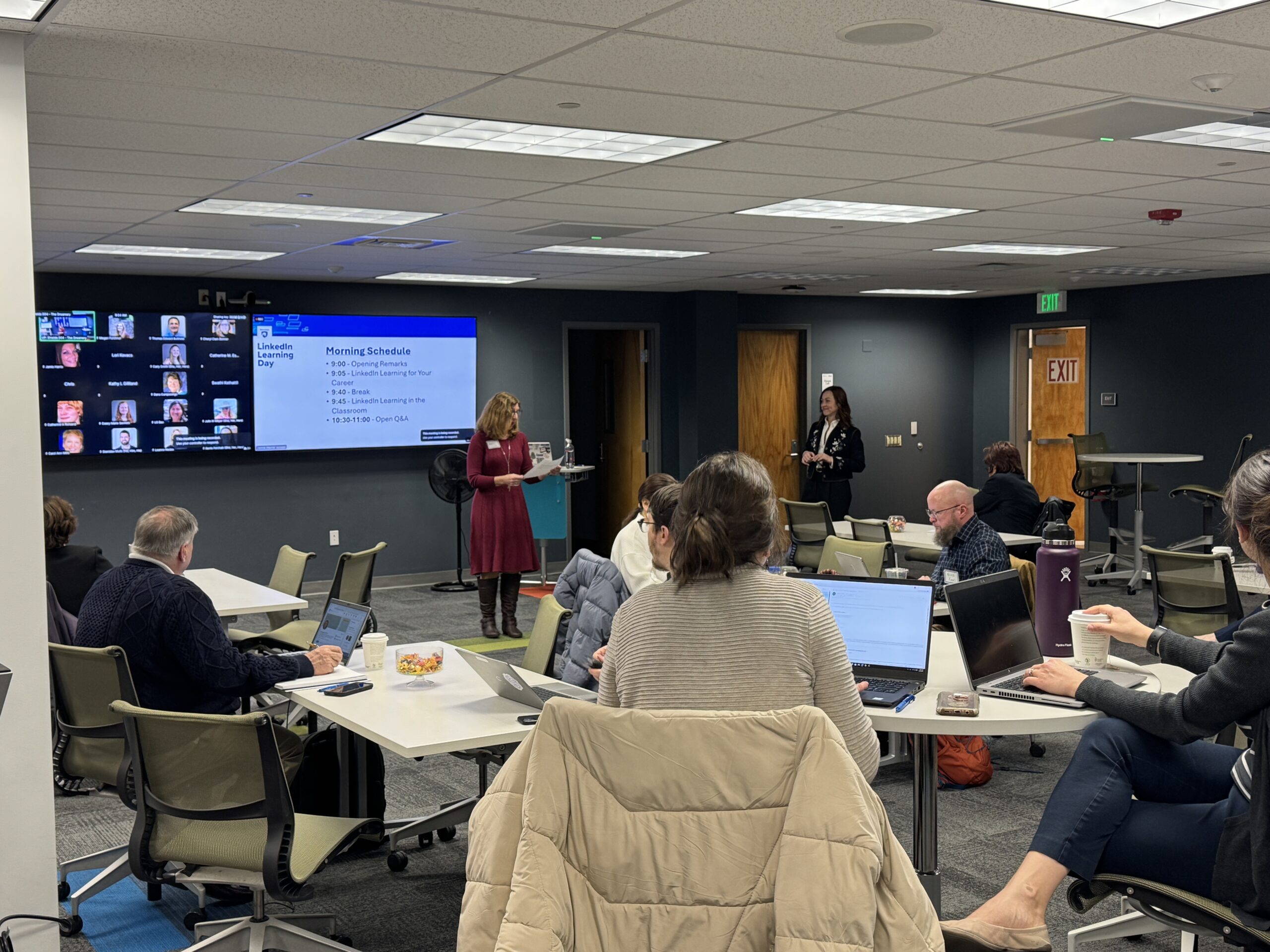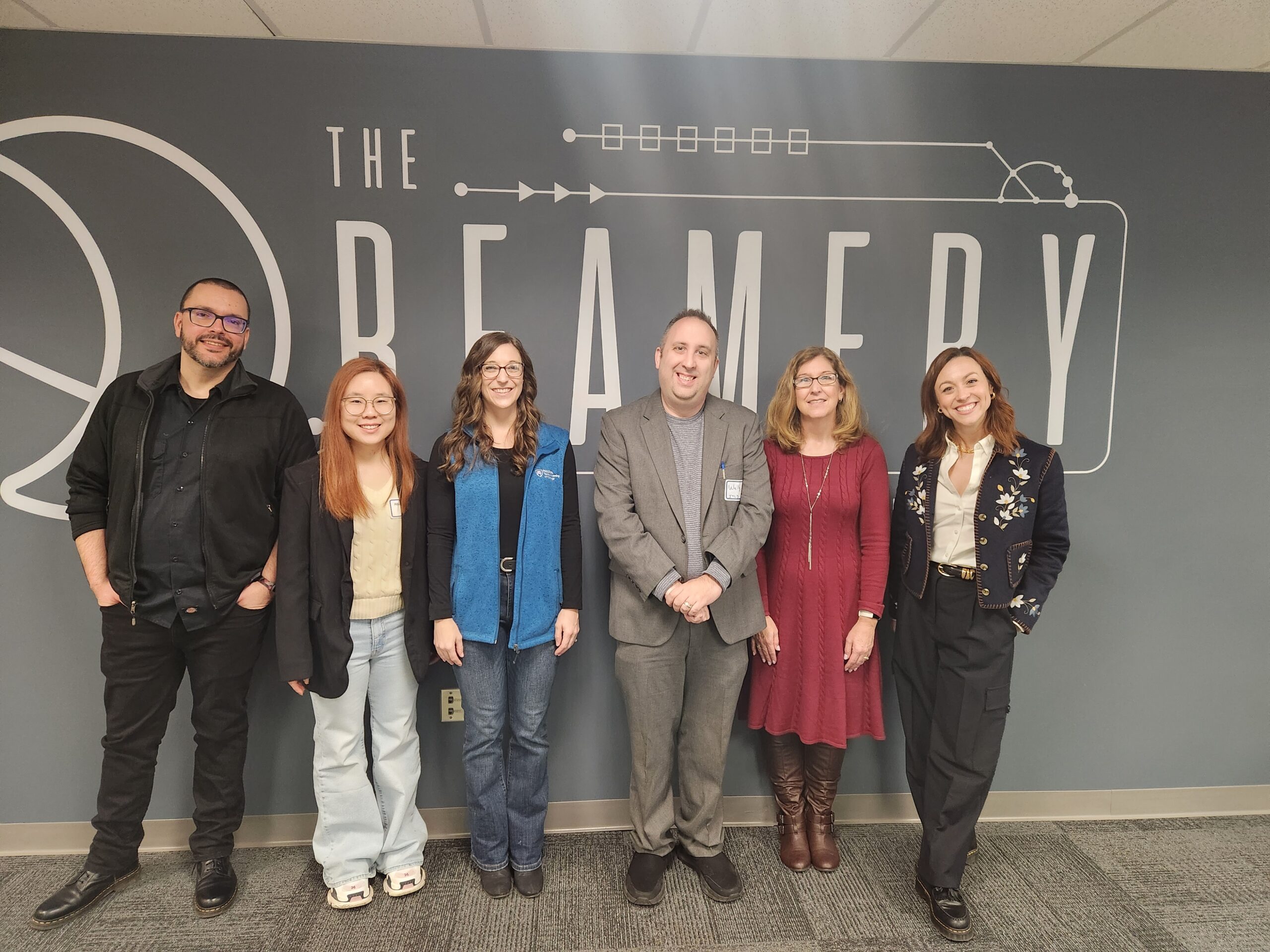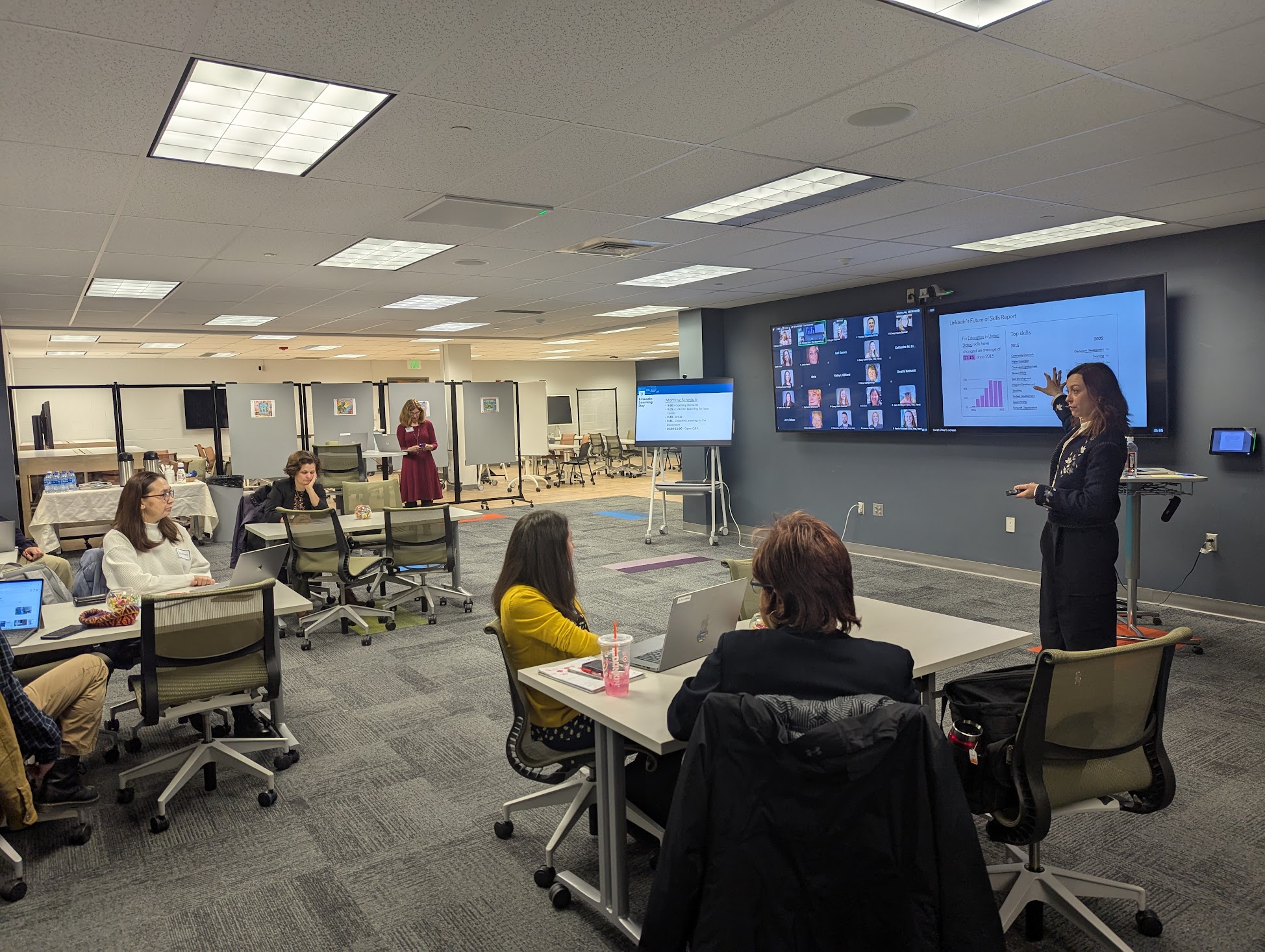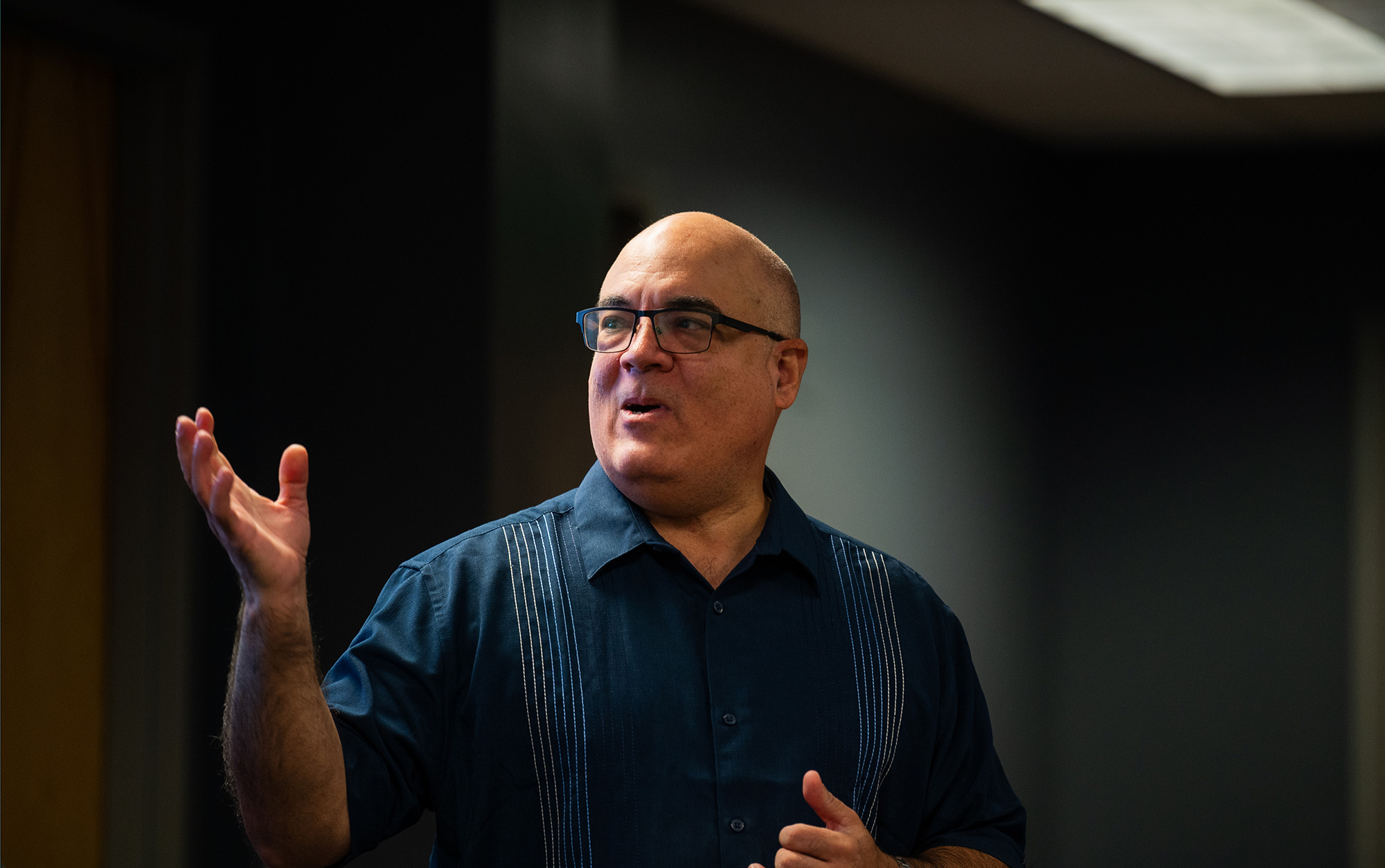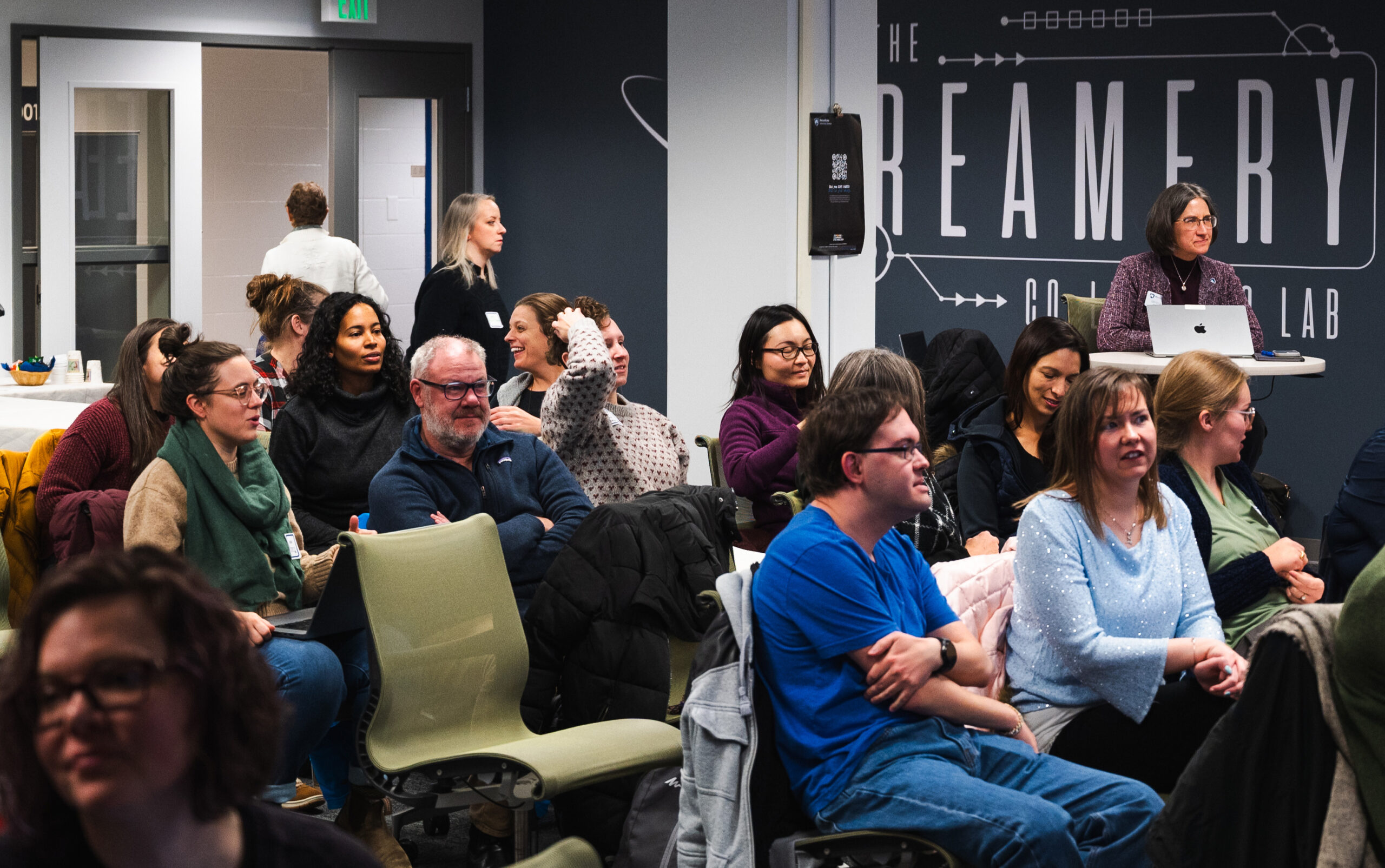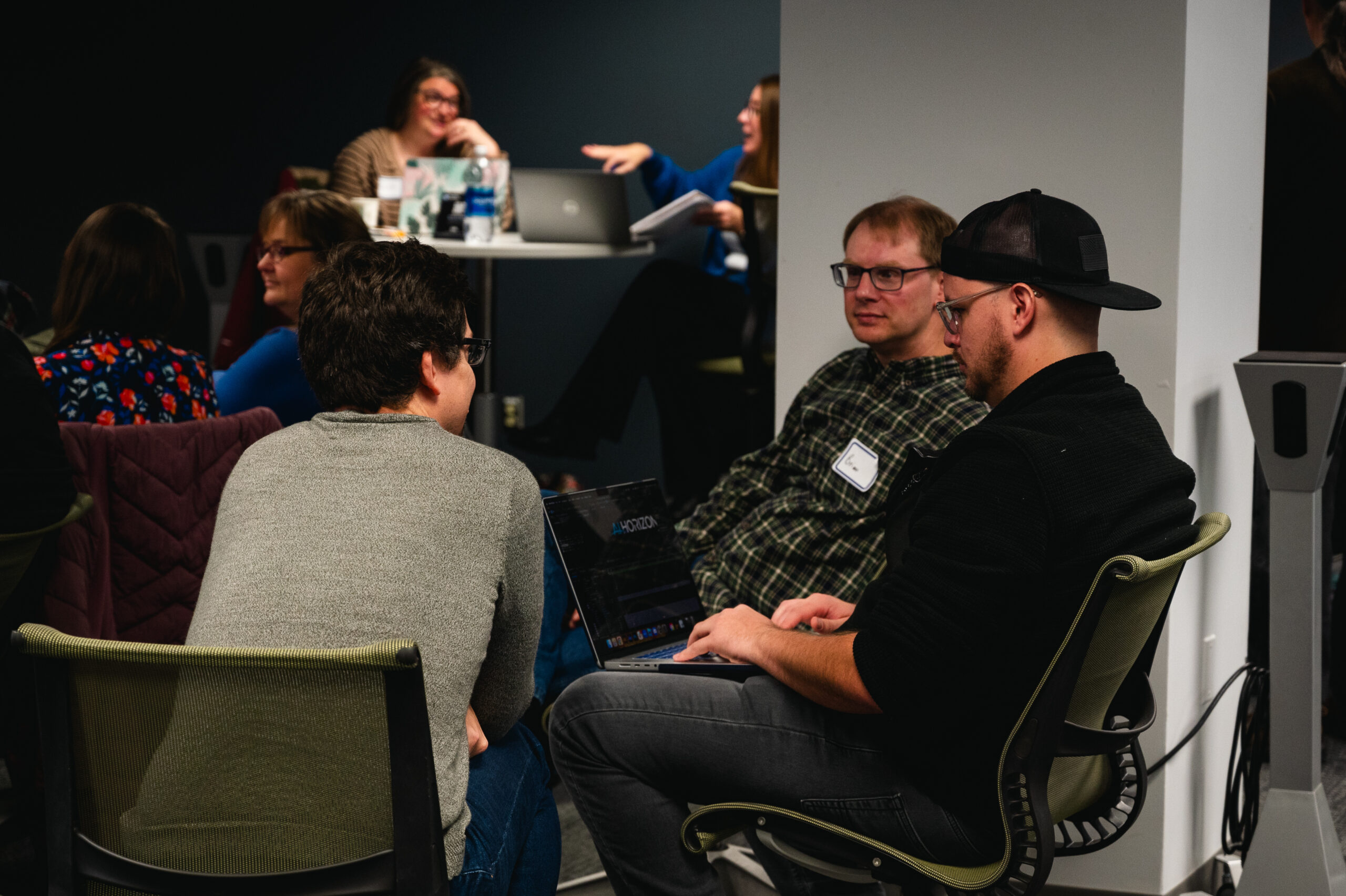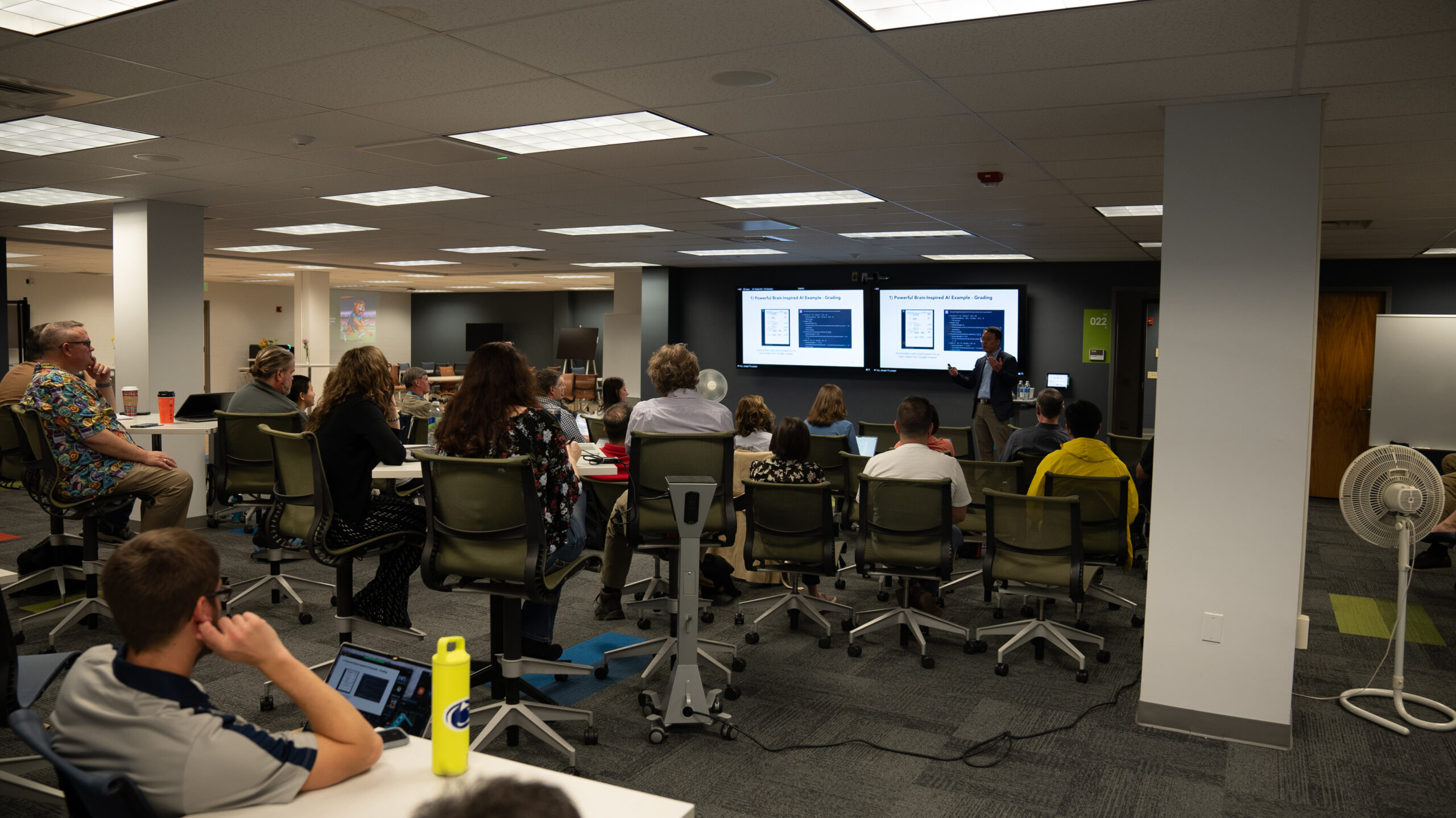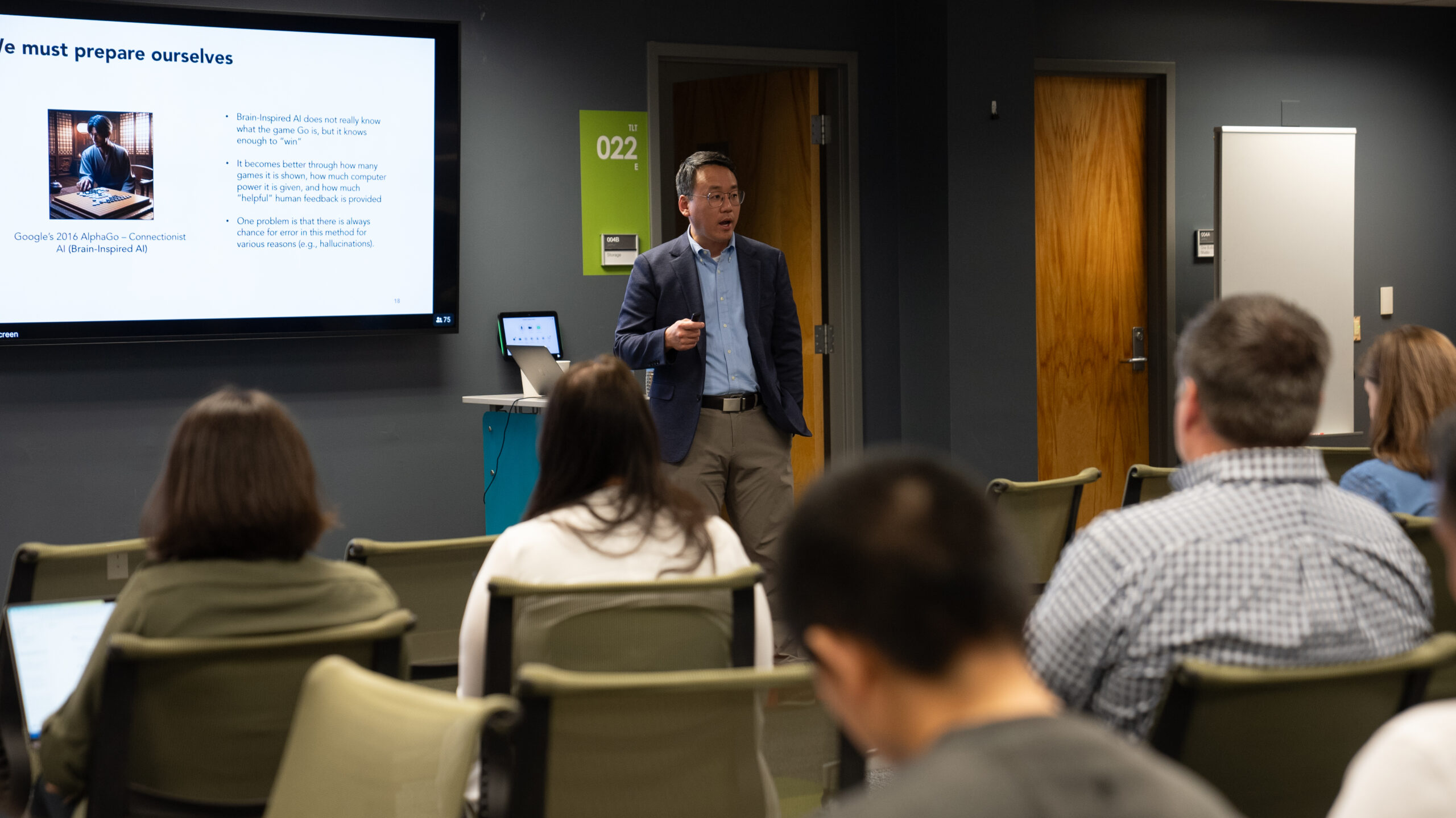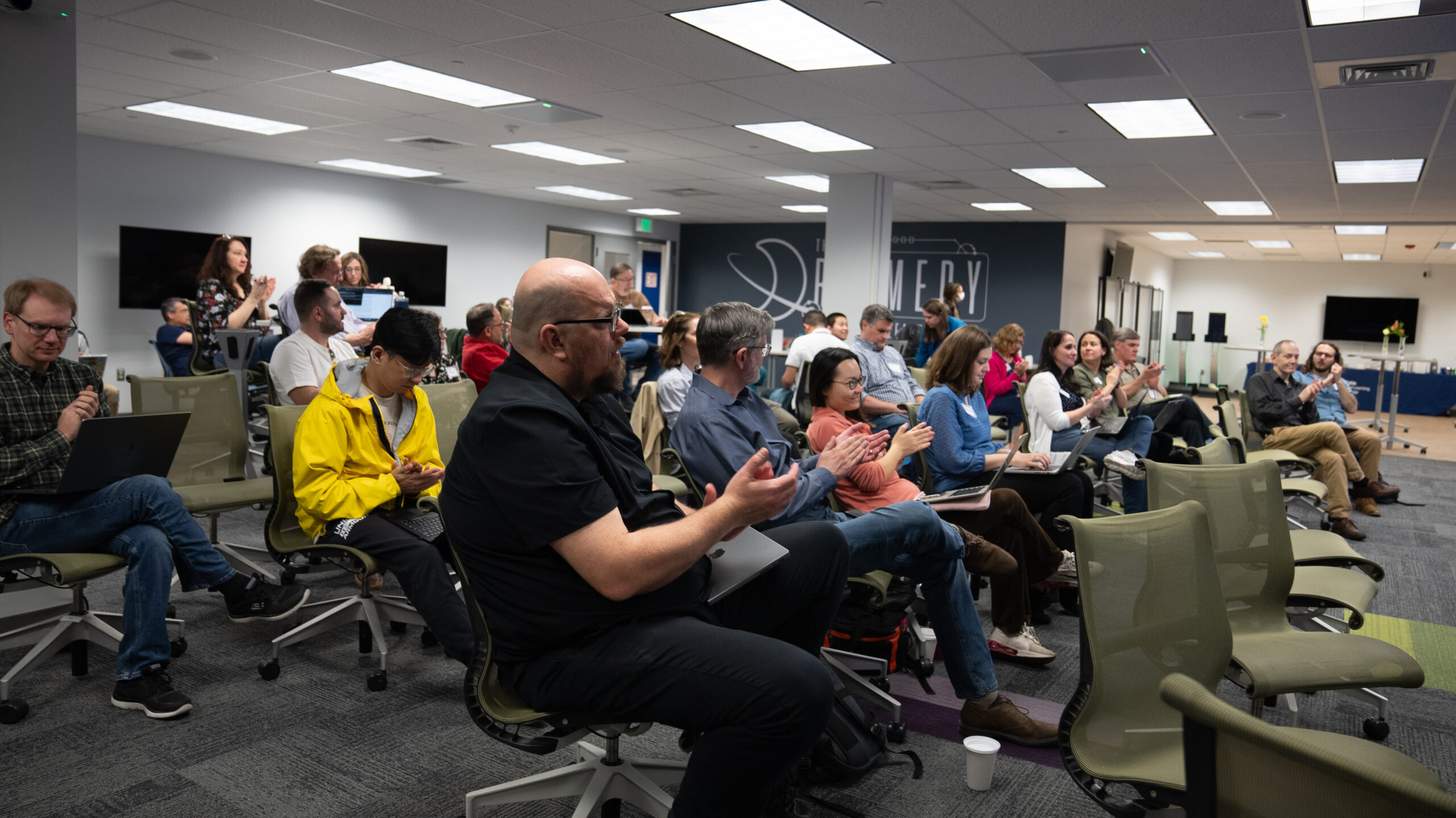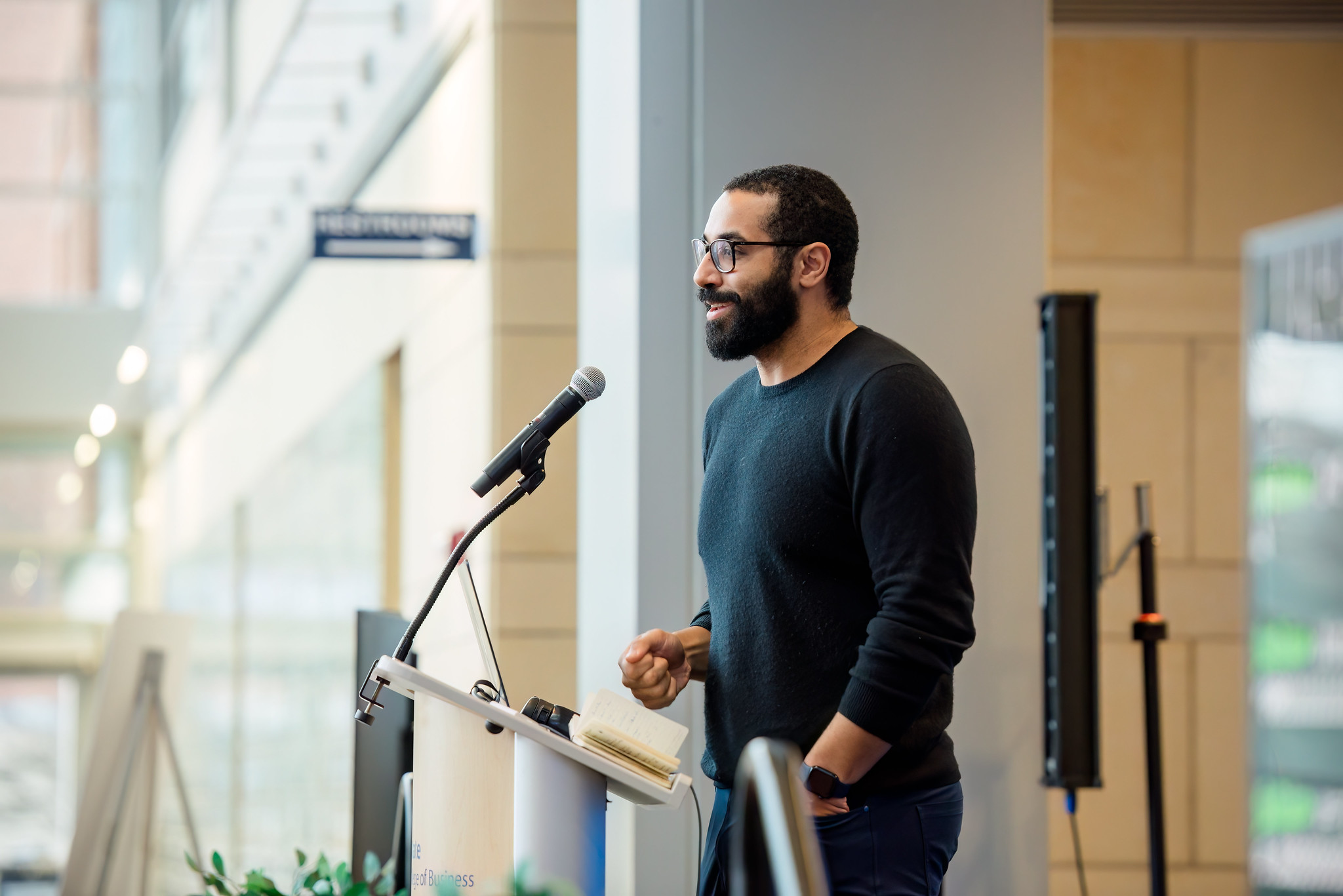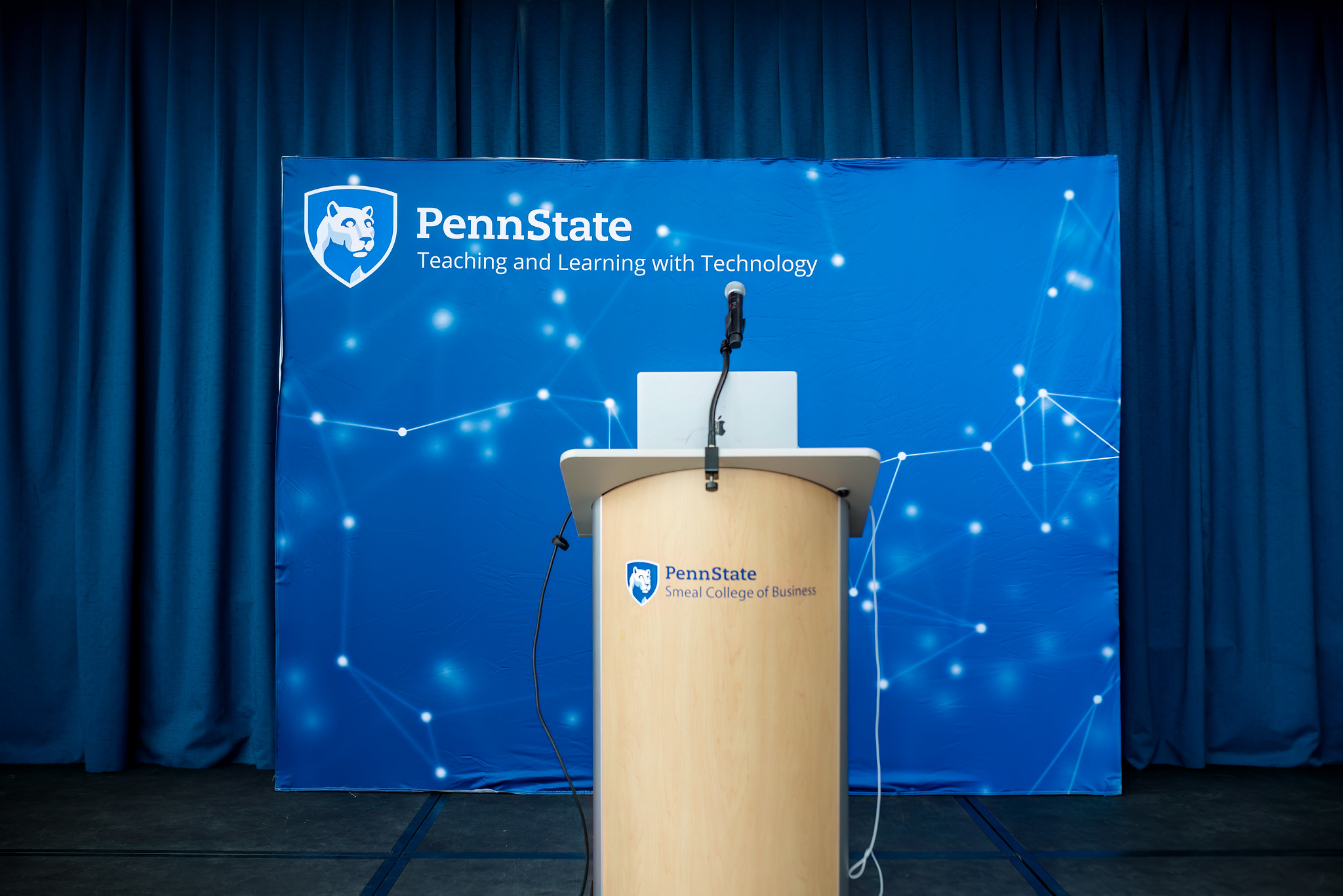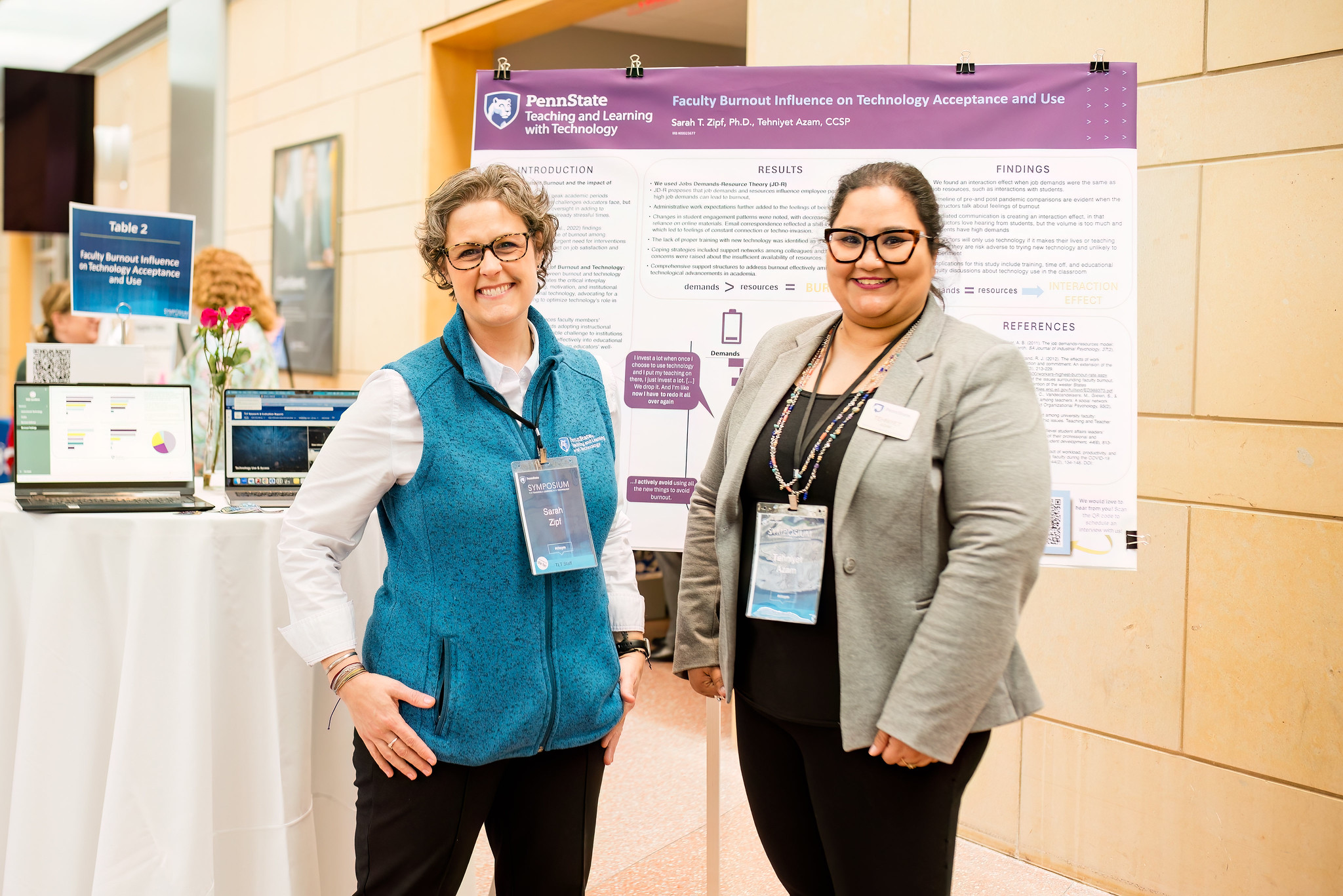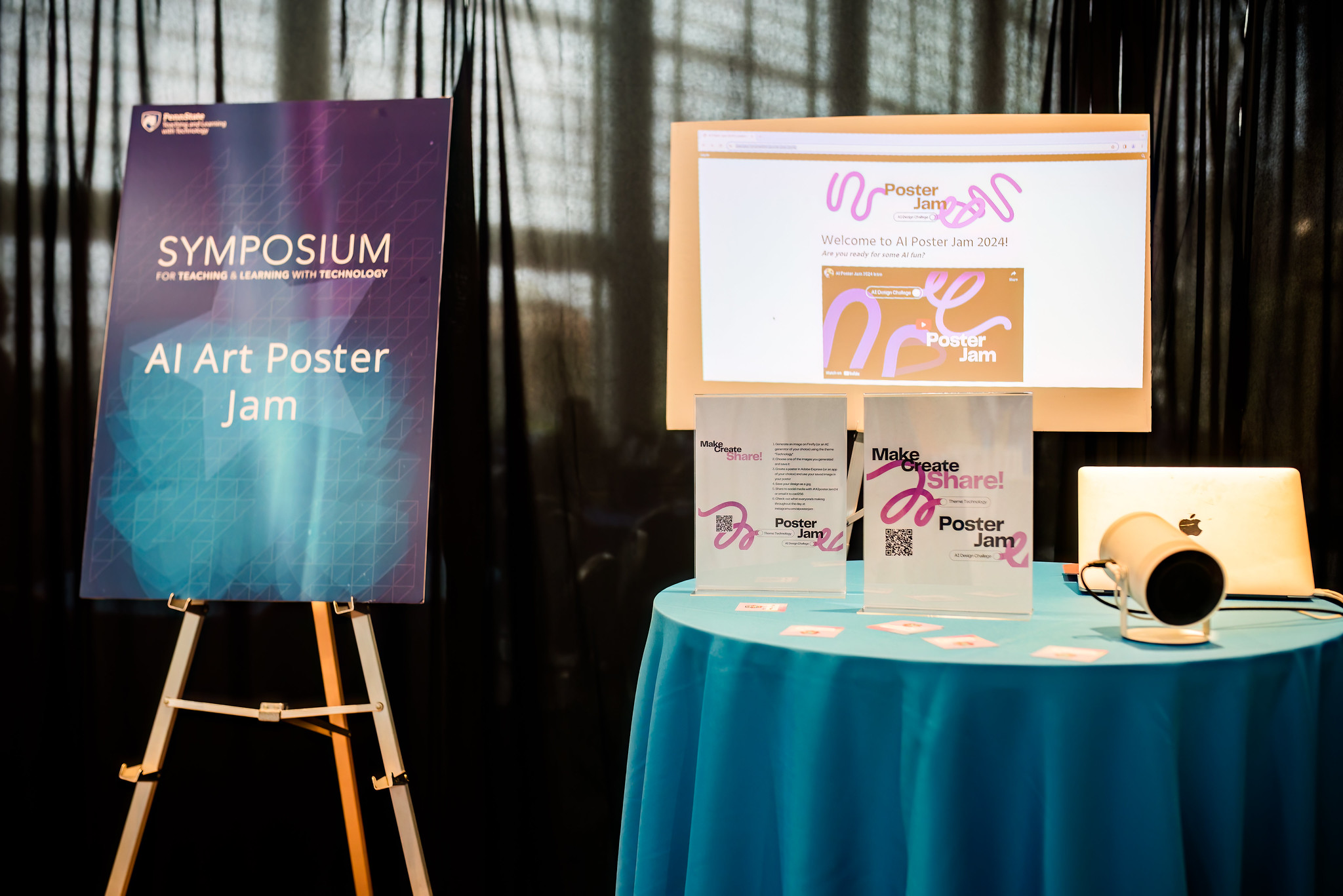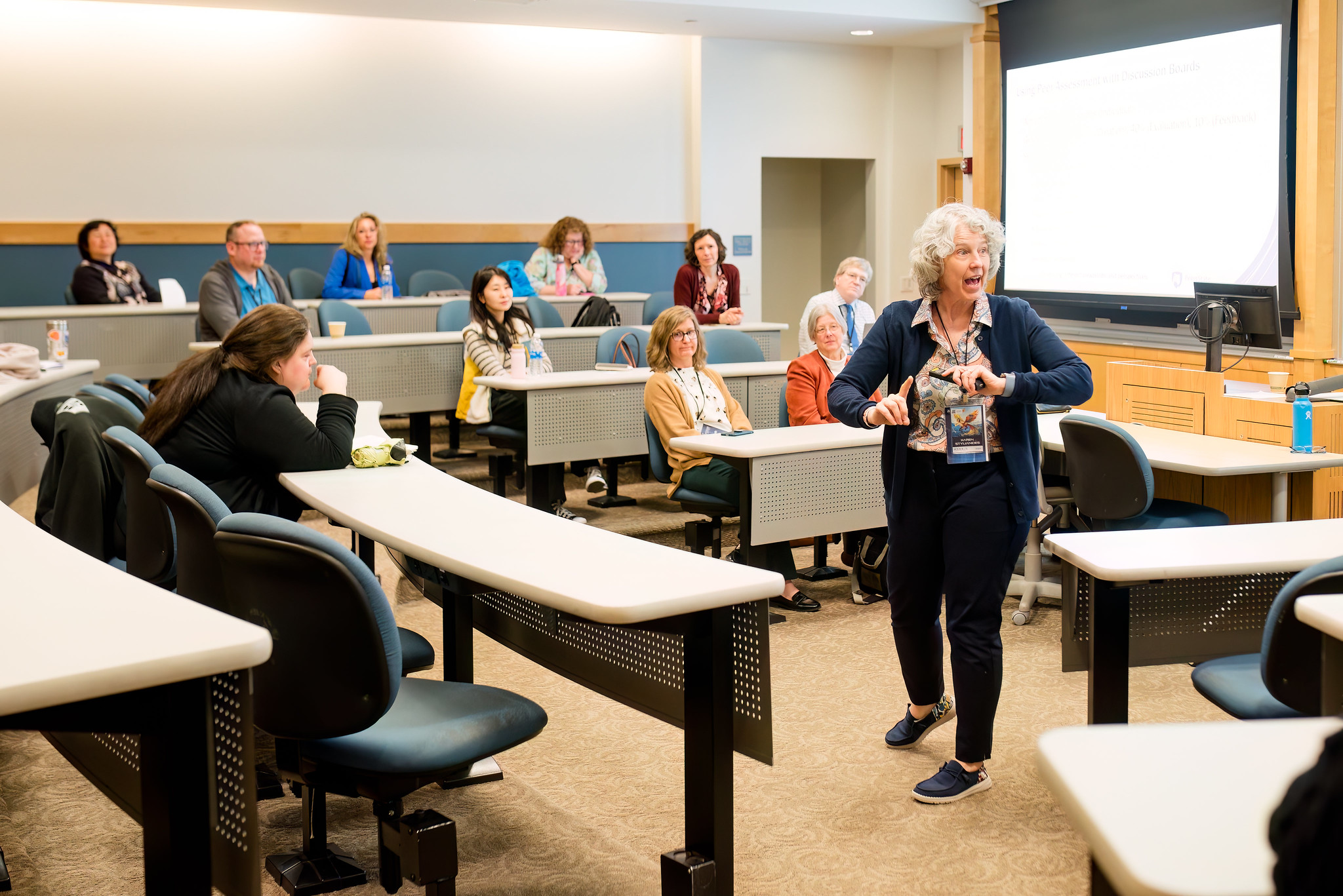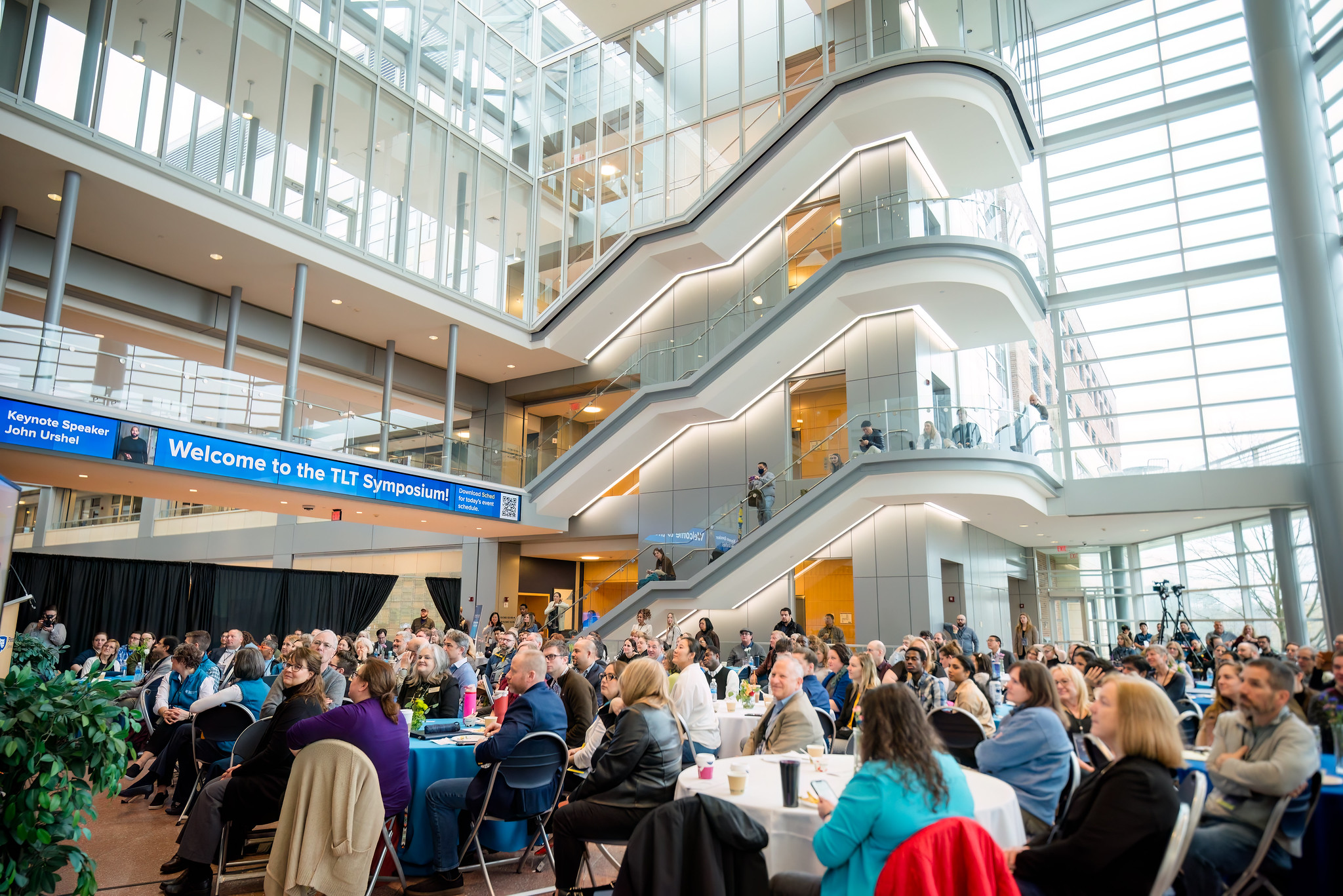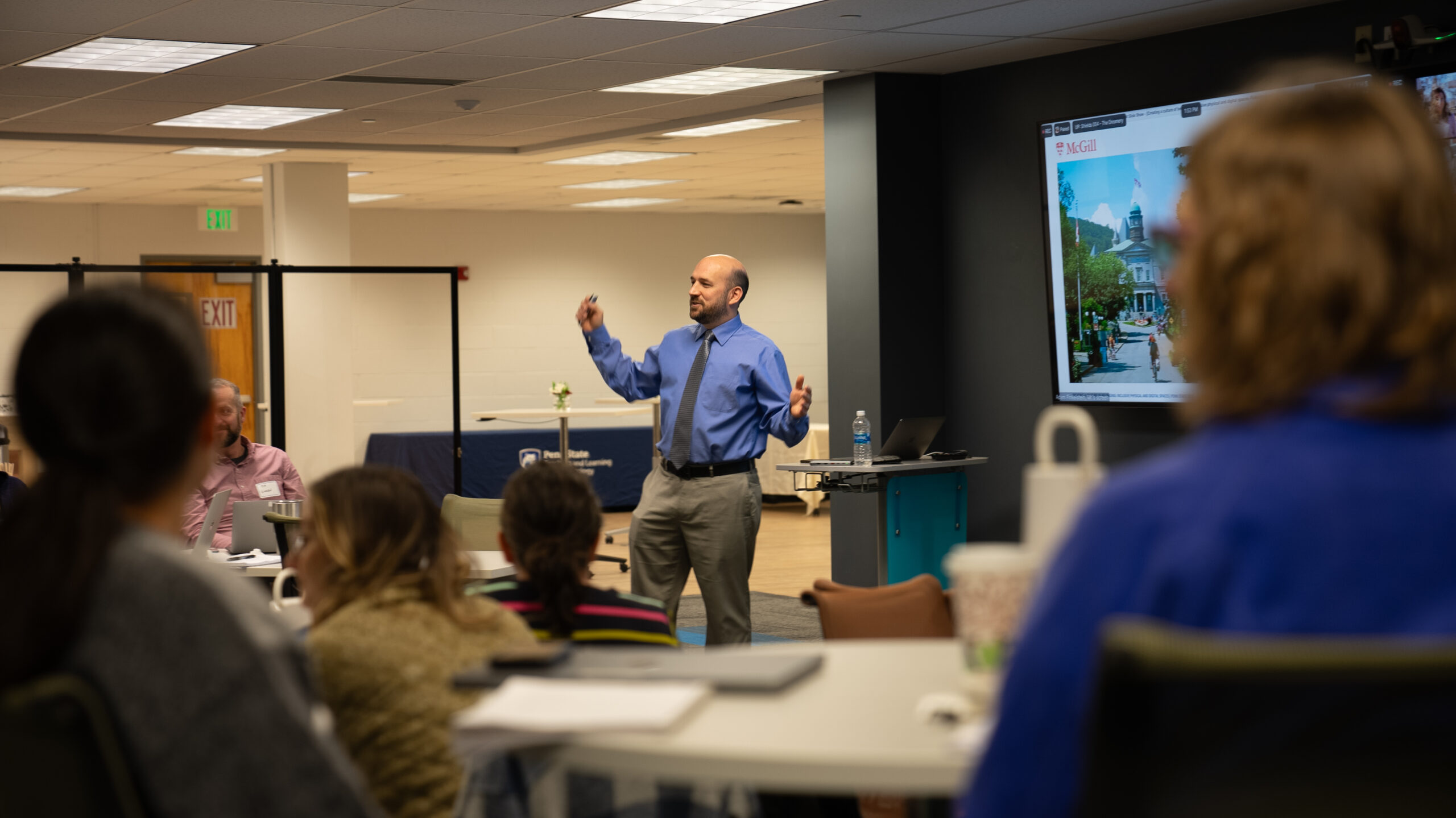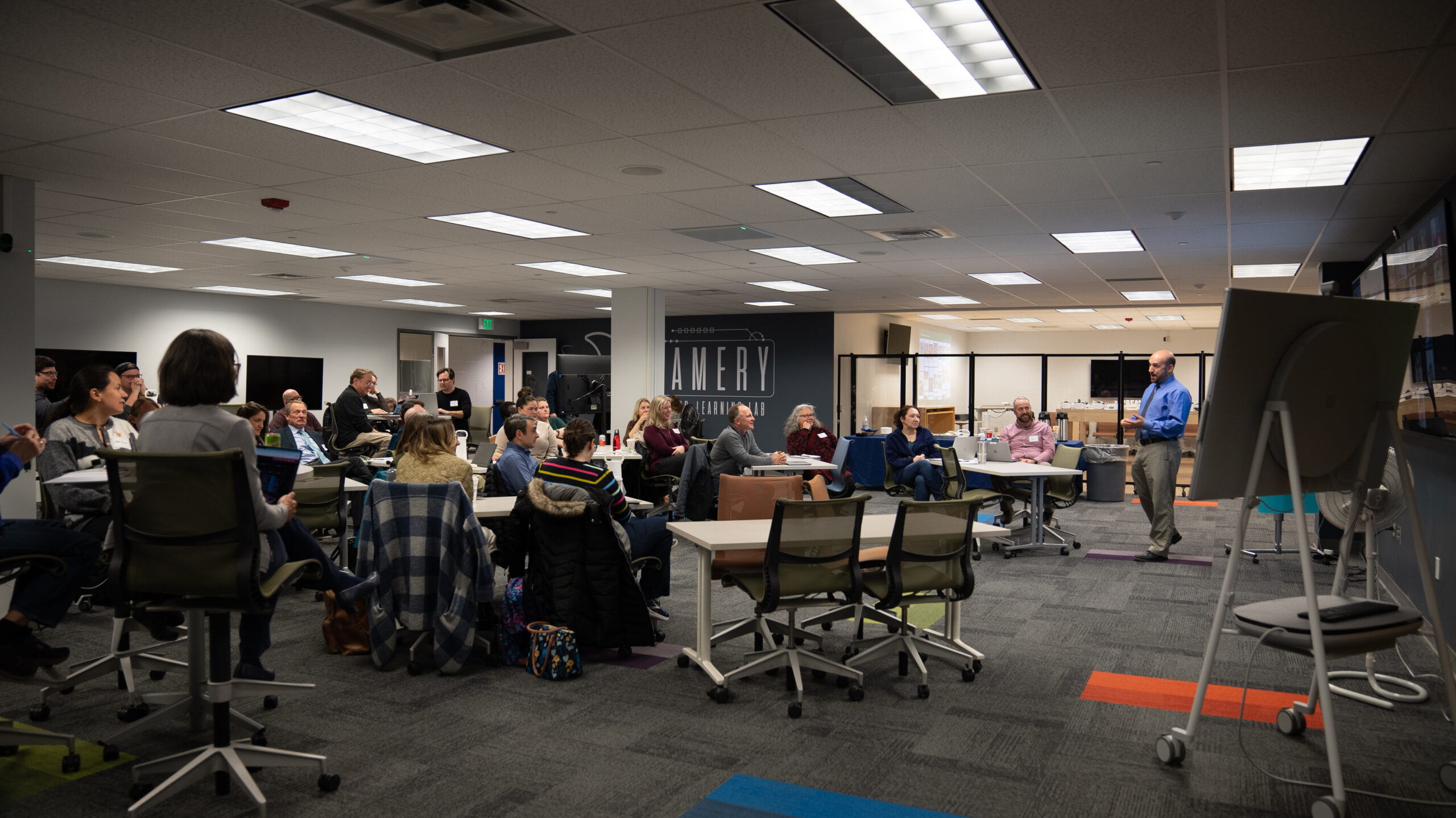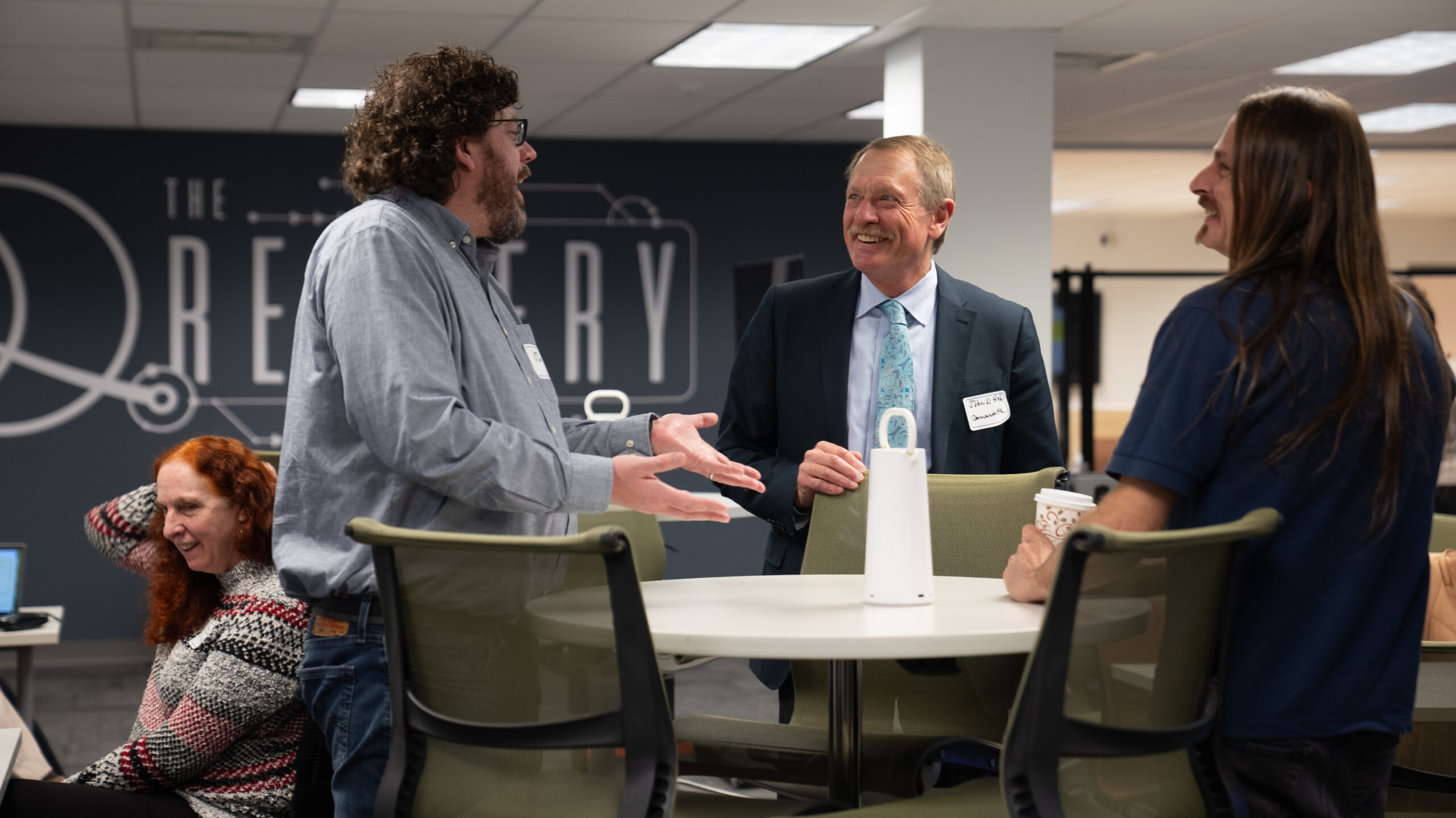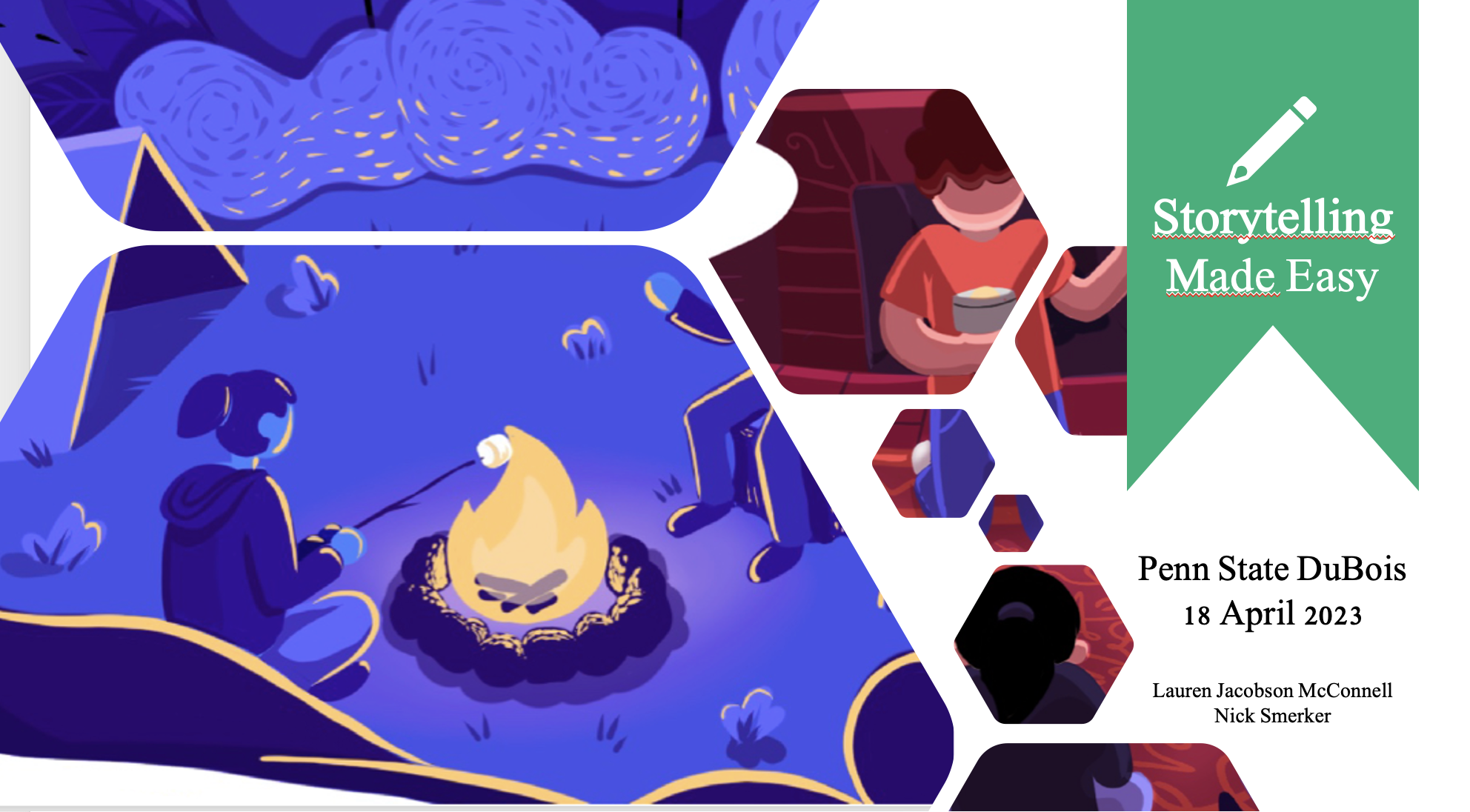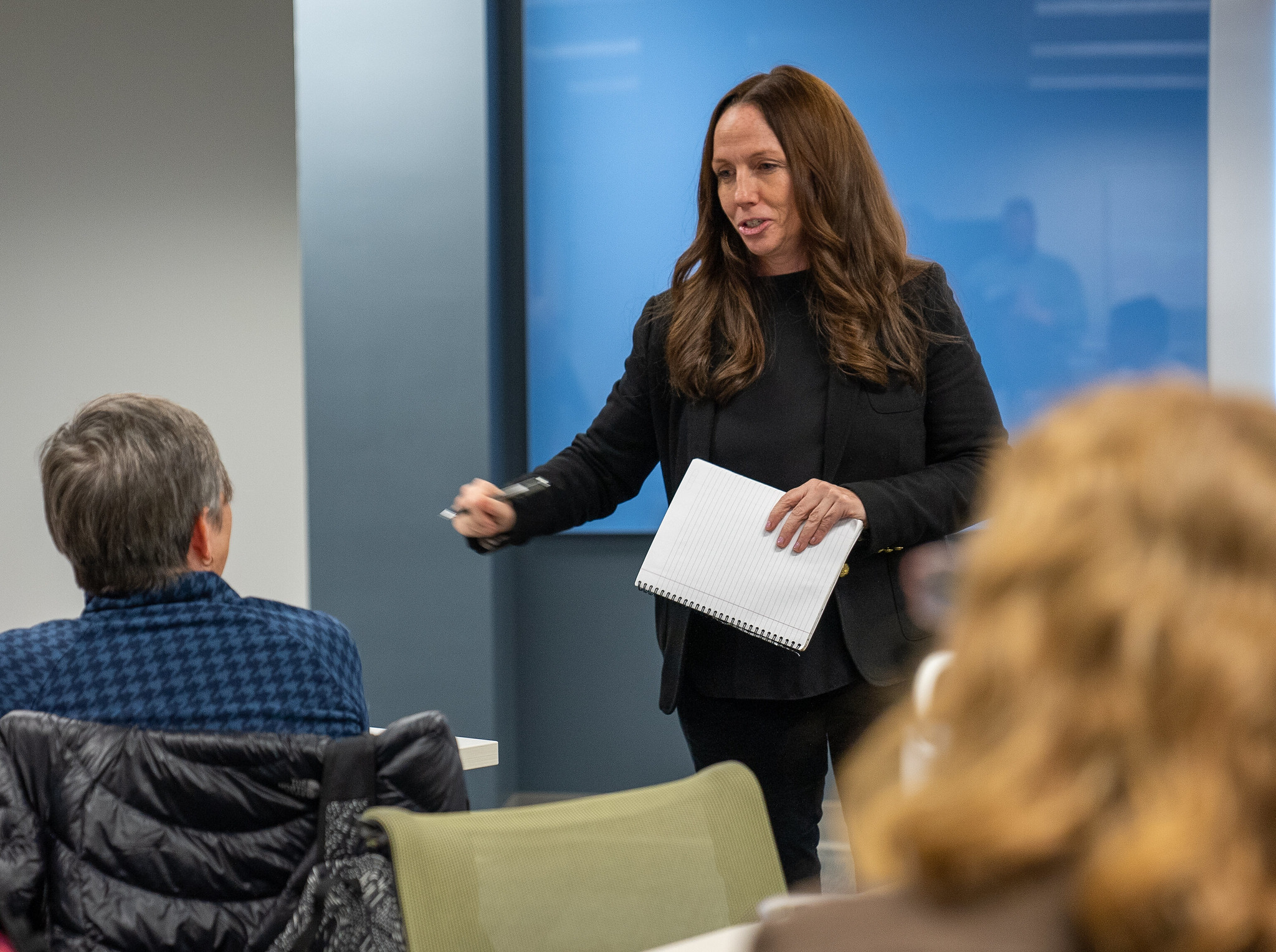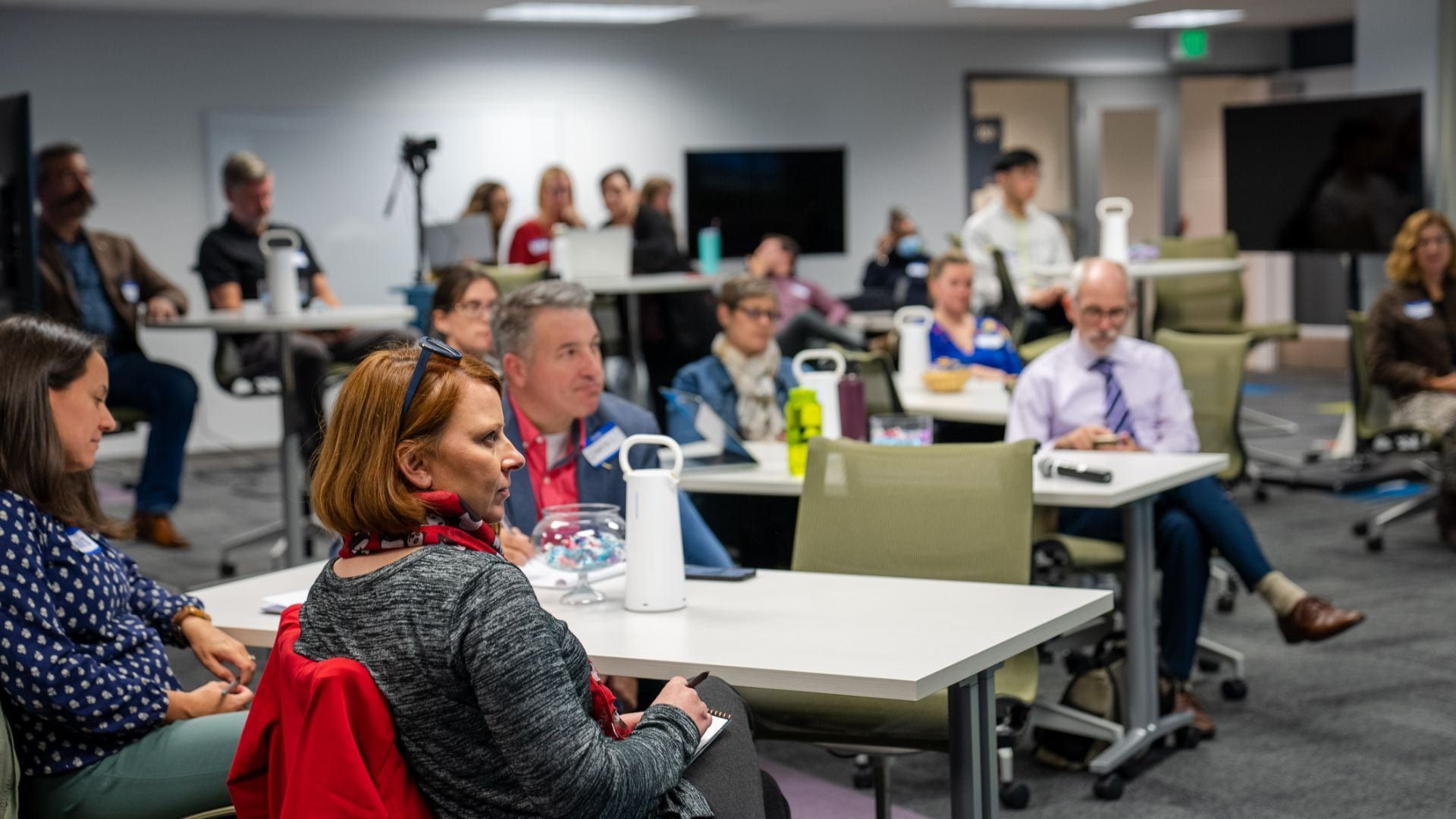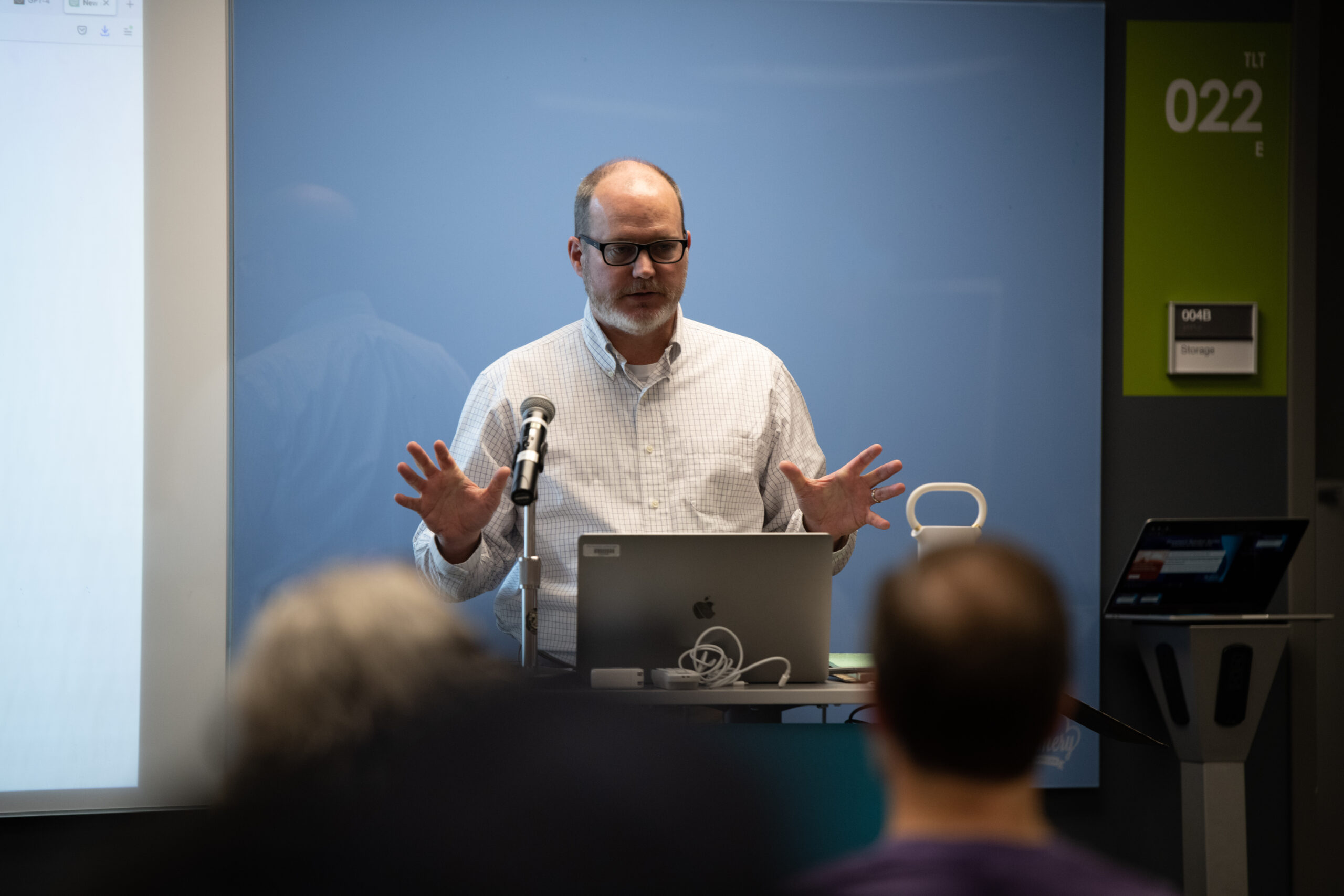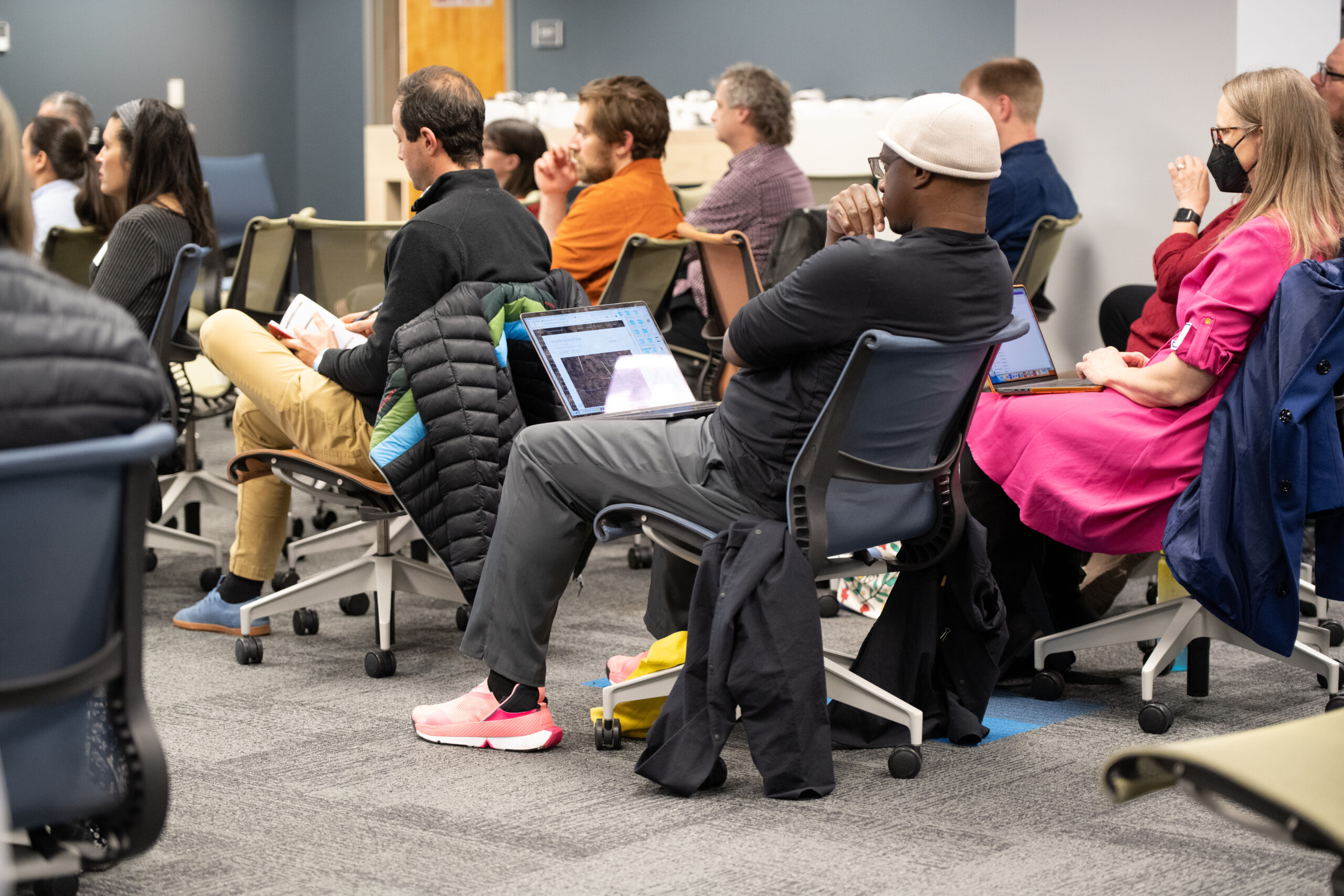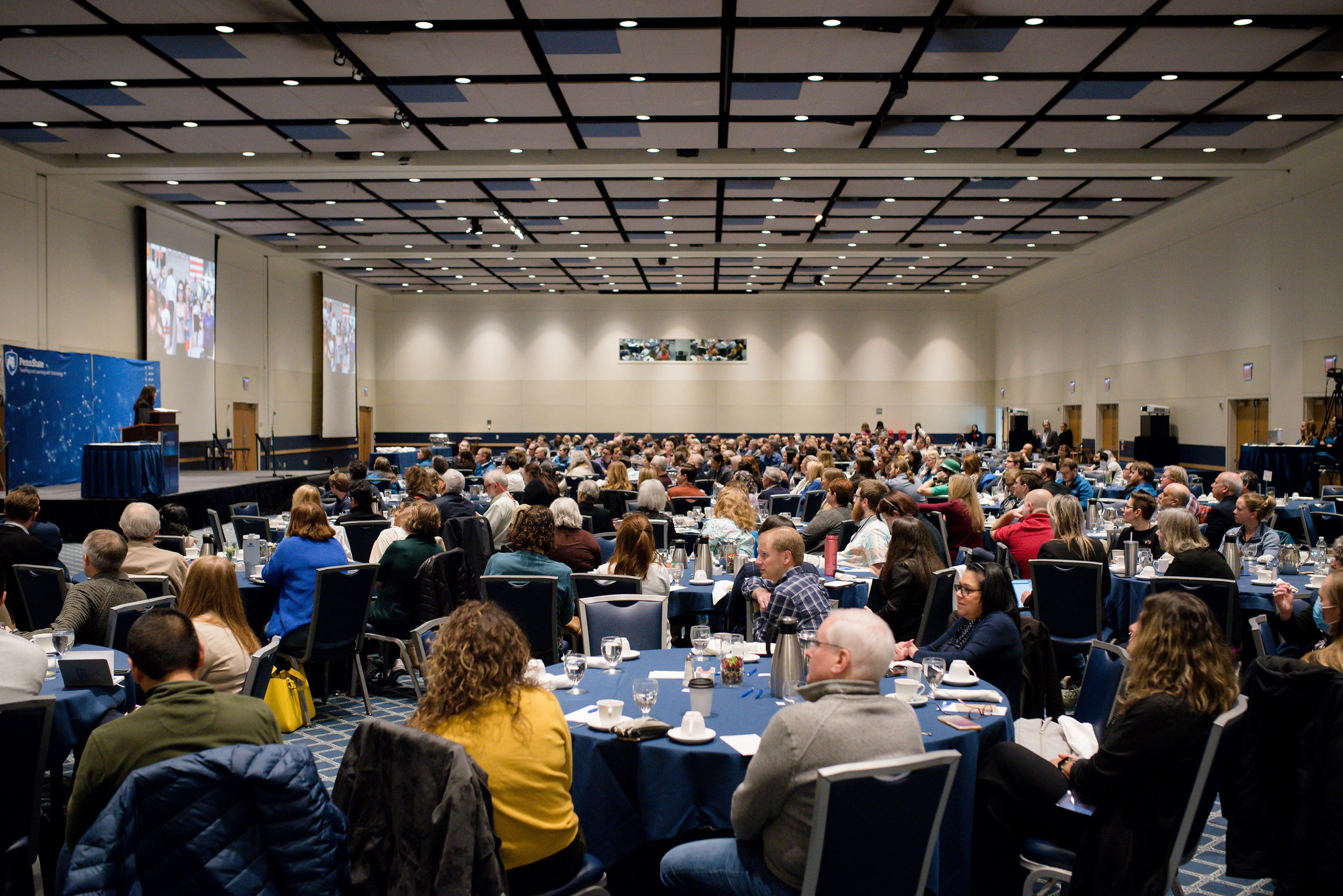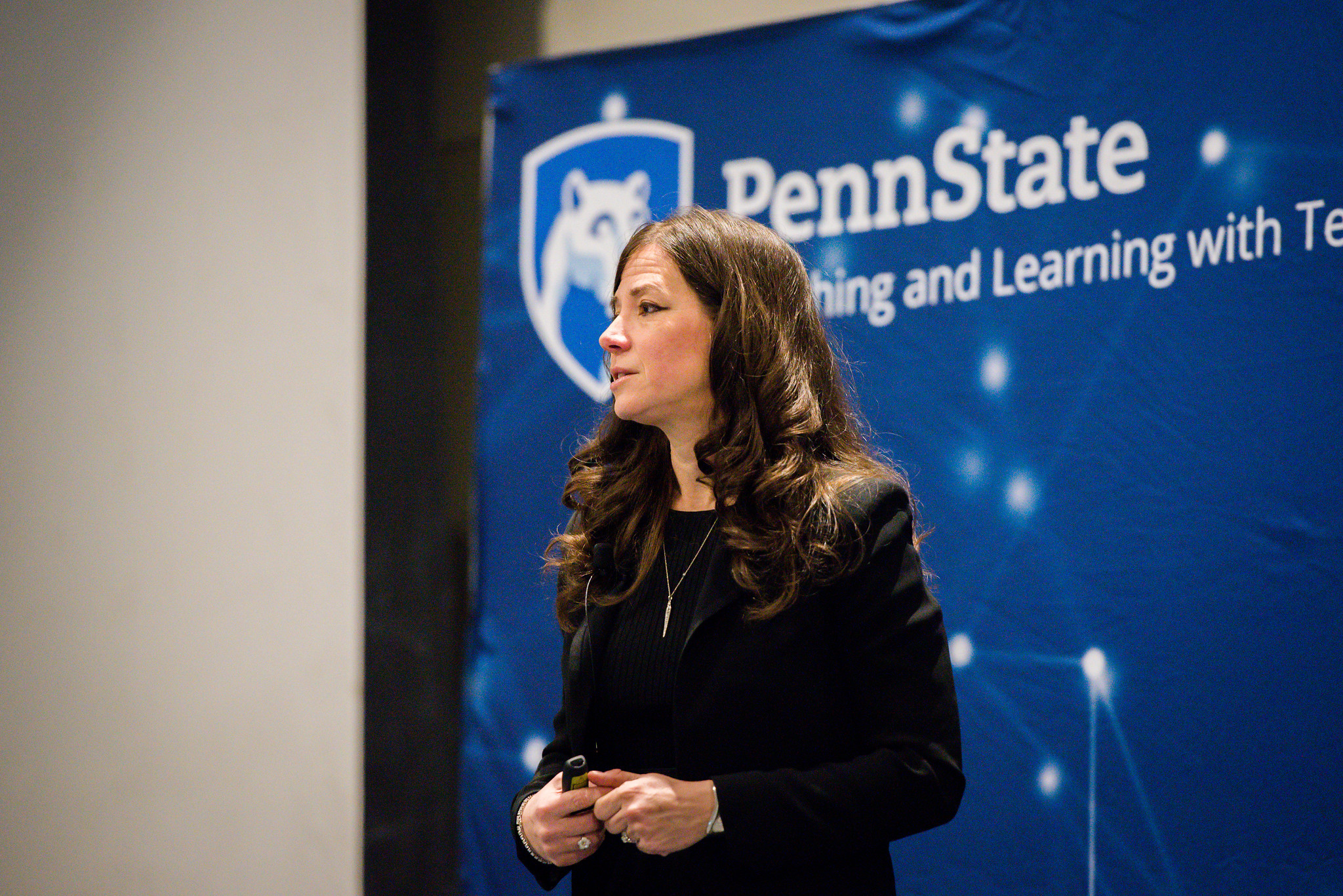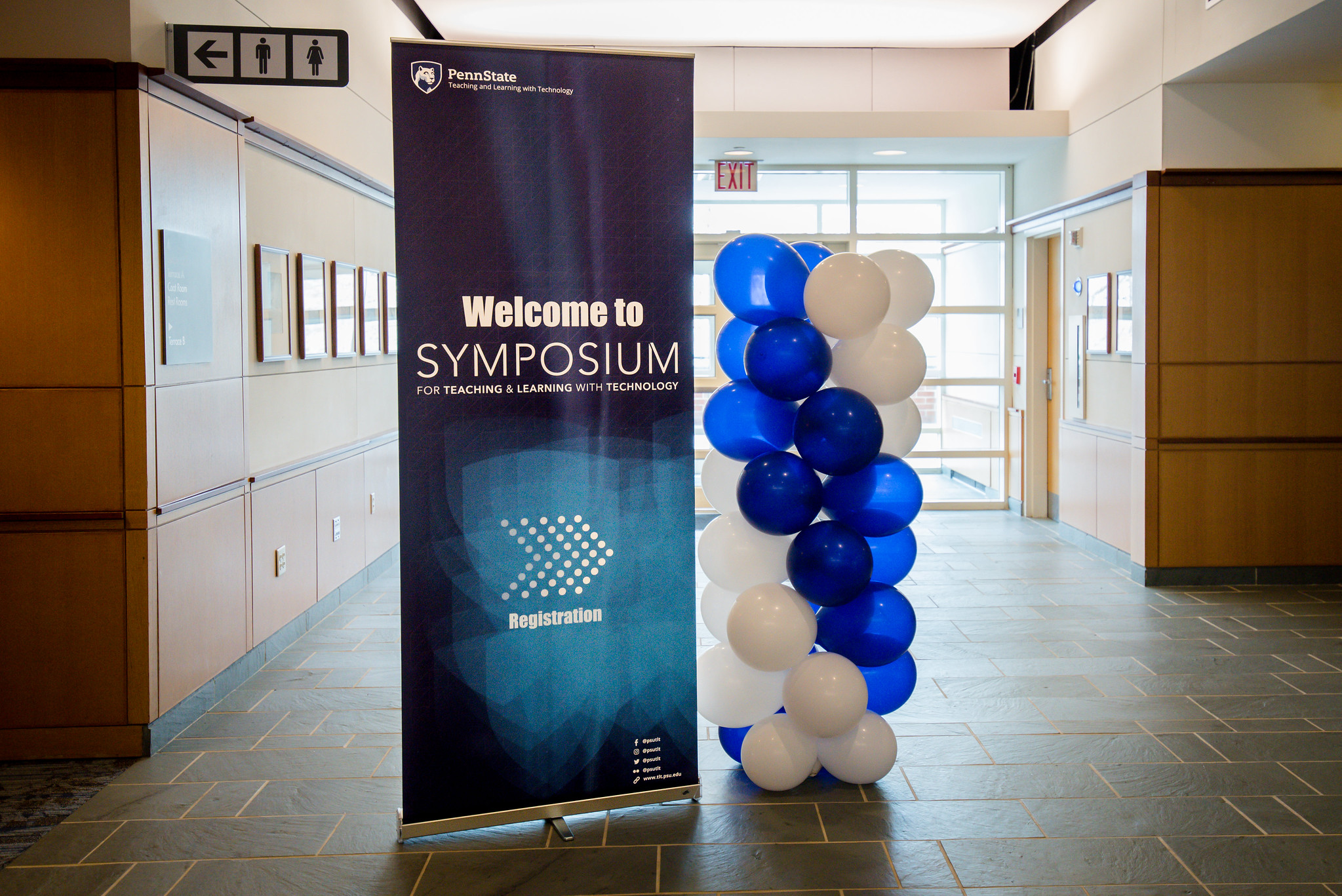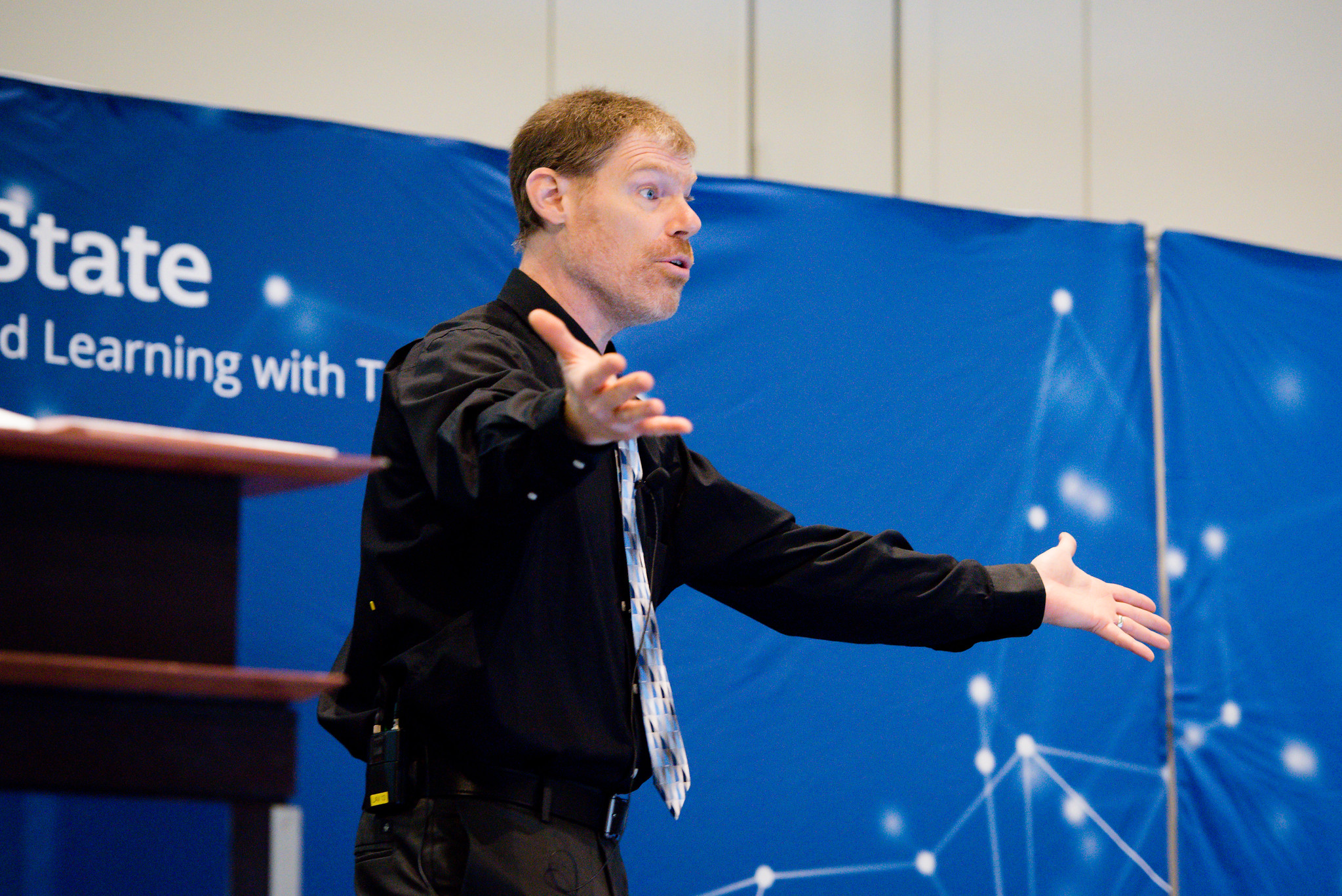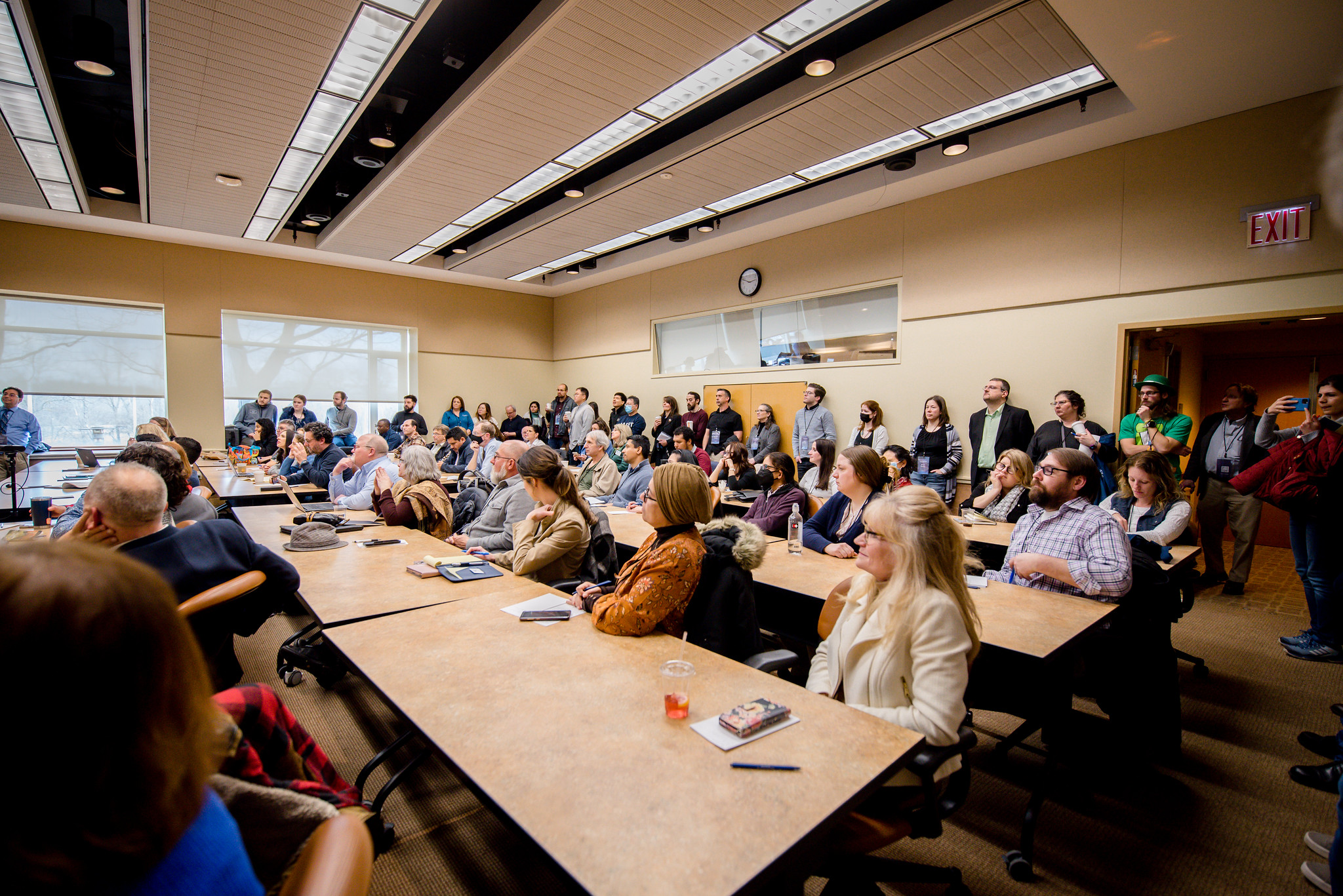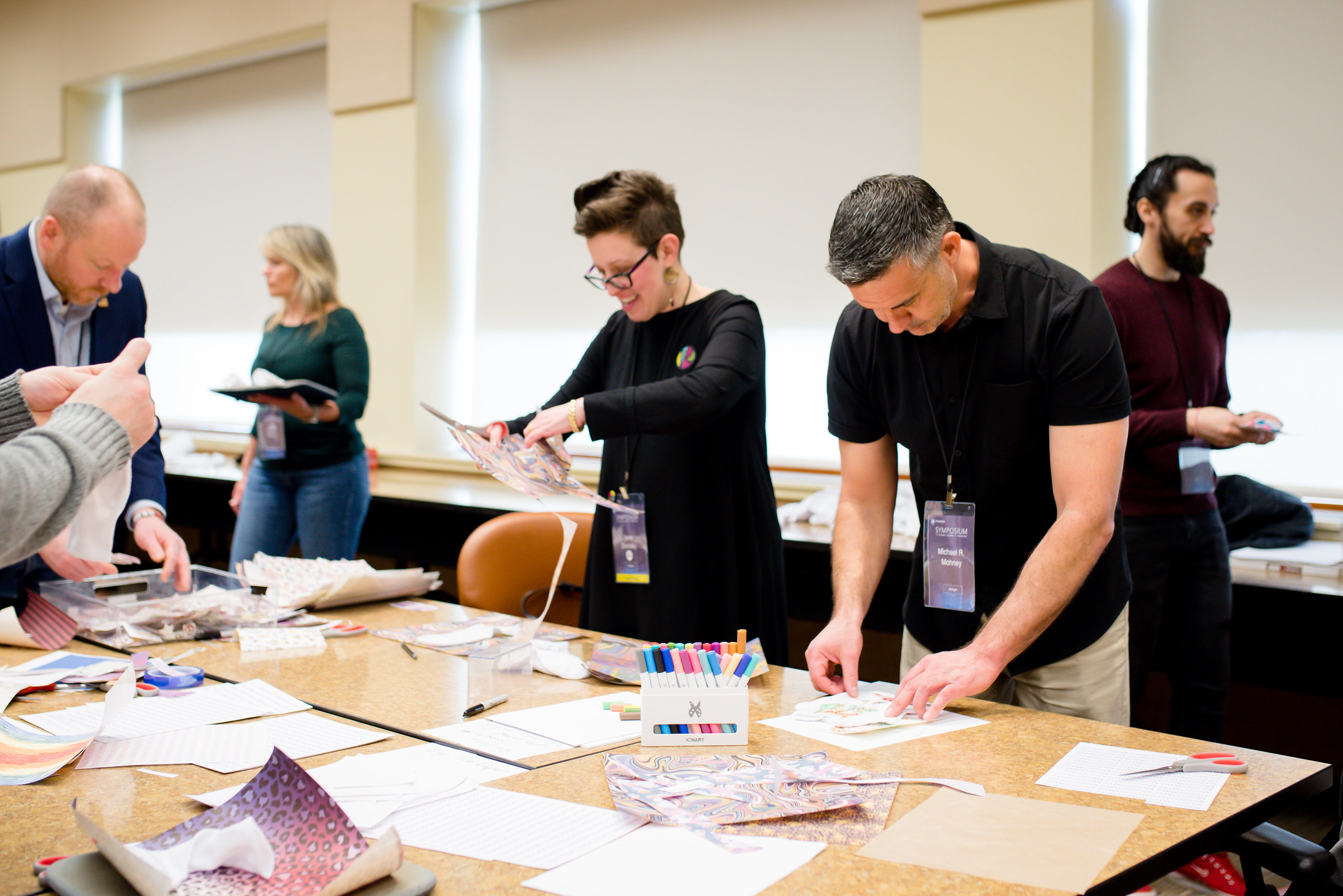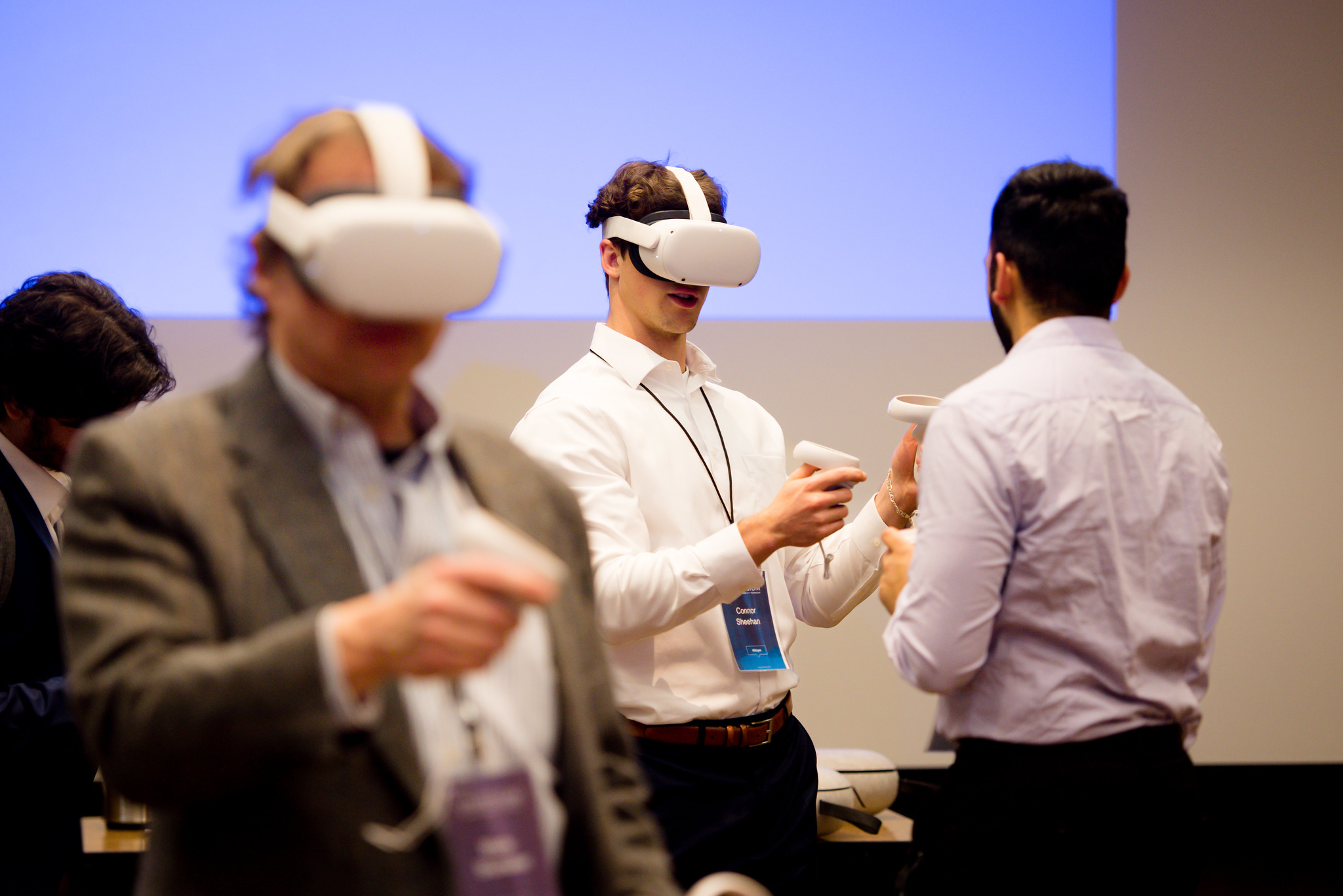Choose a Year:
TLT in Review: 2025

May
Elevating Faculty Voices: Year Two of the Teaching and Learning Technologies Faculty Advisory Committee
Strategic Alignment
University Libraries Strategic Plan 2025 – 2030
- Elevating Library Experiences
- Defining Our Teaching Program
The Teaching and Learning Technologies Faculty Advisory Committee concluded its second year as a vital partner in shaping the future of technology at Penn State. The 2024–2025 committee was comprised of 13 faculty representing 5 campuses and 8 units at University Park, with expanded representation across disciplines and teaching modalities. Committee members participated in 7 meetings throughout the year, providing thought leadership on critical decisions and acted as liaisons between their campuses/units and TLT. Their insights have directly influenced TLT, the broader University Libraries, and Penn State IT reinforcing the value of ongoing faculty engagement in the design and delivery of teaching technologies. Throughout the year, faculty feedback directly shaped TLT offerings, including:
- Suggested TLT Symposium keynote speakers, served as reviewers for session proposals, and participated in panels at the TLT Symposium
- Contributed ideas for a Technology Community of Practice and helped shape the design of future outreach efforts focused on less tech-comfortable faculty
- Influenced the 2025 Faculty Engagement Award topics around AI integration
- Helped shape future research agendas in TLT including ideas for future AI-related and instructional design research, such as disparities in AI use across student populations and detection of AI-generated content
Key contributions of the committee beyond influencing TLT this year include:
AI Oversight
- Guidance on AI Risk Assessment Rubric and approved AI features in platforms like Zoom and Top Hat, resulting in the final approved process available on AI at Penn State website.
Educause Ambassador Promotion
- Amplified Educause Ambassador promotion resources and opportunities for faculty professional development.
Course Insights
- Gave informed feedback of a Canvas-integrated analytics dashboard by discussing features and identifying use cases.
Broader Awareness of Initiatives
- Strengthened interdisciplinary discussion and ways to implement practices including Universal Design for Learning (UDL), faculty wellness and burnout that can be aided by technology, and Software/Courseware processes for broader awareness among faculty university wide.
Learning Spaces Manager (LSM) Input
- Offered initial usability feedback and recommendations for improving the faculty-facing “Learning Space Profiles” tool that will be released later in 2025.
Support for R Studio Retirement Decision
- Advised and acknowledged the institutional decision to retire R Studio, citing decreased usage and alternative resource priorities, ensuring faculty were informed and consulted.
As we look ahead to 2025–2026, TLT is actively selecting the next cohort of faculty with the newly selected members.
Year Two of the Student Technology Advisory Representatives group (STAR)
Strategic Alignment
Penn State Strategic Plan 2025 – 2033
University Libraries Strategic Plan 2025 – 2030
- Elevating Library Experiences
STAR had a successful second year with 13 participants representing University Park and World Campus. Stephanie Thomas, assistant teaching professor of Ad/PR in the Bellisario College of Communications, continues to co-lead the STAR group in partnership with TLT. This partnership provides student participants with access to unique engagement opportunities through the college. Each semester we held three meetings to engage with the students on a range of topics including:
- Shared takeaways and sneak peeks at early innovations from the Adobe Max conference.
- STAR students were asked to test and provide feedback on “PALS: Personalized AI Learning Simulations,” a project by current TLT Faculty Fellow Kyle Chalupczynski. Kyle provided a presentation of his work on the project so far and then had the STAR students test several aspects of the simulations.
- Invitation to participate in feedback and discussion session hosted by the Joint Standing Committee on the Appropriate and Effective Use of AI in Instruction.
- Invitation to participate in focus group feedback concerning the UDrive Needs Assessment Project sponsored by Penn State IT.
- Invitation to participate in the student panel moderated by the interim provost at the 2025 TLT Symposium.
- Provided feedback on the syllabus for the new course COMM297: Emerging Technology and Advertising. STAR students reviewed and gave feedback on the draft of syllabus, then participated in an AI-driven exercise to modify and update the syllabus.
- Beth Ardner, Vice President of Growth at Gobekli, addressed the STAR students and provided an early look at an upcoming product and solicited feedback from the students.
In addition to the regular meetings, Ryan Wetzel and Crystal Ramsay presented about STAR at the annual EDUCAUSE conference in October 2024.
April
Dreamery Speaker Series: “Embracing AI as Essential Learning: Preparing Students for Life Beyond College”- Eddie Watson
Strategic Alignment
University Libraries Strategic Plan 2025 – 2030
-
Defining Our Teaching Program
-
Advancing a PS Framework for Library Instruction
-
Elevating Library Experiences
On April 15, 2025, TLT hosted Edward Watson, Ph.D., Vice President for Digital Innovation at the American Association of Colleges and Universities (AAC&U). He is also the founding director of AAC&U’s Institute on AI, Pedagogy, and the Curriculum. His most recent book is Teaching with AI: A Practical Guide to a New Era of Human Learning (Johns Hopkins University Press, 2024).
The day started off with his keynote presentation, “Embracing AI as Essential Learning: Preparing Students for Life Beyond College,” where Eddie detailed the challenges and opportunities that have emerged for higher education in the age of AI, especially in terms of pedagogical practice and student learning. He highlighted concrete approaches and strategies higher education can adopt, both within the classroom and across larger curricular structures, to best prepare students for life after graduation.
To end his visit, Eddie facilitated a hands-on workshop titled “Exploring AI for Teaching and Learning,” focused on how faculty can ensure their students achieve the learning outcomes of their course while also engendering AI competencies and literacies that are of increasing demand in the world of work. Assignment design, feedback, and grading were all key topics.
210 people from 20 campuses attended at least one session throughout the event; 64 people attended at least one session in the Dreamery and 146 people attended at least one session online.
Teaching and Learning with Technology (TLT) Contributions to AI Week (April 14–18, 2025)
Strategic Alignment
Penn State Strategic Plan 2025 – 2033
University Libraries Strategic Plan 2025 – 2030
-
Defining Our Teaching Program
-
Evolving Library Experiences
-
Transforming Our Workforce
- Empowering Researchers
During Penn State’s AI Week, Teaching and Learning with Technology (TLT) demonstrated leadership in advancing the role of AI in education by hosting eight sessions focused on practical use cases, hands-on learning, and emerging practices around AI in teaching and learning. Highlights included:
Dreamery Speaker Series (4/15): Featured keynote and workshop with Dr. Edward Watson on “Embracing AI as Essential Learning,” drawing 210 participants from 20 campuses (64 in-person, 146 online).
Facilitation of Partner Presentations with Microsoft:
• Empowering Educators with M365 Copilot – 72 online attendees
• Innovative AI Solutions for Education – 66 online attendees
Hands-On Workshops:
• AI Artist Lab (10 participants)
• Can AI Play? (13 participants)
• Can AI Game? (9 participants)
Teaching and Learning Sessions:
• Learning Tools Exploration – 62 attendees from 6 campuses
• AI-Enhanced Pedagogy Faculty Panel – 45 attendees from 3 campuses
Impact: Across all sessions, TLT engaged over 480 participants across four days, building AI literacy through practical workshops, fostering interdisciplinary dialogue, and supporting faculty and staff in developing skills essential for the future of teaching and learning. Our efforts continue to position TLT—and University Libraries—as leaders in shaping the responsible use of AI in higher education.
TLT in the News
April 5: Faculty Engagement Award Recipients Transform Teaching with Generative AI
April 28: TELL Registration Now Open
March
Engagement in EXTERNAL Professional Service by Penn State’s Teaching and Learning with Technology Team
The TLT team extensively engages in professional service activities, both within and outside of the university. This article focuses on external engagements. Our involvement spans a variety of committees, organizations, and consortia, which allows us to stay at the forefront of trends in emerging technologies and educational innovation. Through much of this work, we also contribute to the broader discourse on these topics. Members of our team participate as leaders, members, proposal reviewers, presenters, hosts, and more.
Engaging outside of Penn State enables us to collaborate with other leading institutions, thereby enriching our own practices and perspectives. When it comes to general, enterprise, and emerging technologies in higher education, we find a lot of value from our involvement with EDUCAUSE, the BTAA, Unizin, and the Learning Technology Consortium (LTC). Below are some ways we engage with each.
EDUCAUSE
- ID2ID international program – co-created with PS/TLT
- Teaching and Learning Advisory Group membership
- Community Groups
- Conference proposal reviewers
- Presenters, Quick Talk and podcast guests, panelists
- Participation in professional development programs like Young Professionals and a variety of Leadership Institutes
BTAA
TLT is represented on the Learning Technology Liaisons, Learning Technology Leaders and the Emerging Technologies Working Group.
Unizin
Penn State’s non-voting Unizin board member is in TLT. Additionally, a number of our staff represent Penn State on the Teaching and Learning Advisory Group. We have members who contribute to the following:
- Faculty Development Subcommittee
- Affordability Group
- Stepping Stones Curriculum for learning analytics
- AI Principles development
Learning Technology Consortium (LTC)
Twice per year, TLT staff represent Penn State at the LTC meeting, a multiday event hosted at a member institution. TLT hosts on a regular rotation and one staff member is a past chair.
We also maintain strong connections to the higher ed landscape in the realm of learning spaces. EDUCAUSE is a longstanding source of information and community. Through the Learning Space Rating System (TLT staff coauthored) and Learning Spaces Community Group, as well as our commitment to FLEXSpace in various ways, we not only learn but also actively contribute ideas and insights. We also participate in the BTAA Learning Spaces Peer Group.
Our commitment to immersive learning is evident by our participation in many of the above, as well as EDUCAUSE’s XR (extended reality) Community Group and in the following focused groups and organizations: the Immersive Learning Research Network (iLRN) and Champions in Higher Education of XR (CHEX).
These engagements provide us with opportunities to learn from colleagues, influence decisions, author publications, collaborate on conference presentations, and share our expertise. Our investment of time and energy helps to foster collaboration, facilitate knowledge exchange, and enhance our reputation as thought leaders in teaching and learning technologies. As active members of these communities, we ensure that Penn State remains a dynamic and innovative hub for educational excellence.
2025 TLT Symposium Recap
Strategic Alignment
University Libraries Strategic Plan 2025 – 2030
- Evolving Library Experiences
The Teaching and Learning with Technology Symposium at Penn State annually brings together ideas and people with the power to transform education. The day’s events include presentations, discussions, workshops, networking, awards, and more focused on unlocking technology’s potential to improve teaching & learning. At this event, attendees explore powerful ideas and meet the people behind them.
This year, TLT hosted the annual event at the Penn Stater Hotel and Conference Center on Saturday, March 22nd. To kick off the event, we hosted Brandeis Marshall, data scientist & data equity strategist, founder of DataedX and author, as the Symposium Keynote Speaker. Her keynote address discussed both ends of the AI adoption spectrum. Focusing on prioritizing people over pedagogy and pedagogy over tech along with highlighting how to embrace people’s skills and experiences to pinpoint areas of AI transparency and mitigate AI bias.
The program consisted of 18 concurrent sessions, 17 Lightning Talks, and 22 Discovery sessions. This year, we recorded and livestreamed the keynote address and 4 faculty presentations. The most popular sessions focused on AI and VR. In addition to the faculty sessions, Interim Executive Vice President and Provost, Dr. Tracy Langkilde, moderated a thoughtful conversation with a panel of undergraduate students discussing the impact technology has on their learning experiences at Penn State. Finally, the Creative Learning Initiatives team coordinated the AI Arcade and facilitated a special edition of “Can AI Play?”. Early feedback results show that over 90% of attendees found that the TLT Symposium met or exceeded their expectations.
The 2025, mostly, in-person event brought together 384 higher education professionals, which was a 9.7% increase in attendance from 2024. 361 people attended in-person and 23 people attended virtually. 8 people attended online and in-person; they are captured in the in-person attendance. 256 people from University Park, 95 people from the Penn State Campuses, 20 people from World Campus, 4 other PS colleagues, and 9 people who were external to Penn State attended.
Additionally, TLT hosted the third annual Symposium Lite on Thursday, March 27th. Symposium Lite is a half-day virtual event where attendees can continue learning by viewing four highlighted Symposium presentations followed by facilitated discussions with the presenters. This event aims to be an inclusive extension to the in-person portion of the TLT Symposium. Early feedback results show that over 90% of attendees found that Symposium Lite met or exceeded their expectations.
This year, all the sessions were presented live with no prerecording. Overall, the event brought 106 people from across the commonwealth together via Zoom, which was a 12.7% increase from 2024. 19 campuses were represented; 55 people from University Park, 40 people from the Penn State Campuses, and 11 people from World Campus. 58 people attended Symposium Lite who did not attend Symposium on March 22.
TLT in the News
March 4: Faculty Engagement Award Recipients Transform Teaching with Generative AI
March 6: IMEX Lab opens immersive pilots for Summer and Fall
March 18: Call for 2025-27 Teaching and Learning Technologies faculty advisory committee
March 18: Dreamery Speaker Series sessions focus on teaching with AI
March 22: TLT upgrades Maker Commons with cutting-edge 3D printers
February
Creative Learning Initiatives Fall 2024 Report Released
Strategic Alignment
Penn State Strategic Plan 2025 – 2033
University Libraries Strategic Plan 2025 – 2030
- Evolving Library Experiences
- Defining Our Teaching Program
The Fall 2024 semester marked a period of significant growth and impact for the Creative Learning Initiatives group within Teaching and Learning with Technology (TLT). The report provides an overview of key accomplishments, data-driven insights, and the ongoing contributions of the Media Commons, Maker Commons, Immersive Experiences Lab (IMEX), Interactive Experiences group, and the Dreamery in supporting faculty and students across Penn State’s campuses.
Key Performance Highlights:
- 14,417 students, faculty, and staff served – the highest engagement since the Media Commons’ inception in 2007.
- 360 courses integrated creative technologies into their curricula, supporting faculty across multiple disciplines.
- 5,814 academic videos produced in the One Button Studio 2.0, totaling 192+ hours of content creation.
- 4,938 3D prints completed, enabling hands-on learning across a variety of fields.
- Expanded immersive learning experiences across five colleges, including VR, AR, AI tools, and the IMPACT empathy-focused card game.
Comprehensive impact analysis, including an infographic overview and a detailed written report that further explores student success stories and the role of these services in advancing TLT’s and University Libraries’ shared mission can be found here:
Partnering with Vendors for Faculty Events: LinkedIn Learning Day & Top Hat Day
Strategic Alignment
Penn State Strategic Plan 2025 – 2033
University Libraries Strategic Plan 2025 – 2030
- Transforming Our Workforce
- Defining Our Teaching Program
Top Hat on Campus at Penn State
Top Hat partnered with Penn State’s Abington, Lehigh Valley and Scranton campuses, along with Penn State IT and TLT, to offer a series of workshops Feb. 11-13 designed to help faculty get the most out of Top Hat. These sessions provided faculty with innovative strategies to enhance student engagement through Top Hat’s interactive tools.
Each day featured an introduction to Top Hat as faculty explored ways to design more engaging lectures, advanced features that showcased lesser-known functionalities, faculty panel discussions as educators shared their experiences and best practices for improving classroom engagement and extending engagement focusing on using Top Hat beyond the classroom for assignments and activities. Office hours and Q&A were available for attendees to ask questions and provide vendor feedback. With both in-person and virtual attendance options, the workshops fostered meaningful discussions and practical takeaways for integrating Top Hat into teaching and learning.
The event welcomed 58 attendees from 13 different campuses, impacting approximately 3,500 students across Penn State campuses. 32 people attended the event on Abington’s campus, 27 people attended the event on Lehigh Valley’s campus, and 15 people attended the event on Scranton’s campus.
LinkedIn Learning Day
On Wednesday, 2/26/25 TLT partnered with ITLD and Career Services to host the first LinkedIn Learning Day. The event provided faculty, staff, and students an opportunity to receive expert guidance from a LinkedIn representative on how to maximize the LinkedIn Learning platform and utilize available features in a variety of formats.
During the faculty and staff-focused session, “Leveraging LinkedIn Learning for Career Development,” attendees learned how to identify and locate content to build their skills in specific areas and how to supplement courses with LinkedIn Learning content by integrating directly to Canvas.
The student-focused session provided opportunities for students to develop job-ready skills, improve their profiles, and increase their visibility to recruiters and employers.
The hybrid faculty/staff portion of the event brought together 79 attendees from 13 campuses; 21 people attended in person at the Dreamery and 58 people attended online. The student-focused session brought together 85 students.
TLT in the News
February 6: Computer scientist Brandeis Marshall to deliver 2025 TLT Symposium keynote
February 10: LinkedIn Learning Day Postponed Until February 26
February 13: Two Penn State Lehigh Valley professors launch TLT Fellowship Project
February 21: TLT to host virtual Symposium Lite to complement 2025 TLT Symposium
January
TLT Global Impact
Strategic Alignment
University Libraries Strategic Plan 2025 – 2030
- Evolving Library Experiences
Teaching and Learning with Technology (TLT) is committed to supporting global impact by empowering educators with innovative tools, collaborative partnerships, and opportunities to transform learning. By connecting faculty, students, and institutions worldwide, TLT helps foster creativity and drive innovation to address complex global challenges.
One example of how we support global impact is through initiatives like Experiential Digital Global Engagement (EDGE). TLT has collaborated closely with Penn State Global, the Schreyer Institute for Teaching Excellence, and Monash University colleagues in Australia to design and conduct the EDGE Journey Resource Map, a digital tool to help faculty design and implement impactful global learning projects. This open-access resource guides educators through key stages like partnership building and leveraging technology, empowering them to create meaningful international collaborations. The map will launch to a more global audience in March 2025, supported by virtual webinars.
Another example includes a partnership with the Global Teach Ag Network (GTAN) to enhance global food security education through the GTAN E3 initiative. Highlighting the collaboration, Dr. Daniel Foster shared, “The team at TLT epitomizes kindness, creativity, and competency. They operationalize a vision of pedagogy before technology and people before pedagogy.” Earlier this month, TLT hosted a daylong retreat with Agriculture educators and graduate students. TLT facilitated two hands-on experiences, including IMPACT, a card-based experience exploring technology’s global impact on people, societies, and communities and a hands-on AI workshop where participants co-designed board games. These efforts showcase TLT’s commitment to fostering creativity and collaboration to address global challenges.
Related Links
EDGE Journey Resource Map: https://sites.psu.edu/edgeresourcemap/
PSU News Article for Journey Map: https://www.psu.edu/news/global-programs/story/penn-state-global-unveils-new-tool-assist-faculty-developing-edge-projects
GTAN E3: https://globalteachagnetwork.psu.edu/educators-empowering-educators/
IMPACT Deck: https://impactdeck.psu.edu/
Current Review of the Learning Spaces Leadership Committee (LSLC)
Strategic Alignment
Penn State Strategic Plan 2025 – 2033
University Libraries Strategic Plan 2025 – 2030
- Evolving Library Experiences
The Learning Spaces Leadership Committee (LSLC) is made up of faculty and staff members across university units and colleges. Crystal Ramsay and Tim Linden from TLT are members of LSLC sub-committees. Its charge is to:
- Redefine the decision-making process for general purpose classrooms (GPC) that includes increased faculty and student input and a research-based approach to learning spaces.
- Redesign the proposal process to reflect university priorities, development of a complete budget, identification of lifecycle funding, and annual presentation to university leadership.
- Promote learning spaces experimentation and innovation that includes experimental spaces, faculty development, research support, and technology solutions to rapidly test and share results of emerging learning spaces.
Per the second bullet point, Tim Linden, Learning Spaces Coordinator in TLT, leads the campus proposal process which now allows up to 100% funding for general purpose renovations and updates at the campuses. The full funding is new to the process, as LSLC previously only funded renovations at 50% in most instances. The updated process now begins in the fall and concludes around July 1st to allow for funding to be allocated at the start of the fiscal year. Since January of 2019, all 20 Commonwealth Campuses have had projects awarded funding at a total of over $4.5 million dollars, with $3.7 million dollars distributed.
This project year is at about the halfway point, where campuses have submitted initial surveys to provide the committee with their intended project ideas (including the funding request). As of the survey deadline, we have 14 surveys from 14 campuses. One is forthcoming (Greater Allegheny). As of now, the total request for funding is $1,095,678.
TLT in the News
January 13: Register now for Spring 2025 Teaching with Technology virtual workshop series
January 31: Computer scientist Brandeis Marshall to deliver 2025 TLT Symposium keynote
TLT in Review: 2024

December
Fall 2024 Teaching with Technology (TwT) Series Recap
Strategic Alignment
Penn State Strategic Plan 2025 – 2033
- Enhancing Student Success
- Fostering diversity, equity, inclusion and belonging
- Increasing land-grant impact
University Libraries Strategic Plan 2020 – 2025
The Teaching with Technology (TwT) Series, sponsored by the TLT Learning Design Team, offered 20 sessions on 10 different topics, including sessions for new faculty on Penn State syllabi and Canvas. Additional sessions included an introduction to Generative AI tools, how they can be used to enhance course material, and how to communicate effectively about expectations of generative AI use with students. Learning tool explorations of Penn State-approved technologies related to generative AI, technologies for student engagement, digital whiteboards, and technologies to promote inclusive and accessible learning were also part of the fall 2024 offerings.
Nine Learning Design Team members presented, in partnership with thirteen external collaborators from three different units throughout the University, including CLI, SITE, ITLD, and other instructional designers located at Commonwealth Campuses such as Altoona, Behrend, Brandywine, and York. Across all sessions, the series had 798 registrants and 450 attendees (281 unique) from 19 different campuses.
Fall 2024 Dreamery Speaker Series (DSS): Inclusive Learning and Accessibility
Strategic Alignment
Penn State Strategic Plan 2025 – 2033
- Enhancing Student Success
- Fostering diversity, equity, inclusion and belonging
- Increasing land-grant impact
University Libraries Strategic Plan 2020 – 2025
On December 4, 2024, TLT partnered with Penn State Accessibility to host Luis Perez, Disability & Digital Inclusion Lead for CAST. In his role, Luis promotes the creation, delivery and use of high quality accessible educational materials and technologies to support equitable learning opportunities for all learners. Luis is embedded with the Postsecondary and Workforce Development group at CAST that works to increase access to middle- and high-income careers for populations underrepresented in the workforce, including people with disabilities.
The day began with his keynote presentation, “Essential for Some, Helpful for All: Designing for Inclusion with Universal Design for Learning,” where Luis shared insights from the learning sciences that challenge all educators to think differently about ability and disability, including the latest updates to the Universal Design for Learning Guidelines pioneered at CAST as a framework for designing barrier-free learning experiences. Over lunch, Luis chatted with attendees and shared his passion for photography.
After lunch, Luis facilitated an interactive workshop for Penn State faculty and staff on creating accessible content and implementing accessibility best practices with familiar tools such as Microsoft Office and/or Google Workspace. The day concluded with an informal fireside chat, moderated by Philip Voorhees, exploring how UDL principles can create inclusive, flexible, and student-centered learning environments through curriculum design, assessments, classroom materials, and student interactions.
129 people from at least 6 campuses attended at least one session throughout the event; 67 people attended at least one session in the Dreamery and 62 people attended at least one session online. Overall, the feedback from the event was positive and people look forward to future speakers.
TLT in the News
December 6: Opportunities for new faculty to enhance teaching with technology practices
November
TLT Research & Evaluation Team Activities
Over the past two years, the R&E team has created a research portfolio around generative AI tools. Our partners include Dr. Tiffany Petricini (Penn State Behrend) and Steve Borrelli (University Libraries).
Perspectives of Artificial Intelligence: Year 2 Findings
- Staff are often excluded in the conversations about the implementation of AI and GenAI tools in higher education; we are pleased to offer the first look at staff perceptions.
- Responses show assumptions that students are misusing AI, but students are worried and scared they’ll be falsely accused; all groups agree they would follow institutional policy, need more training, and believe in transparency of use; lingering distrust between students and instructors and the tools themselves
- We have prepared a White paper to provide an institutional-view of the results of the survey. Other work includes:
- Using the Information Inequity Framework to Study GenAI Equity: Analysis of Educational Perspectives (submitted for publication)
- University Staff Perspectives of GenAI (draft ready for submission)
- Communicating Academic Honesty: Teacher Messages and Student Perceptions (in-progress)
Confessions of AI
- This study seeks to explore how students think about and describe academic cheating; we are currently in data collection and anticipate findings in summer 2025
- Utilizes a custom-built application to collect verbal and typed responses, created and implemented by Brian Shook and Sergey Stefanovich (TLT)
- Graphic design recruitment material by Tyler Greer (TLT)
Beyond AI work, the team investigated Faculty Burnout and Technostress. Findings from this study informed the next work, Community Technostress. The continuation of the investigation expands to include staff and students. The team will work with Student Affairs for recruitment support. Data collection is anticipated to start in January.
Unit-focused work seeks to support TLT in analysis and assessment of programs.
- Data analysis support and reporting to Learning Design for their Summer Camp planning
- Assessment support for Media Commons services, and will build on our prior research of the Maker Commons: A case for alternatives
- Data collection for the IMPACT Deck to seek what and how students describe using the deck and what faculty say changes in the classroom because of the activity
- Supporting the research endeavors of Tiffany Petricini’s Faculty Fellows project
Blended Learning Transformation (BlendLT) Program
Strategic Alignment
Penn State Strategic Plan 2025 – 2033
University Libraries Strategic Plan 2020 – 2025
The Blended Learning Transformation (BlendLT) program, offered by Teaching and Learning with Technology (TLT) and IT Learning and Development (ITLD), supports Penn State faculty and departments in designing or redesigning courses into blended formats. The BlendLT program incorporates research-based blended learning strategies to enhance student-centered teaching and learning. It provides faculty with opportunities to explore the pedagogical benefits of blended formats, develop effective assessments, design engaging activities, and foster continuous course improvement.
The program includes a 6-week faculty workshop series delivered in a blended format, utilizing online sessions via Zoom and in-person sessions at University Park, an online self-paced Learning Path in Canvas, support for faculty learning communities (FLCs), and one-on-one consultations with faculty participants. Workshops are held every summer from mid-May to mid-July. FLCs receive support for one semester or an academic year, while consultations and presentations are offered year-round in-person or online. Faculty involved in the program and their redesigned courses include:
- Tulay Girard, MKTG301: Principles of Marketing, which reaches 35–40 students per semester.
- Ann Macrina, ANSC427: Milk Secretion, serving 13–25 students each academic year.
- Wael Jabr, BA840: Business Data Management, supporting 40 students annually.
Blended learning addresses institutional needs for flexible course offerings, student preferences for digital tools, and workforce demands for online readiness. These factors make blended formats an ideal approach for preparing undergraduate students for modern learning and working environments. To further support faculty in redesigning their blended courses, faculty will explore and gain access to Microsoft Copilot as a redesigning tool and incorporate advanced technology into teaching practices.
TLT in the News
November 1: Dreamery Speaker Series: Sessions focus on inclusive learning and accessibility
November 11: Students use maker tech to create feminist quilts, buttons, justice awareness
October
Learning Spaces Leadership Committee (LSLC) Proposal Update
Strategic Alignment
Penn State Strategic Plan 2025 – 2033
University Libraries Strategic Plan 2020 – 2025
The Learning Spaces Leadership Committee (LSLC) is a multi-disciplinary group charged by the provost to redefine the decision-making process for general-purpose classrooms (GPC) that includes faculty and student input and a research-based approach to learning spaces. TLT has representation on all three committees within the larger group (executive, academic, operations and technology).
TLT’s Learning Space Coordinator, a member of the Tech and Operations subcommittee, works directly with proposal submitters (faculty, administrators, IT staff, and OPP), provides feedback and guidance on the submission process and draft proposals, and shepherds proposals through a multi-stage review process. Ultimately, the Tech and Operations subcommittee makes recommendations for renovation awards to the Office of the Vice Provost for Commonwealth Campuses.
In August, the 2024 cycle of campus proposals was complete, and award notifications were sent to ten campuses; a total amount of just under $700,000 was awarded. The 2025 cycle will be starting up in the next month with communications, webinars, and the opening of a pre-proposal survey. The LSLC proposal website has been updated and can be found here: https://sites.psu.edu/learningspaceslc
Can AI Play? – The AI board game learning experience!
“Can AI Play?” – a generative AI-focused learning experience designed by TLT’s Creative Learning Initiatives team – has been quickly gaining popularity this semester, with recent participants including students, faculty, staff, administrators, and a national and international audience at conferences!
Originally developed for TLT’s Spring 2024 MAKEiT event, “Can AI Play?” has become a successful active learning experience, introducing participants to the creative possibilities of generative AI. The session guides participants in small teams through the process of using generative AI tools like ChatGPT or Microsoft Copilot to design and prototype a board game. Framing generative AI as a collaborator and design accelerator, the session has participants engage with the AI in brainstorming and designing game mechanics while supported by TLT facilitators to ensure a productive learning experience. At the end of the session participants may play other groups’ games and provide feedback as well as reflect on what they have learned about using generative AI as a collaborator for creative and design-oriented projects.
Since its inception, “Can AI Play?” has been presented at conferences including TLT’s MAKEiT, the inaugural Global Impact Forum, and the Educause Annual Conference. The learning experience has also been adapted as an available learning experience in the Dreamery and offered by the Media Commons to courses at the New Kensington and Beaver campuses. Four courses have participated in the experience at the Dreamery so far this semester with students providing positive feedback including an average experience rating of 4.5 out of 5. Survey results indicate that students feel more comfortable using generative AI after participating in the learning experience (4.3 out of 5) and are likely to use similar technology in the future (4.2 out of 5). “Can AI Play?” continues to grow in popularity both at Penn State and with external audiences, illustrating the potential for AI to serve as a creative partner in educational settings.
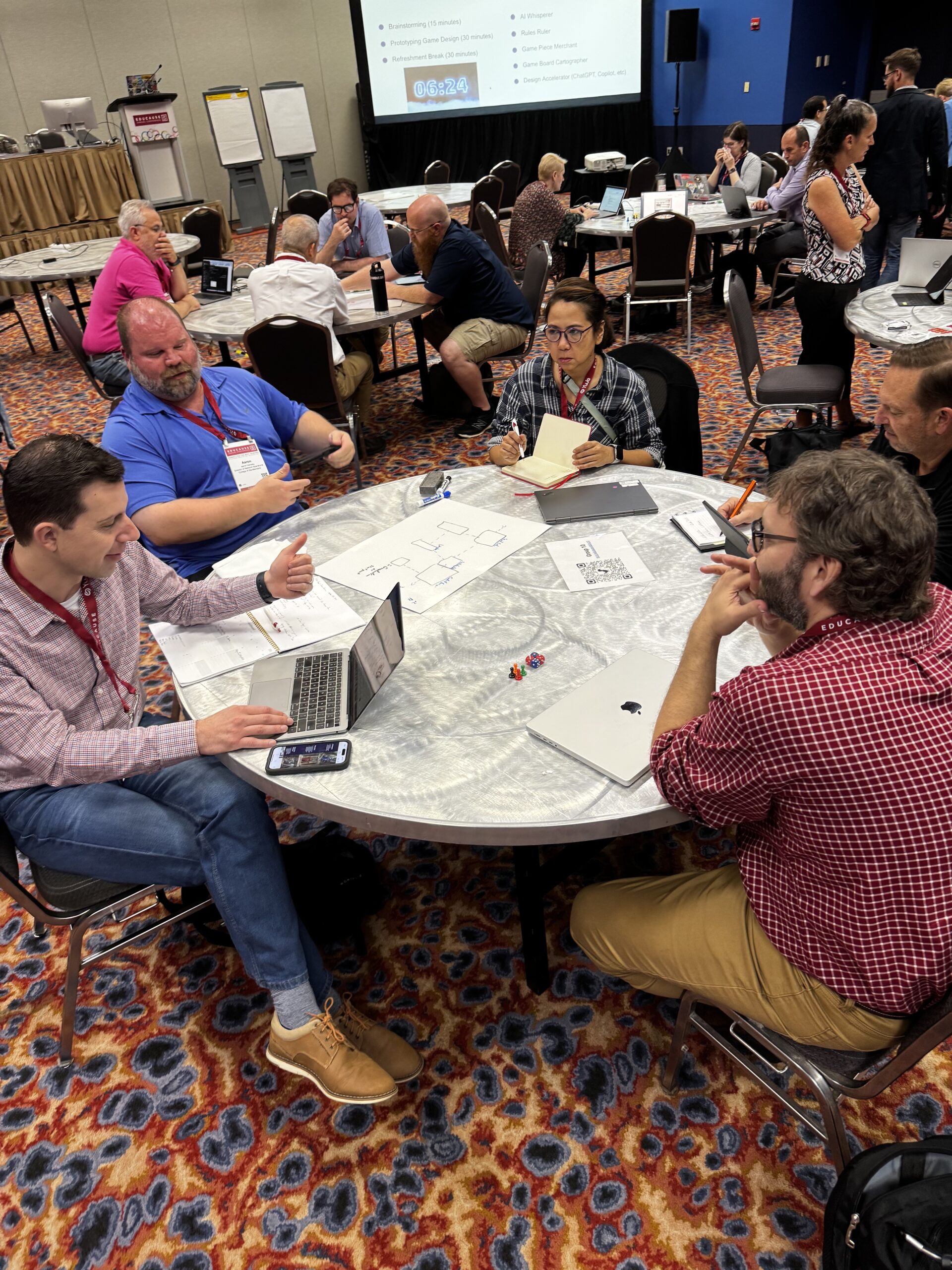
September
Interactive Experiences launches new Dreamery Experiences for fall semester
Strategic Alignment
University Libraries Strategic Plan 2020 – 2025
University IT Strategic Plan 2020 – 2025
The Interactive Experiences team within Creative Learning Initiatives team has launched three new hands-on learning experiences for the Fall 2024 semester. These experiences are now live and available for booking, and we’ve already seen significant interest from faculty across multiple disciplines.
Our new offerings include:
- Can AI Play?
- AI Artist Lab
- Reality Remix: Hands-On Encounters in XR
These experiences are designed to immerse students and faculty in emerging technologies, encouraging creative exploration and learning in new ways. We’ve already seen some fantastic student projects, and the feedback so far has been overwhelmingly positive.
For a preview of student creations from the Can AI Play? session, feel free to explore some examples here: https://padlet.com/tltlearnfirst/can-ai-play-xuozqdycx684op0w.
We’re looking forward to seeing how these sessions continue to evolve and contribute to innovative learning at Penn State.
2024 New Faculty Orientation (NFO)
Strategic Alignment
University Libraries Strategic Plan 2020 – 2025
University IT Strategic Plan 2020 – 2025
The University New Faculty Orientation (NFO), coordinated by Faculty Affairs, brings together new faculty across the Commonwealth to provide necessary and timely information for a successful start at Penn State. This year NFO consisted of a Canvas site to house university-wide information, a live NFO event on Wednesday August 21st, and pre- and post-NFO professional development workshops on preparing syllabus information and setting up Canvas. New faculty also have access to a New Faculty Community space located in Teams and have the opportunity to enroll in a Provost Endorsement for faculty new to Penn State.
This year, TLT connected with 15+ offices to update information for the New Faculty Orientation Canvas site and one new page was created with DUS to focus on academic advising at Penn State.
TLT also provided technical support and session facilitation for the live portion of NFO on August 21st, which brought together 149 faculty. A few of the key speakers of this event included, but are not limited to: Neeli Bendapudi, President; Tracy Langkilde, Interim Executive Vice President and Provost; Andrew Read, Senior Vice President for Research; Margo DelliCarpini, Vice President for Commonwealth Campuses and Executive Chancellor; Renata Engel, Vice Provost for Online Education. During the event, TLT dedicated 4 staff to support the main zoom room sessions and 7 additional staff to support the concurrent sessions. TLT also presented two of the concurrent sessions: Teaching – Designing Prompts: Transforming AI into Your Creative Co-Worker and Teaching – Technology for Teaching at Penn State, 66 new faculty attended across both sessions. Finally, TLT dedicated one staff member to provide closed captioning and PowerPoint accessibility support so NFO materials for new faculty were accessible.
Before NFO, we added over 340 faculty members to the New Faculty Community space within Teams. TLT facilitates this asynchronous space along with space champions from Faculty Affairs, ITLD, and SITE. Teams provides an opportunity to connect new faculty with timely resources as well as access to additional new faculty colleagues. This community space was established in 2021 and has been growing each year since with over 1,800 faculty.
In addition to supporting the live event, TLT coordinated Teaching with Technology: Prep & Practice sessions to ensure new faculty are equipped with the foundational knowledge, skills, and resources pertaining to creating their syllabus and setting up Canvas before the semester started. Preparing Your Penn State Syllabus had a total of 51 new faculty attendees across two sessions and Canvas: An Introduction had a total of 54 new faculty attendees across two sessions.
To foster an ongoing relationship with new faculty, TLT coordinates a Provost Endorsement for Faculty New to Penn State to embrace Teaching and Learning with Technology. The first fall cohort consists of 24 faculty from 10 campuses. By completing the endorsement, faculty enhance their knowledge of essential teaching and learning academic technologies, connect with peers across the commonwealth who are also new to the university, and learn about administrative units that support and provide resources to faculty.
Overall, NFO provides an awareness and introduction to TLT to showcase the support we can provide faculty and their students as they start their professional journey at Penn State.
August
Spring 2024 Teaching with Technology Series Impact Statement
Strategic Alignment
University Libraries Strategic Plan 2020 – 2025
University IT Strategic Plan 2020 – 2025
In Spring 2024, the Teaching with Technology Series, led by the Learning Design Team in Teaching and Learning with Technology, featured 21 sessions covering 11 diverse topics. These included those for new faculty on Penn State syllabi and Canvas, as well as topics such as blended learning, remote synchronous teaching, engaging students through feedback, and the IMPACT deck. The series also explored learning tools like Canvas LTIs for student engagement, generative AI tools, digital whiteboards, and technologies to promote inclusive learning. Nine Learning Design Team members co-presented with 15 collaborators from seven different units throughout the University, including CLI, SITE, ITLD, faculty from Mont Alto, OVPCC, and other instructional designers located at Commonwealth Campuses. The series had over 321 registrants and 186 attendees from 19 different campuses.
Maker Commons 3D Printing Service Upgrade
Strategic Alignment
University Libraries Strategic Plan 2020 – 2025
University IT Strategic Plan 2020 – 2025
The Media Commons has upgraded the University-wide Maker Commons 3D printing service ahead of the Fall 2024 semester. As part of the regular three-year lifecycle, the Dremel 3D45 3D printers that have been used for the last six years across two lifecycles, have been retired. The new 3D printers selected for the service are the Prusa MK4 3D printers. The selection of the new printers was made after testing several leading 3D printers and meeting with manufacturers and benchmarking with other institutions at the 2023 International Symposium on Academic Makerspaces (ISAM) hosted in Pittsburgh.
Thirty Prusa MK4 3D printers are being installed in room W136 of the Pattee Library Media Commons. Students from University Park, the Commonwealth Campuses, and World Campus will access these printers using the same workflow they have become accustomed to by submitting 3D print requests through the Maker Commons website via the cloud service 3DPrinterOS. Faculty can continue to register their 3D printing assignments with the Media Commons from this website.
The Prusa MK4 3D printers provide a build volume 72% larger than the previous printers and also print at double the speed of the previous printers while maintaining a high-quality output. In the 2023-2024 academic year, the Media Commons completed 12,131 successful 3D prints for 3,400 students.
TLT in the News
August 12: Updated Faculty Tech Academy for 2024-25 now available in Learning Resource Network
August 15: Libraries’ Teaching and Learning with Technology Impact Award seeks nominees
August 19: 2024 TLT Faculty Engagement Award recipients named, focused on AI for teaching
August 22: Teaching with Technology virtual workshops now open for fall 2024 registration
August 23: Top Hat visiting Penn State to help faculty increase engagement in courses
August 30: Classroom to Community program now accepting faculty for yearlong engagement
June & July
DEER
Strategic Alignment
University Libraries Strategic Plan 2020 – 2025
University IT Strategic Plan 2020 – 2025
The Learning Design Team successfully hosted the 2024 Digital Education Exchange Retreat (DEER) from May 22 – 24th at Toftrees Golf Resort, State College. Ten new faculty members and 5 DEER alumni from multiple Penn State campuses attended 2.5 days of high-touch programming and created Technology-Enhanced Experiences (TEEs) for their upcoming courses. The talented and dedicated cross-unit DEER staff led more than 12 unique and powerful in-person faculty engagements, including community building activities, ‘Morning Brew’ exchanges, interactive and application-based workshops, and personalized consultations.
Throughout the retreat, faculty were provided the time and space to think critically about the intentions, applications, and evolution of educational technologies through the lenses of the SAMR model, Tetrahedral model, TPACK, Generative AI and digital fluency. A highlight of the retreat was learning station rotations, where faculty explored and learned three community platforms including Spatial, Padlet, and Teams. First, the DEER staff presented the unique features and affordances of each tool. Then faculty worked on design activities at each station table throughout the rotations. Through the DEER programing, faculty were also exposed to evidence-based pedagogical strategies to effectively design instruction with these community platforms, using methods such as cooperative learning, flexible objective alignments, and transfer appropriate processing strategies.
The final deliverables of the retreat were Technology-Enhanced Experiences (TEEs) that can be implemented immediately into their upcoming courses. The TEEs created and demonstrated by faculty participants at the end of the retreat included final projects that use Spatial for students to build community and share each other’s work, redesign of a whole class to use Teams as the main content and communications management system, and class assignments that leverage Spatial for discussions.
Feedback on DEER this year was overwhelmingly positive with most faculty attendees feeling very satisfied or satisfied with almost all the sessions and the structure of the retreat experience. We also received constructive feedback on different aspects of the retreat to improve upon, including having more structured prototyping sessions, more hands on and one on one working sessions, earlier and multiple individual consultations, and different versions of DEER for specific disciplines and colleges such as the College of Arts and Architecture. One faculty shared their experiences across the 2.5 days. On day 1, one felt it had “Great balance of inspiring talks and hands on practice with the tech platforms”, on day 2, another felt “Wonderful to have time with several specialists to get different feedback and suggestions, and on day 3, one “Really appreciated everyone’s time and enthusiasm, great to network with professionals from different campuses.”

Commonwealth Campus Outreach Update
Strategic Alignment
Penn State Strategic Plan 2025 – 2033
TLT is in its second year of a commonwealth campus outreach effort. As in the first year, priority campuses were those where there is new leadership at the chancellor level. The purpose is to educate leadership at the highest level about TLT and the services and resources we provide, to balance the ongoing and robust interactions with TLT at the faculty and staff levels. In the first year, the outreach team visited Penn State DuBois, Wilkes-Barre, and Beaver. In year two, AY 2023-24, the team held Zoom and on-site visits with Penn State Schuylkill, Greater Allegheny, and Berks.
While engaging with campus leaders was a priority of each outreach effort, site visits also included campus learning designers, IT professionals, librarians, and faculty. The outreach team shared data about the nature and extent of the campus’s engagement with TLT over the past five years. We discussed challenges and explored opportunities. From our efforts over the past year, the following are among the outcomes:
Schuylkill
- The DAA and interim Chancellor has requested a tour of TLT and new and current technologies at PS Schuylkill during Back To Campus Day on August 21.
Greater Allegheny
- SOCW 303 began experimenting with immersive tours to create community strength/threat assessments with 6 students. Students captured 360º images of locations like churches, housing, schools and family centers in Duquesne and marked them up using ThingLink. This is a cornerstone program for the campus and holds a lot of potential for community improvement.
- MKTG 330 worked with research partners to offer students immersive tours of market spaces around the world. 13 students used a pre-recorded traditional video to tour a Christmas market in the UK, pre-recorded 360º video and headsets to view three markets in Italy, and live-streamed 360º video to walk around a market in Quebec, Canada while asking questions of the guide in real-time.
Video of class: https://mediacommons.psu.edu/wp-content/uploads/2024/04/IMG_4765.mov
Berks
- The on-site visit strengthened TLT’s relationship with the Berks library staff. This has resulted in more discussion about having a Teams channel and possible Zoom meetings to better connect library staff across the commonwealth who work with TLT to share projects and best practices.
- The Berks library created an outstanding binder of information about the Media Commons equipment available to the campus. They have shared the file, and we hope to share it with all the commonwealth libraries, as we think it will be a helpful guide.
The outreach team will continue its conversations and on-site visits this coming academic year. The implications of this year’s VSIP, IT OST, and regional leadership consolidation have created many needs and a wide variety of circumstances. TLT is committed to supporting our commonwealth campuses however we can.
May
2024 Spring Dreamery Speaker Series
Strategic Alignment
University Libraries Strategic Plan 2020 – 2025
University IT Strategic Plan 2020 – 2025
In April TLT hosted Joseph Yun, artificial intelligence and innovation architect and a research professor of electrical and computer engineering at the University of Pittsburgh. 138 people attended at least one session throughout the event.
On Tuesday, 4/16 Joe attended the AI Horizons monthly meeting and TLT hosted two additional sessions for the Penn State community. The series started off with a session specifically designed for Penn State IT professionals. Joe explained mechanisms of generative AI and presented insights and reflections on how generative AI, alongside traditional AI, can be effectively integrated into the enterprise operations of the university, covering areas such as IT, privacy, and security. Joe later spoke to Penn State faculty and staff on the transition from conventional artificial intelligence approaches to generative AI and explored the significant impact this evolution has had—and is expected to continue having—on both academic environments and societal operations at large. The day concluded with a networking hour to engage in further conversation with Joe. Tuesday’s events brought together 108 faculty and staff; 42 people attended at least one session in the Dreamery and 66 people attended at least one session online.
On Wednesday, 4/17 TLT facilitated an interactive workshop with Joe on what the future of higher education entails with generative AI. The session served as a brainstorming forum for attendees to leverage their insights on AI to formulate precise, context-driven questions about the future of higher education, reflecting attendees’ diverse disciplines and experiences. Wednesday’s events brought together 93 faculty and staff: 33 people attended at least one session in the Dreamery and 60 people attended online.
Overall the feedback from the event was positive and people look forward to future speakers. Some highlights from the feedback survey include: 1.) The guest was fantastic. Super knowledgeable but focused on being helpful and meeting differing levels of knowledge/comfort; Support staff were very welcoming and supportive. 2.) Excellent speaker. Terrific conference/meeting organization. Great networking opportunities. 3.) The presenter made AI and teaching AI very clear. I now have a better idea of how I can incorporate AI into my courses. 4.) Wish we could have heard more from him!! 5.) I genuinely learned so much. In fact, when I returned to classes on Wednesday, I incorporated a large amount into the lectures for the day.
TLT’s Advisory Committees Pilot Year
Strategic Alignment
University Libraries Strategic Plan 2020 – 2025
University IT Strategic Plan 2020 – 2025
Teaching and Learning with Technology established the inaugural Teaching and Learning Technologies Faculty Advisory Committee for the 2023-2024 academic year as well as the student-focused Student Technology Advisory Representatives (STAR) group. Both programs strive to take a user centric approach to guide future teaching and learning activities for key collaborators.
The 2023-2024 Teaching and Learning Technologies Faculty Advisory Committee, comprised of 12 dedicated faculty from 6 different campuses across the Penn State community, committed to enhancing the educational experience through innovative technology. Their role is pivotal in guiding TLT’s strategic direction, providing teaching and learning insights to future thematic areas for programming, reviewing and testing technology that has and will impact faculty and students. The committee’s efforts are a testament to Penn State’s commitment to academic excellence and the continuous improvement of its pedagogical approaches. The 2024-2026 Faculty Advisory Committee has been selected and will be announced over the summer.
Concurrently with the faculty committee, TLT also started the Student Technology Advisory Representatives (STAR) group. This group was created to engage students early in the design process for new technology-based services, evaluations, and offerings. Initial discussions around the creation of the group included several key stakeholders including the interim CIO and the Assistant Vice President for Diversity, Equity, and Inclusion. Students were recruited through faculty recommendations, building awareness at student events like the Involvement Fair, Graduate Exhibition, Nursing Carnival, and through email and social media outreach.
The 2023-2024 Student Technology Advisory Representatives included 13 students from University Park, World Campus, Penn State Harrisburg, and Penn State Great Valley. STAR provided feedback on several topics through their six meetings for the year including the Adobe accounts transition, playtesting for MAKEiT, the new Shields building Media Commons, generative AI’s potential role in education, and more. In addition, student representatives took advantage of professional opportunities like professional headshots, networking, and help with internships.
TLT in the News
May 8: Penn State launches the 2024 ID2ID Program for instructional designers
April
2024 Symposium and Symposium LITE
Strategic Alignment
University Libraries Strategic Plan 2020 – 2025
University IT Strategic Plan 2020 – 2025
The Teaching and Learning with Technology Symposium at Penn State annually brings together ideas and people with the power to transform education. The day’s events include presentations, discussions, workshops, networking, awards, and more focused on unlocking technology’s potential to improve teaching & learning. At this event, attendees explore powerful ideas, and meet the people behind them.
This year, TLT hosted the annual event at the Smeal College of Business, Business Building on Saturday, March 23rd. To kick off the event, we hosted John Urschel, mathematician, former NFL offensive lineman, and Penn State alumnus, as the Symposium keynote speaker. His keynote address focused on ways in which technology shaped him as a mathematician and continues to impact the way he learns new material, teaches concepts to others, and performs research.
The 2024 fully in-person event brought together 350 higher education professionals which was a 10% increase in attendance from 2023. 234 people from University Park attended and 116 people from the Penn State campuses attended. The program consisted of 17 concurrent sessions, 15 Lightning Talks, and 20 Discovery sessions. The most popular sessions focused on AI in higher education. This year, the Symposium had a few new components: VR Exhibits, an AI Arcade, an Adobe Photo Walk, and lunchtime Tech Chats.
Additionally, TLT hosted the second annual Symposium Lite on Thursday, March 28th. Symposium Lite is a half-day virtual event where attendees can continue learning by viewing four prerecorded sessions followed by live facilitated discussions with the presenters. The presentations were a mix of new material and repeated presentations from the TLT Symposium. This event aimed to be an inclusive extension to the in-person portion of the TLT Symposium and brought 94 people across the commonwealth together via Zoom. 21 campuses were represented, including 39 people from University Park and 55 people from the Penn State campuses.
TLT Communications Student Interns: Year in Review 2023-2024
Strategic Alignment
University Libraries Strategic Plan 2020 – 2025
University IT Strategic Plan 2020 – 2025
Teaching and Learning with Technology (TLT) began the second year of a newly established Communications Internship Program in collaboration with the Bellisario College of Communications Dean, Marie Hardin. The opportunity continues to offer valuable work experience for driven communications students at Penn State and serves as a means for TLT to seamlessly access essential internal communications-related services from within the organization.
In the Summer of 2023, we welcomed Juliana Turdo to our team as a communications intern, joining Victoria Stark, who has been an invaluable member since September 2022. Together, they provided communication services to members of TLT, including writing and editing articles, filming and editing videos, redesigning content, interviewing faculty, and creating content for TLT’s social media.
This year, the interns edited 26 articles on various topics, including innovation efforts, summits, speaker series, awards, committees, and more. Along with editing, the interns interviewed, researched, and wrote two articles. The most recent one is the AI article, which will be published to the TLT website soon. It highlights a study surrounding the rapidly evolving landscape of higher education and how the integration of generative artificial intelligence (AI) tools has sparked excitement and apprehension among educators and students alike. The published articles are featured on Penn State News and the TLT website, which the interns update regularly.
Additionally, they also took on the role of creating posts and graphics paired with captioning social media posts to promote articles and innovation efforts through TLT’s platforms X and Instagram. The team has created over 40 social media posts over the past year.
The TLT interns collaborated with Tim Linden on a new video series titled “Classroom Characteristics for Effective Teaching.” In the video series, classrooms and professors are highlighted to see the implementation of innovative classrooms on campus applied to a variety of different courses. This involved the interns interviewing professors, recording classes, and editing content.
This year the interns also supported the Teaching and Learning with Technology Symposium. They worked closely with Sherry Rice and Blue Band videographer Gabriella Efaw to create a promotional video content spotlighting different speakers and their presentations for the big event. Additionally, they filmed video content on the day of the Symposium for future promotional videos and content.
In addition, they recently developed two notable documents aimed at enhancing operational efficiency and safety within the Shields Building. The first document, the TLT Emergency Document , serves as a comprehensive guide for streamlining emergency evacuation procedures. This document consolidates vital information into one accessible resource, including updated images detailing evacuation routes and the locations of fire extinguishers. Collaborating closely with Jessie Driver and receiving feedback from UL Safety Officer Stephanie Ahmed, this document ensures that TLT is well-prepared to respond effectively to emergency situations. Furthermore, our team is in the process of creating an Onboarding Document to streamline the internal onboarding process. This upcoming document, developed in collaboration with Creative Learning Initiatives and Learning Design, will provide clear steps for refilling positions, ensuring a smoother transition for new hires. With these initiatives, TLT demonstrates its commitment to safety and operational excellence.
As we bid farewell to Turdo and Stark, who will both be graduating this May, we express our heartfelt gratitude for their contributions. Turdo, with a B.A. in Telecommunications and a minor in Journalism, will be moving back to New Jersey to pursue a career in telecommunications. Stark, with a B.A in Public Relations and a minor in Women’s Studies and the Diversity Studies Certificate, will be moving back to Northern Virginia to pursue a career in public relations within the DMV. We are fortunate that both will be staying with TLT until July to ensure a smooth transition. While we will certainly miss Turdo and Stark, we eagerly anticipate the arrival of two new interns who will bring fresh perspectives and talents to our team. In the future, the TLT Communications Internship Program will continue to grow, serving TLT while simultaneously enhancing the professional development of Penn State students.
TLT in the News
April 1: Dreamery Speaker Series: Sessions to focus on AI in teaching and learning
April 2: TLT now accepting 2024-25 Faculty Engagement Award applications
April 10: Open Education Engagement Series sessions offered in spring 2024, Transform Teaching: Faculty BlendLT program applications open through April 28
April 17: Faculty invited to apply for upcoming Digital Education Exchange Retreat
March
Teaching and Learning with Technology Impact Award
The recipient of the 2024 Teaching and Learning with Technology Impact Award was Anna Divinsky. She is an assistant teaching professor in arts and architecture and serves as the digital multimedia design and digital arts certification program coordinator for the World Campus.
Professor Divinsky authored the first online Art 10 course for World Campus and then transitioned it to Penn State’s first ever MOOC, creating a space for content and peer interactions for over 30,000 students. Last year, Professor Divinsky was selected as a Faculty Fellow and collaborates with two other faculty members on the use of Art Steps and Spatial.io, an interactive virtual world, to support students’ presence and to provide peer feedback online. She has presented her work at numerous conferences, including OLC Accelerate, the International Technology, Education, and Development Conference, and at the TLT Symposium.
Professor Divinsky received a medal at the TLT Symposium on March 23 and a plaque and cash award at the Faculty/Staff Awards on March 28, 2024.
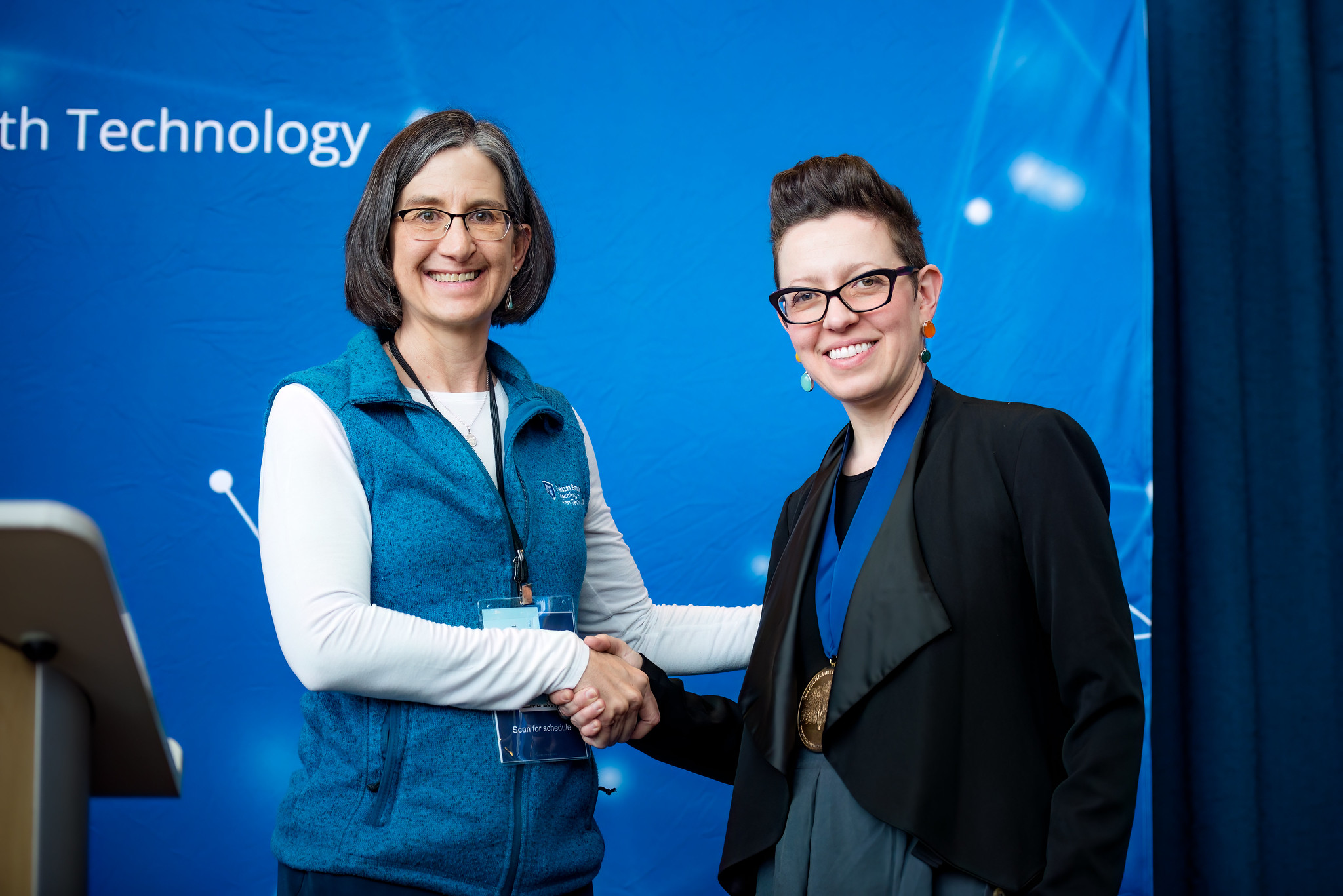
MAKEiT: AI Edition
Strategic Alignment
University Libraries Strategic Plan 2020 – 2025
University IT Strategic Plan 2020 – 2025
The 4th iteration of TLT’s MAKEiT experience was held as a pre-conference event for the TLT Symposium on Friday March 22nd. MAKEiT began in 2015 as a hands-on emerging technology-focused active learning experience event intended for faculty and staff that support faculty. MAKEiT is not typically an annual event; instead, the format is reserved for moments in time when there is an opportunity for a significant confluence of important emerging technologies. The 2024 version focused exclusively on creative generative artificial intelligence tools.
Three brand new learning experiences were designed for the event with a focus on using a variety of generative AI tools in different creative workflows. The main question we asked participants to explore was around if and how these AI tools could be used as collaborative partners and aid the creative process. What challenges arose? What ethical dilemmas were discovered? How could these ideas, concepts, and experiences translate to the classroom?
The three learning experiences were:
- Can AI Play? – a session focused on using ChatGPT as a creative partner to invent a new board game while also physically prototyping the board game using whiteboards and game pieces;
- Paws & Prints – a session focused on exploring text-to-print prompts and combining the results with maker workflows;
- From Paper to Premier – a session focused on exploring text-to-video tools as well as AI’s capacity for storytelling. All three of these experiences may see continued use for classes as Dreamery experiences or Media Commons workshops.
MAKEiT events are planned with 100 participants in mind. Of 115 registrants this year, 88 actually attended. Of those 88, 40 were faculty, 42 were staff, and 6 were students. Fifty-five attendees were from University Park, 28 were from the Commonwealth campuses, and five from World Campus. Results from a post-MAKEiT satisfaction survey were overwhelmingly positive: 60% reported that this was their first MAKEiT and 95% reported they would attend MAKEiT again. The remaining 5% were ‘maybes.’
Select quotes from attendees provided in the survey:
- “It was amazing. I love the collaborative process with people and AI, from idea to reality.”
- “Great session! The tools used were fun and produced some humorous results. The team activity was well thought out. I will be bringing a few video examples that were made in that session into my class in a few weeks.”
- “The activity was brilliantly conceived. Directions were clear. Teamwork was awesome. Support in the room was great. Can’t believe how much we accomplished in such a brief time. What a great way to explore new technologies!”
- “This opened my mind to what the average person can do with Gen AI. Given how accessible it is, I will consider weaving this into my teaching.”
February
Creative Learning Initiatives Fall 2023 Report and Infographic
Every semester the Creative Learning Initiatives team creates a report and accompanying infographic visualization to share and celebrate the successes faculty and students had when engaging with our collection of services and learning experiences including the Media Commons, Maker Commons, Immersive Experiences Lab, and the Dreamery. The Fall ‘23 report, completed this month, also allows us to reflect on the services and experiences provided and look for areas of improvement and opportunity to continue providing the best possible creative teaching and learning experiences for faculty and students.
The infographic of the report can be found here: https://mediacommons.psu.edu/2024/01/30/fall-2023-semester-report/
Fall 2023 saw 10,546 students, faculty, and staff use the Media Commons, Maker Commons, and Immersive Experiences Lab initiatives across the Commonwealth. Much of this use was focused in 299 classes in nearly every discipline offered at Penn State. To facilitate these interactions outside of University Park, traveling consultants provided 27 in-person sessions and 93 remote sessions for instruction, consultations, and support.
One Button Studio 2.0 helped students and faculty create 6,238 academic videos, comprising over 236 hours of video. In addition, students from across the Commonwealth created 6,719 3D prints in pursuit of their course work and their own curiosity.
The Interactive Experiences team facilitated 26 experiences across 5 colleges in the Dreamery. The team currently offers four main experiences: virtual reality; augmented reality; a cooperative, discussion-based card game called IMPACT that focuses on empathy, diversity, and technology; as well as generative AI tools.
2023-2024 Faculty Engagement Awards – Recap
The 2023-24 Faculty Engagement Awards focused on Smart Tracking and Advanced Features in Remote Synchronous Courses due to remote synchronous along with remote blended courses being offered for the first time university-wide as of Fall 2023. The focus was on the benefits and constraints of the Insta360 Link AI-powered webcam and a deep dive into applying advanced best practices for teaching in remote synchronous courses.
From June 2023 through February 2024, the cohort consisted of 15 faculty from 8 campuses and 3 University-Park colleges. To have the program be at scale with the high number of faculty, there also was a collaboration with 7 campus/college instructional designers. The program’s implementation resulted in 1,534 students having experienced emerging technology and enhanced remote synchronous practices in Fall 2023. As part of the program there were 6 cohort meet-ups, 66 consults by TLT learning design, and 15 faculty reports created about their experiences. Each faculty that participated in the program indicated that they are expanding the use in additional courses for Spring 2024 and beyond including using the camera to make asynchronous video, use for flexibility in attendance for in-person courses, and more.
TLT in the News
February 20: TLT to host Virtual Symposium Lite to complement the 2024 TLT Symposium
February 12: Top Hat visiting Penn State campuses to help increase engagement in courses
January
Teaching with Technology (TwT) Fall 2023 Recap
Strategic Alignment
Penn State Strategic Plan 2025 – 2033
University Libraries Strategic Plan 2020 – 2025
The Teaching with Technology (TwT) series helps faculty develop ways to be agile in a variety of course offerings that incorporate multiple modes of delivery to students. The focus is on introducing technology considerations for the classroom, promoting the alignment of technology tools with learning outcomes, and emphasizing Penn State faculty peer examples to provide context and understanding.
The TwT program offered 22 sessions on nine different topics to over 250 attendees in the Fall 2023 semester. Nine learning design team members presented in the series, in collaboration with eight colleagues from four different units, including SITE, ITLD, CLI, and OVPCC. The topics covered in the Fall 2023 semester included: Syllabus, Introduction to Canvas, IMPACTful Learning (Interactive Gameplay), Learning Tools for Content Visualization, Enhancing Instructional Materials through Generative AI, Top Hat for Course Engagement, Advancing DEIB via Instructional Technology, Remote Synchronous Classrooms, and Technology-Enabled Feedback. Spring 2024 programming will offer multiple Learning Tool Exploration sessions on Canvas LTIs, DEIB technologies, AI tools, and digital whiteboards. The learning design team will continue to partner with cross-unit colleagues to plan and deliver the sessions.
TLT utilizes CRM for faculty and other stakeholder relationships
Strategic Alignment
Penn State Strategic Plan 2025 – 2033
University Libraries Strategic Plan 2020 – 2025
TLT’s various offerings such as consultations, projects, events, and programs create thousands of faculty relationships each year. TLT is now using the open-source EspoCRM software to consolidate all this relationship-related data from the various TLT teams’ current disconnected sources into a single unified platform. This will allow TLT to analyze, report, and build on our faculty relationships more easily and efficiently.
As the demand for varied data reports continues to increase, this centralized system will significantly reduce the time required for data analysis while also opening up new avenues for exploring previously difficult to assemble data. The CRM system’s capability to create reports and track trends over time will further enhance TLT’s understanding of its faculty relationships and will help answer important questions to inform decisions. The CRM system will also provide a view of each faculty member’s past interactions with TLT, enabling staff to access valuable context when working with individual faculty members or others across the university. This contextual information facilitates continuity in relationships when multiple staff may be involved in supporting the same faculty member over time.
Following a period of staff practicing data entry and refining our data model throughout the Fall 2023 semester, EspoCRM is now being used to track all TLT’s engagements with faculty and other critical stakeholders. Data describing 1050 faculty engagements were entered into the system during the Fall 2023 semester and an effort is now underway to enter historical data for the past three years into the system.
TLT in Review: 2023

October – December
For the final report of 2023, we depart from our normal format to summarize highlights from October, November, and December and to capture ‘TLT in the News’ for the same period.
Highlights
On November 7, 2023 TLT held the first meeting of the Student Technology Advisory Representatives (STAR) group. This group was formed from 13 student volunteers from four campuses and eight disciplines. STAR meets twice per semester and TLT staff engage with them on a host of topics including early access to new initiatives, student engagement opportunities, technology workshops, and more, all with the intent of using their feedback to improve our services, offerings, and communication.
Adobe MAX was held from October 10-12 and was attended by the Creative Learning Initiative’s Ryan Wetzel and Stephanie Thomas. MAX is Adobe’s annual conference that unveils all the new features coming to Adobe’s Creative Cloud products over the next year as well as providing hands-on access to new technologies and workshops taught by industry professionals. Ryan and Stephanie brought many of these new innovations to a local audience at Penn State by offering a MAX Sneaks presentation and workshop following the conference.
TLT supported the logistics and communications around the relaunch of Adobe products for access by students, faculty, and staff. The introduction of new licensing opportunities occurred on December 17, 2023. TLT also contributed by updating Penn State’s Adobe website to clarify choices that students, faculty, and staff can make about their licensing opportunities, see this page for more: https://adobe.psu.edu/whats-included/adobe-options/
AI Horizons, a community-driven space for Penn State faculty and staff to share their evolving experiences with Generative AI, a potentially disruptive technology, relaunched on October 17, 2023 after a successful summer pilot of the programming. AI Horizons is now a monthly hybrid meeting occurring in both the Dreamery and Zoom and invites Penn Staters from across the commonwealth to share their experiences and challenges with using Generative AI for teaching and learning purposes. Ongoing conversations are fostered outside of these meetings through the AI in the Classroom Microsoft Teams space with more than 500 members.
The Media Commons will report on its Fall 2023 semester in February. This report contains an analysis of usage data drawn from Media Commons implementations at every campus as well as an infographic that visualizes and highlights compelling stories and experiences of our partnered faculty and students.
TLT launched the Faculty Advisory Committee, led by the Learning Design Team. The Teaching and Learning Technologies Advisory Committee nominations were reviewed, and 12 faculty were selected from 7 different campuses. TLT is currently seeking topics for the Faculty Advisory Committee monthly agenda by using the Teaching and Learning Technologies Advisory Committee topics submission form for both the fall and spring semester meetings.
TLT Learning Design generated its inaugural Annual Report for the 2022-2023 academic year that showcases the impact of teaching and learning with technology across Penn State as well as impact within the field of Learning Design. The report also highlights contributions by the Learning Design team to external collaborators and across higher education.
The TLT Symposium planning team hosted webinars to discuss the Request for Proposals process for the 2024 TLT Symposium to help give attendees’ proposals the best chance of acceptance. The Symposium team collected more than 50 submitted proposals reviewed by a faculty panel and final proposal selections were made in mid-December. The Symposium planning team was able to successfully accept and notify presenters for the upcoming 2024 TLT Symposium. The team also was able to announce the 2024 keynote speaker, John Urschel.
TLT Learning Design launched TLT’s first Provost Endorsement titled Embracing Teaching and Learning with Technology for New Faculty. This endorsement opportunity will be available in Spring 2024 for any faculty new to Penn State. The Provost Endorsements is a new effort at Penn State and TLT has created one of seven inaugural offerings.
TLT presented and participated in Immersive Technology Day which was held in-person at Penn State Hazleton with two sessions in a hybrid format for remote attendees. Sessions included Immersive Technology 101 (15 attendees), Open demo session for hands-on experiences (Over 10 attendees), Teaching with Immersive Technology (11 attendees), and Immersive Experience Classroom Observation.
TLT Learning Design staff contributed to overhauling the Penn State Quality Assurance e-Learning Design Standards that are designed for online (remote asynchronous and remote synchronous) courses https://weblearning.psu.edu/resources/penn-state-online-resources/penn-state-quality-assurance-e-learning-design-standards/. This was done as part of a working group of the Faculty Engagement Subcommittee of the Penn State Online Coordinating Council.
Tim Linden is co-leading an Optimized Service Team to roll out a Learning Spaces Management system to all Penn State Campuses. The team has just been assembled with the start of most work beginning in January 2024.
TLT Leadership and members of both the Learning Design and Creative Learning Initiatives traveled to Penn State Schuylkill on November 21st to meet with Academic leadership, librarians, and IT Director to discuss teaching and learning opportunities and challenges.
Amy Kuntz of the Learning Design team co-wrote a book chapter “Technology Sunset, Can We Pivot?” in the book titled Ethical Considerations of Virtual Reality in the College Classroom published this month https://www.amazon.com/Ethical-Considerations-Virtual-Reality-Classroom/dp/1032359919. The book also showcases the work from TLT’s 2021 Faculty Engagement Awards by faculty member Theresa Black “Conemaugh River Immersive Experience: a 360° Virtual Biology Field Trip”.
TLT hosted an All-Staff meeting on December 13 that included welcoming many of our University Libraries colleagues, MAKEiT Play testing, featuring Creative Learning Initiatives teams and timely team updates.
On December 4 and 5, TLT facilitated the Fall Dreamery Speaker Series focused on “Inclusive Learning Environments” featuring Adam Finkelstein, Associate Director, Learning Environments (Physical and Digital) from McGill University. During the two-day hybrid event, Adam presented to learning spaces professionals, faculty, and staff who support teaching with technology on ways to create a culture of belonging and inclusivity in physical and digital spaces. TLT hosted 124 attendees across both days; 52 people in person and 72 people online.
TLT in the News
December 8: Announcing Teaching and Learning Technologies Faculty Advisory Committee members, New faculty offered opportunities to strengthen teaching practices
November 6: TLT’s IMPACT card game engages players to explore how technology influences life, Dreamery Speaker Series to feature sessions on inclusive learning environments
October 26: Division of Undergraduate Studies celebrates 50th anniversary
October 5: Call for proposals now open for 2024 TLT Symposium, TLT relaunching AI Horizons, Penn State’s AI community meetup
October 3: Virtual reality enhances learning for Harrisburg criminal justice students
September
TLT Unveils Innovative Video Series: Classroom Characteristics for Effective Teaching
Penn State’s Teaching and Learning with Technology (TLT) team has been working on a cross-collaborative project that highlights the university’s most flexible classrooms that foster collaborative and immersive educational experiences.
The project, Classroom Characteristics for Effective Teaching, is the first of its kind, with the first video collection focused on Boucke 304. In total, there are three videos for the series with the project being a collaborative effort between TLT Operations and Communications, Creative Learning Initiatives, and the Learning Spaces Leadership Committee (LSLC).
“We’ve always been trying to find ways to highlight how these classrooms can be used, other than just standard lecture,” said Tim Linden, Learning Spaces Coordinator in TLT. “We put a lot of thought and time into redesigning classrooms, and it’s great to see when faculty utilize all of the features or use the classroom to support different ways and strategies of teaching.”
TLT interns interviewed a faculty member who teaches in the space and who leverages the affordances of the flexible classroom. This was followed by a formal interview and the interns shadowing the instructor and filming the course. The result is a 3-part video series on Bouke 304:
- “Writable Surfaces & Projection in Flexible Classrooms: A Teaching Aid,” – Focused on having two projectors displaying two completely different sets of content.
- “Room Design’s Impact on Accessibility & Student Interactivity,” Focused on collaboration between both classmates and the professor.
- “Boosting Student Engagement in Boucke 304,” Focused on the classroom and the ways it has transformed the instructor’s teaching practices.
The interns worked with Nick Rossi from Creative Learning Initiatives to help elevate the editing process by creating TLT-branded, reusable graphic templates that can be used in future video projects. Going forward, TLT plans to expand its video series, focusing on the diverse array of classrooms and learning spaces within Penn State and how instructors can utilize them. The aim is to improve the educational experience and foster effective teaching practices for both students and educators.
Top Hat Day Fall 2024
Penn State TLT partnered with Top Hat to host the first semi-annual Top Hat Day from August 28 – August 29, 2023, focused on building connection and engagement with dynamic lectures. To be inclusive, the event was hybrid so attendees could participate at the Dreamery, located in the Shields building, or online via Zoom.
The goals for Top Hat Day were to (1) help faculty discover how actively engaging students in the classroom enhances learning, (2) discuss the benefits to Penn State faculty using Top Hat as an engagement platform in teaching and learning, (3) identify the Top Hat elements that can be used to increase engagement, (4) generate awareness among faculty and staff of available support and future training.
The event included a keynote presentation and two interactive workshops from Dr. Todd Zakrajsek, author, and faculty developer in which he shared tools and insights to make lectures more dynamic and engaging for students. In addition, Top Hat presented key features of Top Hat and showcased how fellow Penn State instructors are using Top Hat to put these ideas into practice to improve belonging and student success in their courses. Penn State TLT and ITLD partnered to present Penn State resources including the new Top Hat learning path, the new Top Hat website, and the TLT Prep & Practice professional development sessions.
Top Hat Day brought together 90 Penn State faculty and staff across the 2-day event. 32 attendees participated in person at the Dreamery and 58 attendees participated virtually. Attendees included faculty and staff from 13 campuses and 7 colleges. 86% of attendees who provided feedback on the event indicated that the event met or exceeded their expectations.
TLT in the News
August 15: Teaching with Technology virtual workshops return for fall 2023 semester
August 25: Teaching and Learning with Technology announces new Faculty Advisory Committee
August 30: Teaching and Learning with Technology Impact Award nomination period now open
September 11: Faculty Tech Academy now available for asynchronous technology exploration
September 21: New LionPATH option indicates courses with free or low-cost required texts
August
Dreamery Receives Technology Upgrade to Improve In-person and Remote Experiences
The Dreamery received several upgrades over the summer with the intention of improving the quality of the space for use in hybrid events. Two large screens with Zoom integration replaced a short-throw projector for use as the primary screen for in-person attendees. A camera mounted above these screens provides an audience view for online participants, while a second camera mounted towards the back of the room provides a customizable view of any presenters or panelists. A confidence monitor mounted near the camera provides presenters with a dedicated view of the online audience. Microphones mounted to the ceiling resemble ceiling tiles and provide an impressive area of audio capture across the entire Dreamery, making participation between in-person audiences and online audiences seamless. Construction was completed recently and TLT staff received training on how to schedule the room and use the new equipment.
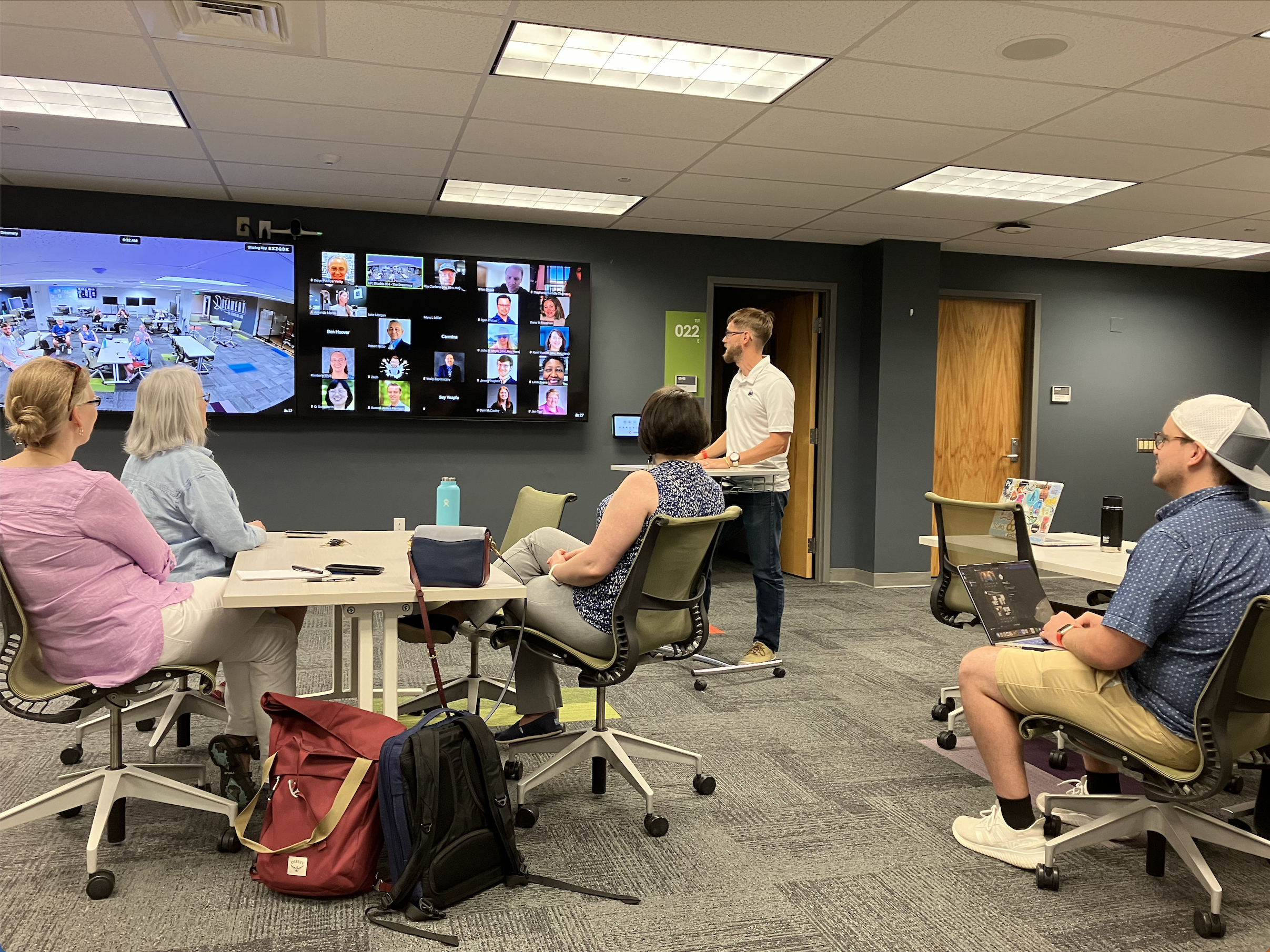
2023 New Faculty Orientation (NFO)
The University New Faculty Orientation (NFO) brings together new faculty from across the Commonwealth to provide necessary and timely information for a successful start at Penn State. This year NFO consisted of a newly developed Canvas site to house University-wide information, a live NFO event on Wednesday August 16, and pre and post NFO professional development workshops on preparing syllabus information and setting up Canvas. New faculty also have access to a New Faculty Community space located in Teams.
This year, Faculty Affairs partnered with TLT to develop a public Canvas site for new faculty to access NFO-specific and University-wide resources asynchronously before the live orientation in August. TLT designed the layout of the Canvas space and consulted with 20+ offices to curate new faculty-specific content for individual pages within the Canvas site. The content focuses on a general overview of Penn State, faculty advancement and student life, teaching and learning, technology, and research.
TLT also provided technical support and facilitation for the live portion of NFO on August 16 which brought together 256 faculty. A few of the key speakers of this event included: Provost Justin Schwartz; Kathy Bieschke, Vice Provost for Faculty Affairs; Andrew Read, Interim Senior Vice President for Research; Patrick Jones, Chancellor, Penn State Schuylkill; Renata Engel, Vice Provost for Online Education; Abigail Diehl, Assistant Vice Provost for Faculty Affairs; and Ann Clements, Assistant Vice Provost for Faculty Affairs – Faculty Development. During the event, TLT dedicated 4 staff to support the main Zoom room sessions and 6 additional staff to facilitate discussions for a teaching and learning focused breakout room activity. Additionally, there were 2 dedicated TLT staff to provide closed captioning and PowerPoint accessibility support so NFO materials for new faculty were accessible.
After NFO, we added over 350 faculty members to the New Faculty Community space within Teams. TLT facilitates this asynchronous space along with champions from Faculty Affairs, ITLD, and SITE. Teams provide an opportunity to connect new faculty with timely resources as well as access to additional new faculty colleagues. This community space was established in 2021 and has been growing each year since with over 1,300 faculty.
In addition to supporting the live event, TLT coordinated Teaching with Technology: Prep & Practice sessions to ensure new faculty are equipped with the foundational knowledge, skills and resources pertaining to creating their Syllabus and setting up Canvas before the semester started. Creating Your Digital Syllabus had a total of 61 new faculty attend across two sessions and Canvas: An Introduction had a total of 70 new faculty attend across two sessions.
Overall, NFO provides an awareness and introduction to TLT to showcase the support we can provide faculty and their students as they start their professional journey at Penn State.
June & July
Digital Education Exchange Retreat (DEER)
On May 23, 17 Penn State faculty, representing 7 campuses and 11 disciplines, engaged in an inaugural 2.5-day Digital Education Exchange Retreat (DEER) at the Nature Inn at Bald Eagle State Park. TLT’s Learning Design team meticulously crafted a retreat agenda that put “people before pedagogy, and pedagogy before technology.”
Faculty attended workshops, experimented with Adobe Express, participated in sessions to exchange knowledge on evidence-based practices in technology-enhanced instruction, produced and prototyped artifacts that utilized the knowledge and skills presented, and networked and exchanged experiences around the role of technology in their own teaching practices. As one example, faculty participants created and presented a Technology-Enhanced Instructional Material (TEIM) using Adobe Express that they can immediately implement into one of their upcoming courses. For instance, some created a website that provides an overview of the course requirements to help potential students prepare for the course load, some redesigned parts of their syllabus and integrated graphics such as an infographic to better communicate the course expectations, and others enhanced their assignment instructions with informative visual aids. Faculty presentations of their artifacts on the final day amazed everyone and inspired many great discussions and ideas among other participants.
Future plans and long term impacts include: (1) a repository of asynchronous and self-paced resources and cohort TEIM artifacts; (2) a Microsoft Teams DEER community; (3) dissemination of cohort experiences and artifact development through faculty word-of-mouth and implementation of artifacts in courses along with showcasing and highlighting experiences and artifacts via TLT website, presentations, conferences, and consultations; (4) assessment of TEIM implementation and outcomes; (5) continued support and development towards a digitally fluent faculty; (6) and hosting opportunities at Commonwealth Campuses for future cohorts.
Bryan Wang, a faculty participant, said
“What a lovely retreat! I enjoyed learning, talking, reflecting, writing, thinking, and creating with you, with the other facilitators, and with the other attendees. The time was collaborative, generative, and restorative; I’m excited to bring a renewed sense of mission (as well as my pre-syllabus!) to my classes, and I’m sure many more lessons learned at the retreat will influence my teaching this coming year and beyond. I appreciate all the time, care, and thought you put into the program, as well as the generous funding that made it possible for me to attend. This was terrific; thank you so much!”

Creative Learning Initiatives Commonwealth Campus Strategic Outreach
In January of 2023, TLT kicked off a strategic outreach effort to acquaint campus leadership, especially chancellors new in the last three years, with all the technology support and services and programming resources that are available through TLT. Spring campus visits included PS DuBois, PS Wilkes-Barre, and PS Beaver. Focus areas include Media and Maker Commons, consultation with regional Media Commons Consultants, and learning design consultation and programming.
Each visit included meetings with the chancellor and other campus leadership, librarians, instructional designers, and IT personnel as well as a campus tour. We shared campus-level data that centered on faculty and staff engagement with TLT around a variety of topics and services. The goal of each visit was to (1) re-energize campus engagement with TLT, (2) explore near- and longer-term synergistic activities, and (3) more effectively execute our partnership around the Media Commons (there is a TLT Media Commons integrated at every campus across the Commonwealth) through establishment of MOUs. Outreach efforts will continue this fall at PS Schuylkill, PS Greater Allegheny, and PS Abington.
Important outcomes have been realized at each of these campuses because of our outreach:
DuBois
Three tailored programming opportunities were delivered to faculty and staff. Programs kicked off with an all-campus meeting update on available resources, a “mini Symposium” session on the importance of storytelling and a culminating workshop on creating storytelling projects featuring Dr. Lauren Jacobson McConnell from Altoona. These events reached a combined audience of 66 from across disciplines and administrative areas.
Wilkes-Barre
Campus leadership discussed strategic opportunities to collaborate on making technologies, One Button Studio, and motivating faculty.
Beaver
Conversations began in June with campus leadership in transition and early outcomes have included an invitation to highlight learning space affordances to faculty, staff, and students at a grand opening of the newly renovated General Classroom Building.
TLT in the News
June 26: Innovative Tools to Improve Student Success Take Top Honors at 1EdTech Conference
April & May
Dreamery Speaker Series
The Dreamery Speaker Series is a renewed TLT program that hosts experts from other institutions to address timely teaching and learning topics within higher education. During the 2022-2023 academic year, we hosted two featured speakers. Both the fall and spring events were executed in a hybrid format; in-person at the Dreamery and virtually to be inclusive of staff across the Commonwealth.
Fall 2022
The first speaker was Dr.Tanya Joosten, director of Digital Learning Research and Development at the University of Wisconsin-Milwaukee, executive director of the National Research Center for Distance Education and Technological Advancements, and a pioneer in the field of digital learning.
The fall series was held on 9/27-9/28 and included numerous talks and discussions. The faculty focused talk: Approaching Intentionality: Factors that Influence Student Success, brought together 44 faculty and staff from 11 campuses/colleges. The discussion-driven session centered on sharing best practices and strategies to intentionally transform courses for student success.
The learning design focused talk: Considerations for Equity-Minded Practices, brought together 39 faculty and staff from 10 campuses/colleges. This session examined how data can be used to solve problems of practice. Additionally, we hosted a meet and greet with key faculty and staff and had an engaging conversation with 22 TLT staff members on the topic of What Success Looks Like for Units Like Ours.
Highlights from the feedback survey include: appreciation for having speakers from outside PSU to bring broader perspectives and research, being together and hearing about something new, and having purposeful session engagement through active learning.
Spring 2023
On 4/24-4/25, TLT hosted Dr. Stephen Monroe, Chair and Assistant Professor of Writing & Rhetoric for the University of Mississippi and co-creator of his university’s AI task force which has worked since last year to plan and pilot new pedagogies.
On Monday, 4/24 we hosted three sessions for the Penn State community. The series started off with an Introduction to AI presentation facilitated by TLT where attendees had the opportunity to explore creative and text generator tools. Dr. Monroe then presented Pilot, Don’t Panic: Advice for Teaching with AI Writing Generators, which focused on how instructors can be proactive in their approach to AI text generator tools and shift the perspective to teaching students data literacy through these tools. The day concluded with a networking hour to engage in further conversation with Dr. Monroe. Monday’s events brought together 169 faculty and staff; 65 people attended at least one session in the Dreamery and 104 people attended at least one session online.
On Tuesday, 4/25 we hosted two conversations with Dr. Monroe focused on AI in higher education. During the AI Policies and Ethics session, he discussed current opportunities and challenges regarding how AI generators will impact policy decisions and ethical considerations within higher education teaching and learning. Then, The Future of AI conversation discussed the future of AI and how it can be leveraged within higher education and teaching and learning. Tuesday’s events brought together 103 faculty and staff: 32 people attended at least one session in the Dreamery and 71 people attended at least one session online.
Overall feedback was positive. Some highlights from the feedback survey include: 1.) There was so much good information, but also plenty of opportunities for networking and conversations. It was a great balance. Also, Dr. Monroe was fantastic. 2.) Offering dedicated time to play with some of the apps was great. Stephen Monroe was excellent. 3.) Enjoyed Dr. Monroe’s frank and honest discussion about AI in education as well as learning from his wealth of knowledge. 4.) The sessions were interactive and the speaker was both knowledgeable and personable.
TLT Communications Student Interns: Year in Review
In the Summer of 2022, Teaching and Learning with Technology (TLT)’s Associate Vice President, John Hoh, created a new Communications Internship program in collaboration with the Bellisario College of Communications Dean, Marie Hardin. This opportunity serves as a way for TLT to provide valuable work experience for motivated communications students at Penn State and a method of sourcing valuable internal communications-related services to members of the organization. So far, the TLT Student Communication Interns have assisted with a variety of communications needs, including feature stories, calls to action, and more technical articles/job aids. Since the launch of the internship, TLT has published 23 articles with some notable ones being Neuroscientist Poppy Crum to deliver 2023 TLT Symposium keynote and Solnosky recipient of 2023 Teaching and Learning with Technology Impact Award.
The first student to join TLT as a Communications Intern was Nick Ferrara, a third-year student majoring in digital and print journalism, and minoring in theatre, who became a team member in August 2022. Soon after, Victoria Stark, a fourth-year public relations student minoring in women’s studies, joined in September. Together, they provided communication services to members of TLT, including writing emails, articles, and other literature.
Dean Blackstock, manager of Operations and Communications, and the Communications Team devised a streamlined process for the interns’ services that makes it simple for members of TLT to request their help. When a person within the organization needs written communication to be created, they submit a request form to the team. The interns write the document based on the information provided and then submit the draft to Margaret Moses, who specializes in Executive Communications, to finalize before publishing. In addition to writing articles, the students offer editing services following the same process. The team keeps drafts within a shared folder in Microsoft OneDrive. They also post links to the articles on the TLT website once they are uploaded to the Penn State IT website. With this process in place, the interns write many emails, articles, and other forms of internal communication for members of TLT that connect and inform the organization.
One of the most notable articles written by the TLT interns was a piece posted to Penn State News about Professor Stuart Selber and his recent book award. The interns also developed numerous important communications related to the 2023 TLT Symposium, a yearly event dedicated to giving faculty the opportunity to participate in workshops related to integrating technology into the classroom. Late in the school year, they filmed a video project that aims to highlight innovative classrooms on campus, which involved interviewing a professor and recording students collaborating in the classroom.
Going forward, we are saddened to have to say goodbye to Nick, who will be moving to Maryland and completing his last semester of college virtually through World Campus. This summer, he will have the opportunity to assist in website design as an intern for the Society for Human Resource Management (SHRM). While we will certainly miss Nick, we are excited to welcome Juliana Turdo, a fourth-year student majoring in telecommunications and minoring in journalism, to our team. Juliana will bring her long-time passion of video editing and production to the group. In addition to this, she is a part of the social media team for 46LIVE here at Penn State and is looking forward to bringing social media content creation to the world of TLT. In the future, the TLT Communications Intern Program will continue to grow, serving TLT and enhancing the professional development of Penn State students.
TLT in the News
April 18: Faculty invited to apply for upcoming Digital Education Exchange Retreat
April 11: Application period opens for next BlendLT Workshop Series
April 10: Solnosky recipient of 2023 Teaching and Learning with Technology Impact Award
April 6: TLT now accepting 2023-24 Faculty Engagement Award applications
April 6: Penn State TLT to host Dreamery Speaker Series focused on Teaching with AI Writing Generators
March
2023 TLT Symposium
The Teaching and Learning with Technology Symposium at Penn State annually brings together ideas and people with the power to transform education. The day’s events include presentations, discussions, workshops, networking, awards, and more focused on unlocking technology’s potential to improve teaching and learning. At this event, attendees explore powerful ideas, and meet the people behind them.
For 2023, we hosted two keynote speakers. The morning keynote address was presented by Dr. Poppy Crum, a Stanford University adjunct professor, neuroscientist, and technologist who is an expert in technology-driven innovation and human evolution. She builds innovative, empathetic technologies that leverage human physiology to improve the ways we interact with the world. Dr. Crum’s TED Talk on using advancing technology to empower our collective future has been watched over 1 million times.
The afternoon keynote address was presented by Bobby Zaepfel who is an organizational change consultant and subject matter expert at Penn State who has built a successful career by constantly challenging the status quo with his creative, people-centric approach. Bobby’s passion for the impact of change and his naturally curious demeanor has driven him to study the granular cause and effect relationships of leading and facilitating change.
The 2023 fully in person event brought together 323 higher education professionals. The program consisted of 26 concurrent sessions, 11 Lightning Talks, and 14 Discovery sessions. In addition, the Symposium had a few new components this year including ‘Lunch and Discuss’ conversation starters, hands-on VR and cri-cut activities, and opportunities for attendees to receive complimentary professional headshots. For those activities, approximately 30 attendees participated in VR exploration, over 50 people made tangible cri-cut items, and 35 people received a complimentary headshot.
Additionally, we hosted the first Symposium Lite on Thursday March 23 from 1:00-4:00 pm. Symposium Lite was a half day virtual event where attendees continued learning by viewing four prerecorded sessions that were followed by live facilitated discussions with the presenters. The presentations were a mix of new material and repeated presentations from the TLT Symposium. This event aimed to be an inclusive extension to the in-person portion of TLT Symposium and brought 84 people across the commonwealth together via Zoom.
In all, TLT hosted more than 400 participants in Symposium activities. We are collecting feedback, debriefing, and already beginning to organize next year’s event. The assistant vice provost for faculty affairs-faculty development was in attendance and afterward reported that, the TLT Symposium “is the single most impactful professional development opportunity at Penn State.”
February
ID2ID Peer Mentoring Program
Strategic Alignment
University IT Strategic Plan 2020 – 2025
The ID2ID Peer Mentoring Program is a cross institutional peer mentoring program for instructional designers around the world. It is a partnership between EDUCAUSE Learning Initiative (ELI) and Penn State University. The program started in 2017 as a national program but quickly became international through interest and adoption. The international program was modeled on our local ID2ID program that originated here at Penn State and that has persisted for over 10 years.
The ID2ID program provides instructional designers working in higher education an opportunity to engage a community of colleagues who share the same passion for advancing teaching and learning. This program is designed to help participants grow professionally by focusing on common areas of interest such as but not limited to faculty development, academic transformation, digital literacies, accessibility, assessment, open education, and learning spaces, among others. The ID2ID program is governed and led by an Advisory Committee of approximately ten teaching and learning professionals from institutions who broadly represent the ID2ID participant community at large.
There are three primary parts to the program: Engage, Ignite, and Accelerate. The Engage tier provides opportunities for community members to network via Slack on timely topics and take part in discussions. Ignite is a 16-week mentoring experience for instructional designers including both mentor-to-mentee and buddy-to-buddy experiences. Accelerate focuses on project development and artifact creation. Participants submit ideas for projects, either individually or as a small group, and the Advisory Committee for ID2ID coaches them through the process.
ID2ID participants come from all over the world including, but not limited to, Australia, Canada, Chile, China, Colombia, Egypt, India, Kazakhstan, Malaysia, Pakistan, South Africa, Turkey, the United States, and Vietnam. Our institutions include community colleges/two-year, four-year, private, public, undergraduate, graduate, business, and government. The ID2ID Peer Mentoring program has supported over a thousand professionals over the last six years. It all started right here at Penn State!
Creative Learning Initiatives Fall 22 Report + Infographic
The CLI report for the Fall ‘22 semester catalogued the impact on our students and faculty that the collection of services and offerings teams like the Media Commons, Maker Commons, Immersive Experiences Lab, and the Dreamery provided. The Media Commons collection of services worked with 10,404 students, faculty, and staff across 315 different courses representing virtually every discipline offered at Penn State. Popular technologies included virtual reality, One Button Studio, 3D printing, maker tech like Cricut and sewing machines, and more.
The infographic and report can be found here: https://mediacommons.psu.edu/2023/02/13/fall-2022-semester-report/

TLT in the News
February 15: Virtual Symposium Lite designed to complement in-person TLT Symposium
January
Bluebox Camera Project
TLT has long been committed to elevating the Penn State experience through technological innovation. Understanding the limitations traditional classrooms can impose on teaching methods, TLT introduced the Bluebox Studio in 2016. This high-tech, interactive classroom, located in Althouse Laboratory, features presentation screens on multiple walls and allows instructors to more easily tailor lessons to meet the needs of their class.
In its ongoing efforts to improve the space, TLT recently installed a 360-degree camera in the Bluebox Studio, giving Penn State students and faculty access to state-of-the-art video technology. This addition has proven beneficial for Professor Priya Sharma, a former TLT Faculty Fellow who has collaborated with TLT to conceptualize learning spaces. Sharma’s research explores how technology-enhanced, flexible classrooms support collaboration and engagement among students and faculty.
According to Sharma, the 360-degree camera has helped refine her research focus and questions. “The ongoing recording and various views provided by the camera have allowed us to focus on relevant data that address our research questions,” she said. The long-term recording allows her team to answer questions such as, “Do certain space configurations more frequently engage students in making their ideas public via writeable/movable surfaces and thereby sharing them with their peers? Or do these flexible spaces allow students to congregate in specific areas to engage with others around shared ideas?”
Sharma and TLT share a common goal of enhancing the learning environment at Penn State, and the new Bluebox Camera brings them closer to achieving this goal.

Teaching with Technology (TwT) Recap
The Teaching with Technology (TwT) series helps faculty develop ways to be agile in a variety of course offerings that incorporate multiple modes of delivery to students. The focus is on introducing technology considerations for the classroom, promoting the alignment of technology tools with learning outcomes, and emphasizing Penn State faculty peer examples to provide context and understanding.
During the Fall 2022 semester, the TwT Series offered nine different workshop topics, some with multiple sessions, leading to a total of sixteen offerings. There were 200 faculty in attendance in Fall 2022. A sampling of the new innovative and timely topics include Student Engagement via Technology-driven Pandemic Pedagogy, Learning Technologies Round Robin Tool Exploration, and Adobe Creative Cloud. Additionally, we hosted Prep & Practice sessions as a part of the TwT series which introduced concepts and allowed time for hands-on practice, with an emphasis on artifact creation within educational technologies utilized in courses. The Prep & Practice sessions were designed for new faculty and focused on Canvas, Syllabi, and Top Hat.
TLT in the News
January 6: Teaching with Technology virtual workshops on tap for Penn State faculty
